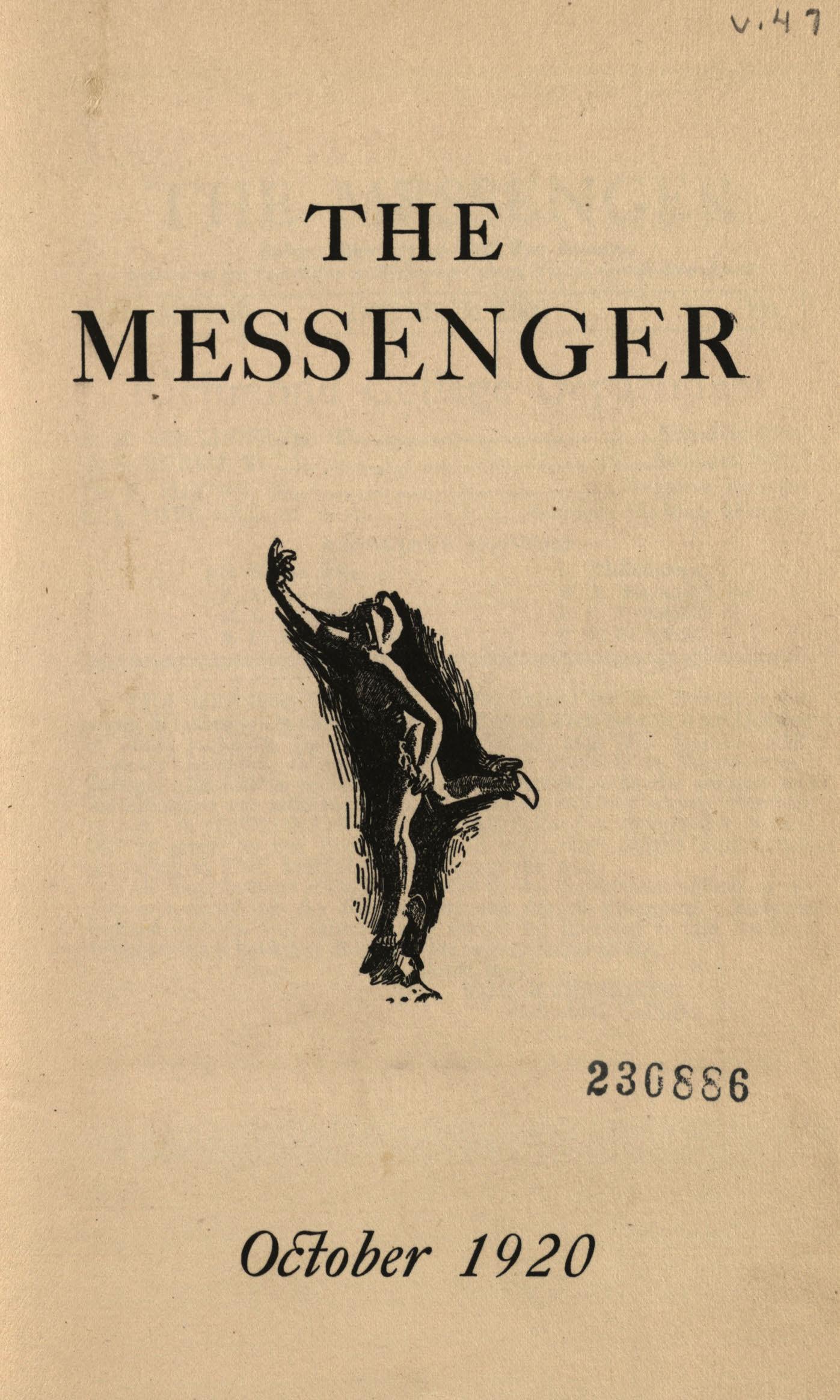

THE MESSENGER
THE MESSENGER
$9bnfJP.ti,op.Jfri.F~§!•99,,r A,p~~ EJJf~refl at t9t P.o.st Ofji.ce at ~icp~'?~d Col!e_g:e,Ya,, ~s s,e,c~d-cl~ss
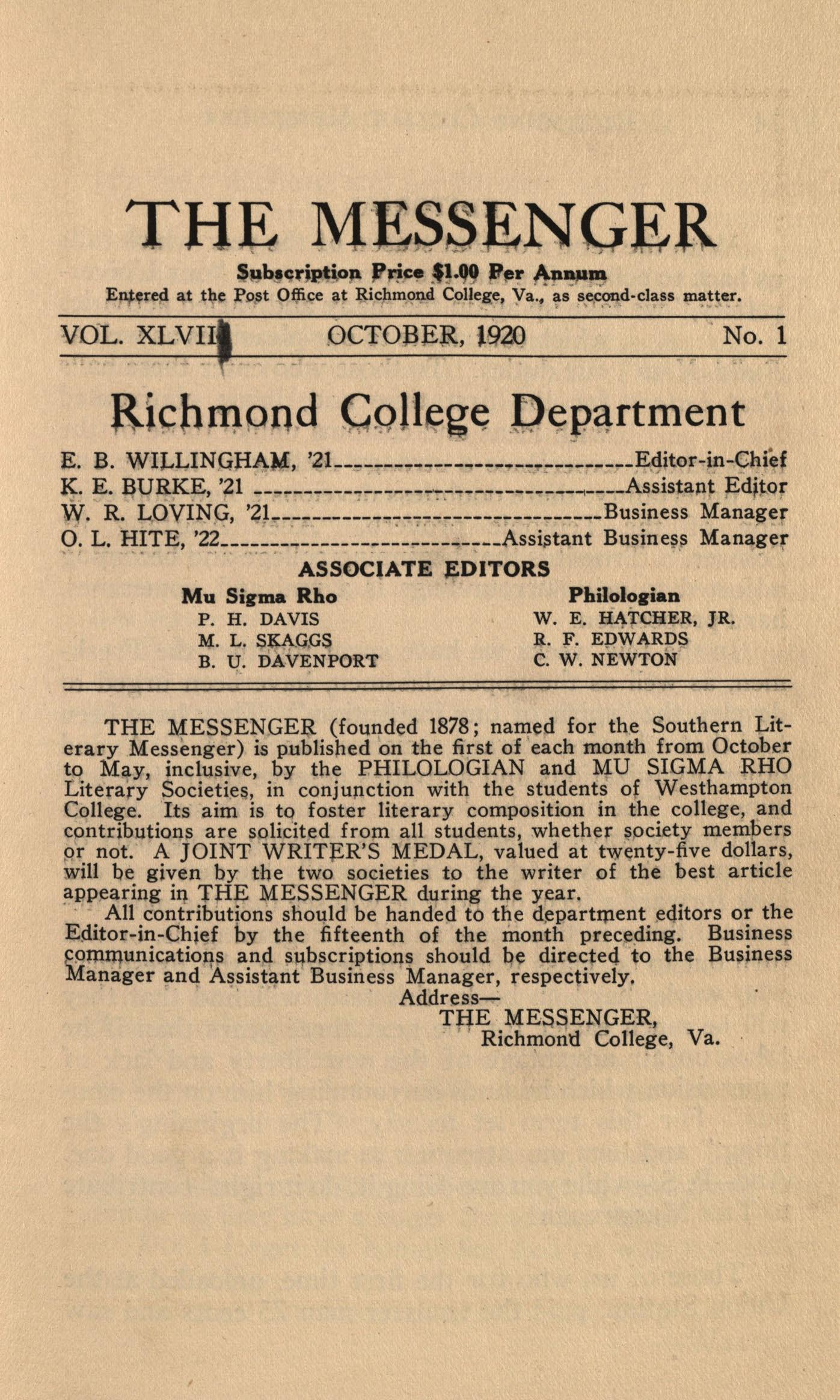
RiGhfl)pndCPU~~~P~pqrtment
E. B. WIJ.,I,IN~fi4M, '2l---e-
IHJ~KE, 'f 1
Vy. R. L,OVIN<:i, '?L---------------------------------Business ¥anager 9;L. ~~TE, '22~---::-:-~~-:----:-:--~~~~--~--:---Assi$tant Busine~,~ Manager
ASSOqATE ~DITORS
Mu Sigma Rho
P. H. DAVIS
M. L. S~'}G ,G~ B. U,:,DAV~NPORT
Philologian w. E. H,4.TCHER, JR. ~- f. EP.WAR))§ C. W. NEWTON
THE MESSENGER (founded 1878; nameµ for the Southern Literary Messenger) is p.ublis)led on the first of 'each month from October tq May, inclu~ive, by the P.HILOLOGIAN and }.fU SIGMA RHO Literary Societi e&, in conjuµction with the students of Westhampton College. lts aim is tQ foster literary ·composition in the college, and cpntrib.ution$ are soli,:ited from all students, :whethrr ~pciety member .s W not. A JOINT WRITJ<'.R'S MEDAL, valued at twi;;nty-five dollars, will be given by the two societies to the writer of the best article ~ppearing i11TfiE MESSENGER during the year.
· · All contributions shoqld be handed to tli.e departrpent eclitors or the Editor-in-Chief by the fifteenth of the month prece .ding. Businesi, fOl'JllftUnications anil $J1bscriptioq~ should be direcfe4 to the Bu~iness Manager ;mq Assist~nt Business Manager, 'respectively. · · · Adilress-
THE MES~ENGER, · '' Richmontl College, Va. ' .
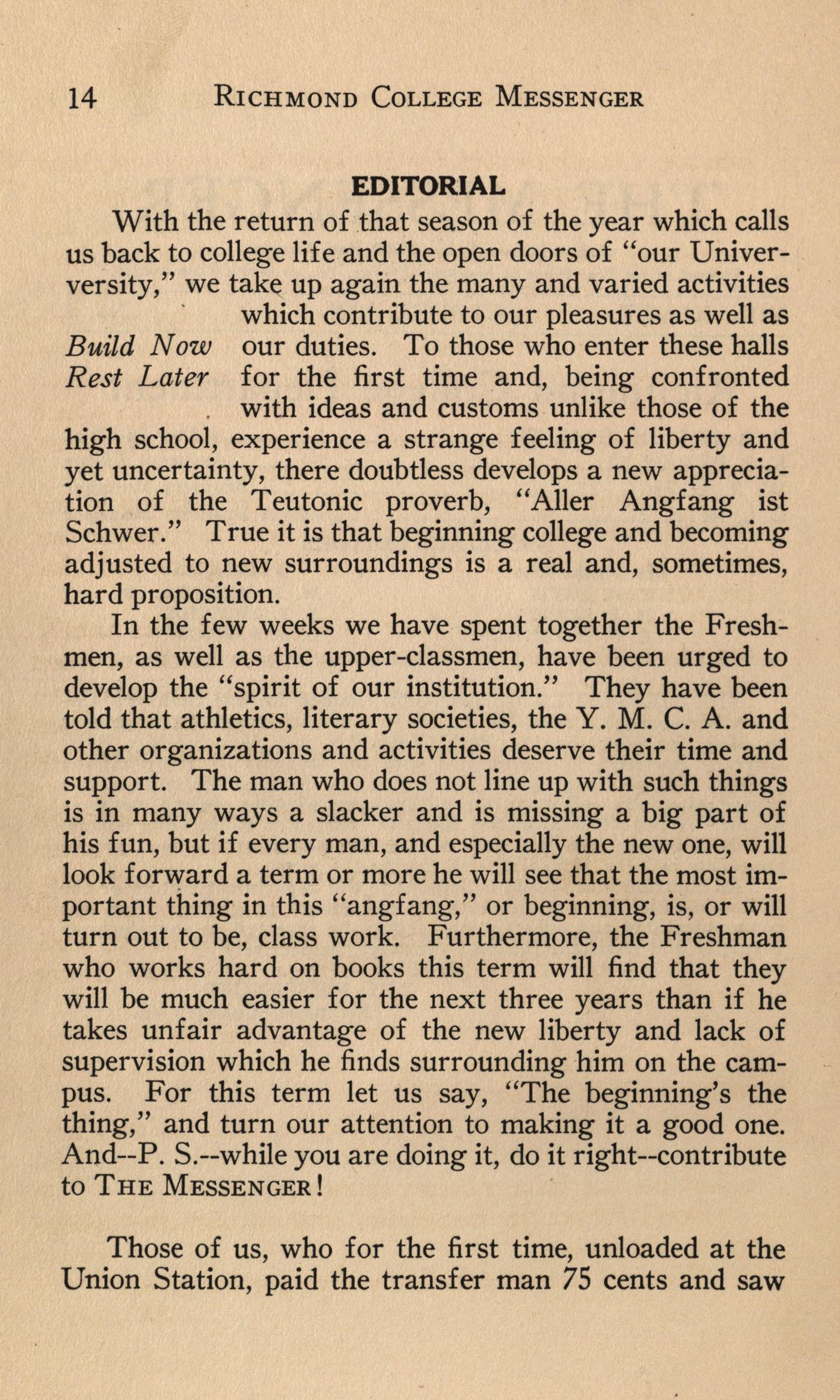
EDITORIAL
With the return of that season of the year which calls us back to college life and the open doors of "our Univerversity," we take up again the many and varied activities · which contribute to our pleasures as well as Build Now our duties. To those who enter these halls Rest Later for the first time and, being confronted . with ideas and customs unlike those of the high school, experience a strange feeling of liberty and yet uncertainty, there doubtless develops a new appreciation of the Teutonic proverb, "Aller Angfang ist Schwer." True it is that beginning college and becoming adjusted to new surroundings is a real and, sometimes, hard proposition.
In the few weeks we have spent together the Freshmen, as well as the upper-classmen, have been urged to develop the "spirit of our institution." They have been told that athletics, literary societies, the Y. M. C. A. and other organizations and activities deserve their time and support. The man who does not line up with such things is in many ways a slacker and is missing a big part of his fun, but if every man, and especially the new one, will look forward a term or more he will see that the most important thing in this "angfang," or beginning, is, or will turn out to be, class work. Furthermore, the Freshman who works hard on books this term will find that they will be much easier for the next three years than if he takes unfair advantage of the new liberty and lack of supervision which he finds surrounding him on the campus. For this term let us say, "The beginning's the thing," and turn our attention to making it a good one. And--P. S.--while you are doing it, do it right--contribute to THE MESSENGER!
Those of us, who for the first time, unloaded at the Union Station, paid the transfer man 75 cents and saw
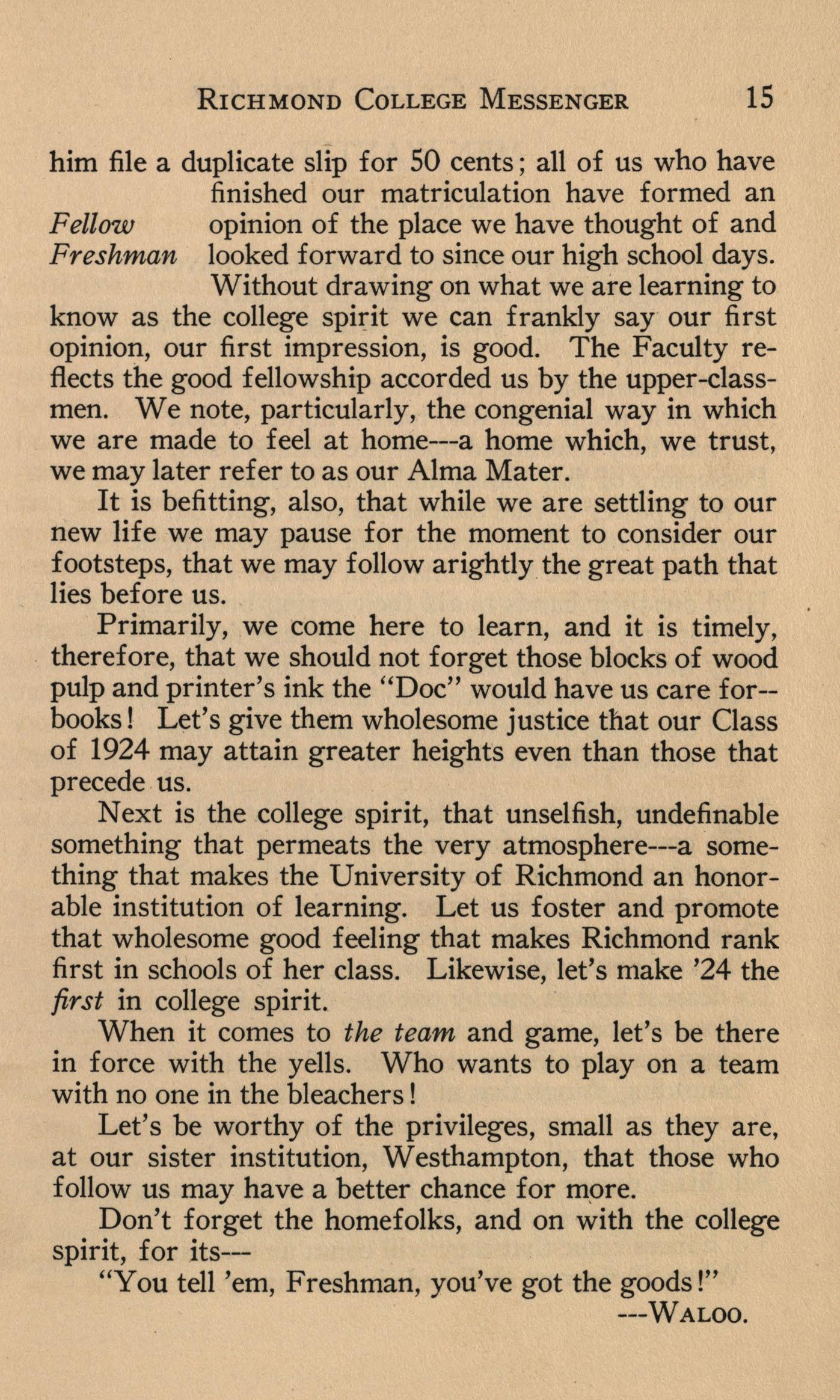
him file a duplicate slip for 50 cents; all of us who have finished our matriculation have formed an Fellow opinion of the place we have thought of and Freshman looked forward to since our high school days. Without drawing on what we are learning to know as the college spit_:itwe can frankly say our first opinion, our first impression, is good. The Faculty reflects the good fellowship accorded us by the upper-classmen. We note, particularly, the congenial way in which we are made to feel at home---a home which, we trust, we may later refer to as our Alma Mater.
It is befitting, also, that while we are settling to our new life we may pause for the moment to consider our footsteps, that we may follow arightly the great path that lies before us.
Primarily, we come here to learn, and it is timely, therefore, that we should not forget those blocks of wood pulp and printer's ink the "Doc" would have us care for-books I Let's give them wholesome justice that our Class of 1924 may attain greater heights even than those that precede us.
Next is the college spirit, that unselfish, undefinable something that permeats the very atmosphere---a something that makes the University of Richmond an honorable institution of learning. Let us foster and promote that wholesome good feeling that makes Richmond rank first in schools of her class. Likewise, let's make '24 the first in college spirit.
When it comes to the team and game, let's be there in force with the yells. Who wants to play on a team with no one in the bleachers !
Let's be worthy of the privileges, small as they are, at our sister institution, Westhampton, that those who follow us may have a better chance for mpre. Don't forget the homefolks, and on with the college spirit, for its--
"Y ou tell 'em, Freshman, you've got the goods!" ---WALOO.
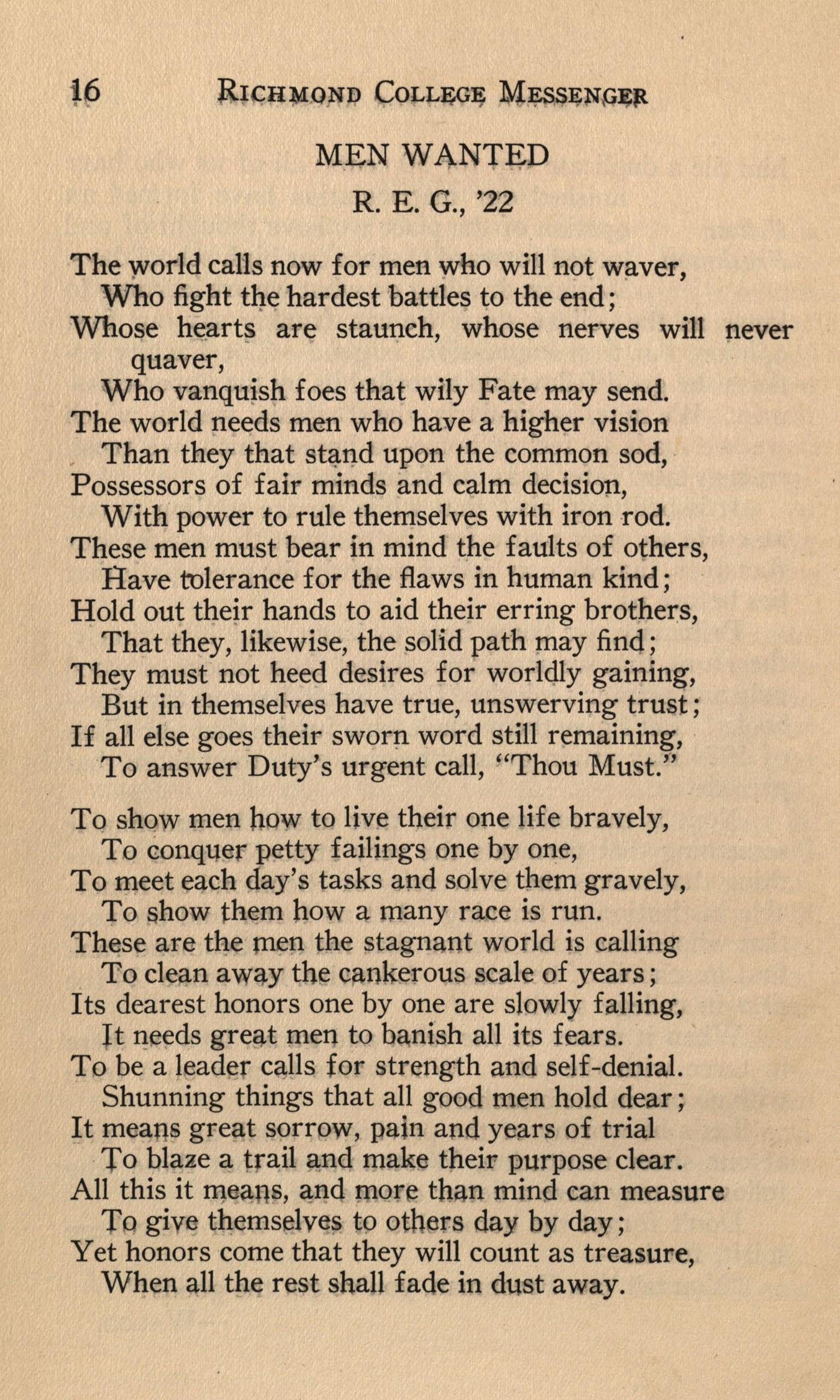
MEN W4.NTED
R. E.G., '22
The world calis now for men who will not waver, Who fight tl].ehardest battles to the end; Who~e he.art~ are stauneh, whose nerves will 11ever quaver, Who vanqujsµ foes that wily Fate may send. The world needs men who have a higher vision Than they that st~11-dupon the common sod, Possessors of fair minds and calm decision, With power to rule themselves with iron rod. These men must bear in mind the faults of others, Eave tolerance for the flaws in human kind; Hold out their hands to aid their erring brotheI'.s, That they, likewise, the solid path may find; They must not heed desires for worlq.ly gaining, But in themselves have true, unswerving trust; If all else goes their sworp. word still remaining, To answer Duty's urgent call, "Thou Must."
To shqw men how to live their one life bravely, To Gonq1.1-erpetty failings one by one, To meet each day's tasks and solve them gravely, To &howthem how a many race is run. These are the Jnen the stagnant world is calling To cle;i.naw<J.Ythe CFlnkerousscale of years; Its dearest honors one by one are slowly falling, Jt l!eeds gre<J.tµien to ba.nish all its fears. To be a leader ca,lls for strength and self-denial. Shunning things that all good men hold dear; It means great sorrow, pa.in and years of trial To blaze a trail and make their purpose clear. All this it 111eans,a,J!dmor~ th;:i.nmind can measure TP giyo themselves to oth~rs day by day; Yet honors come that they will count as treasure, When all the rest shall fade in dust away.
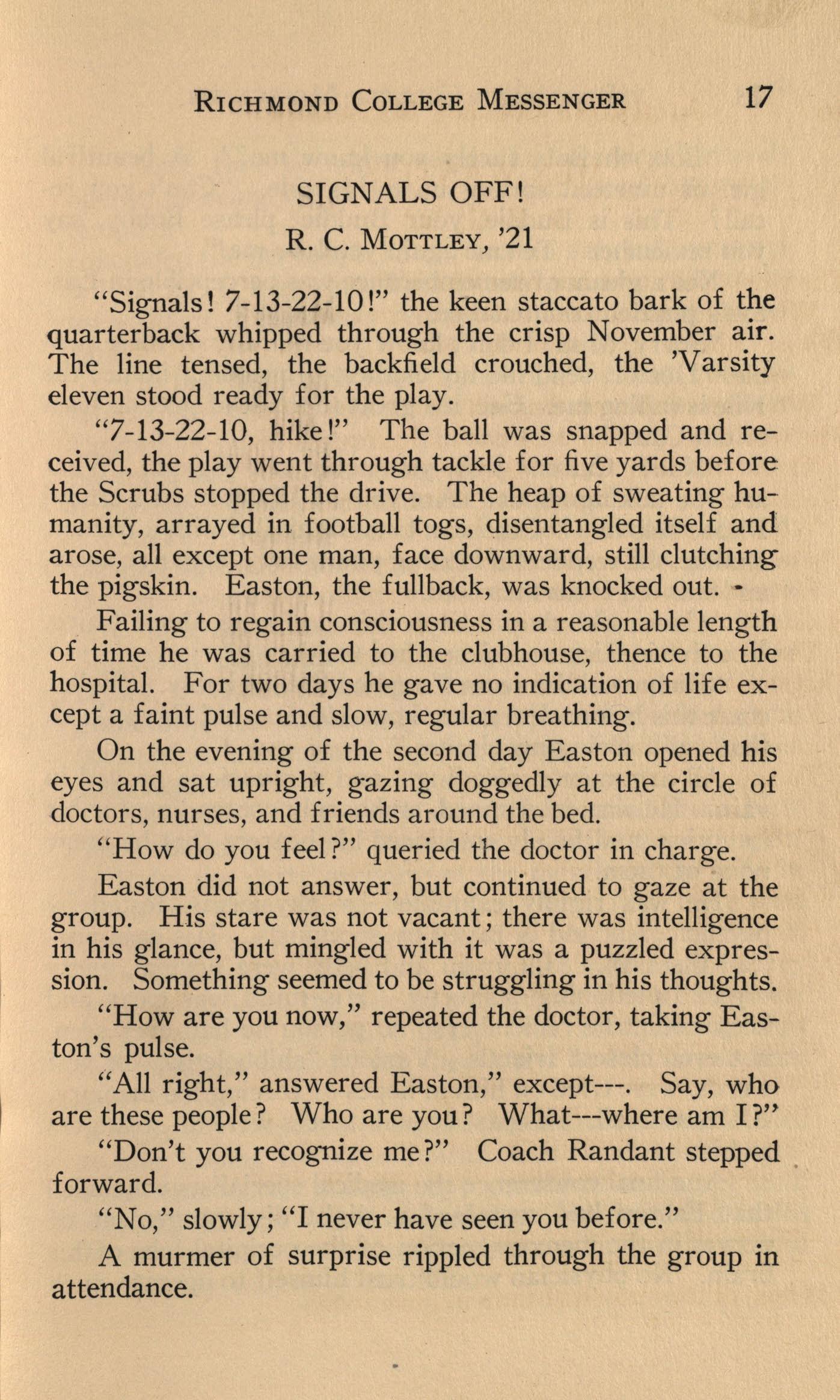
SIGNALS OFF!
R. C. MOTTLEY, '21
"Signals! 7-13-22-10 !" the keen staccato bark of the quarterback whipped through the crisp November air. The line tensed, the backfield crouched, the 'Varsity eleven stood ready for the play.
"7-13-22-10, hike!" The ball was snapped and received, the play went through tackle for five yards before the Scrubs stopped the drive. The heap of sweating humanity, arrayed in football togs, disentangled itself and arose, all except one man, face downward, still clutching the pigskin. Easton, the fullback, was knocked out. -
Failing to regain consciousness in a reasonable length of time he was carried to the clubhouse, thence to the hospital. For two days he gave no indication of life except a faint pulse and slow, regular breathing.
On the evening of the second day Easton opened his eyes and sat upright, gazing doggedly at the circle of doctors, nurses, and friends around the bed.
"How do you feel?" queried the doctor in charge.
Easton did not answer, but continued to gaze at the group. His stare was not vacant; there was intelligence in his glance, but mingled with it was a puzzled expression. Something seemed to be struggling in his thoughts.
"How are you now," repeated the doctor, taking Easton' s pulse.
"All right," answered Easton," except---. Say, who are these people? Who are you? What---where am I?"
"Don't you recognize me?" Coach Randant stepped forward.
"No," slowly; "I never have seen you before."
A murmer of surprise rippled through the group in attendance.
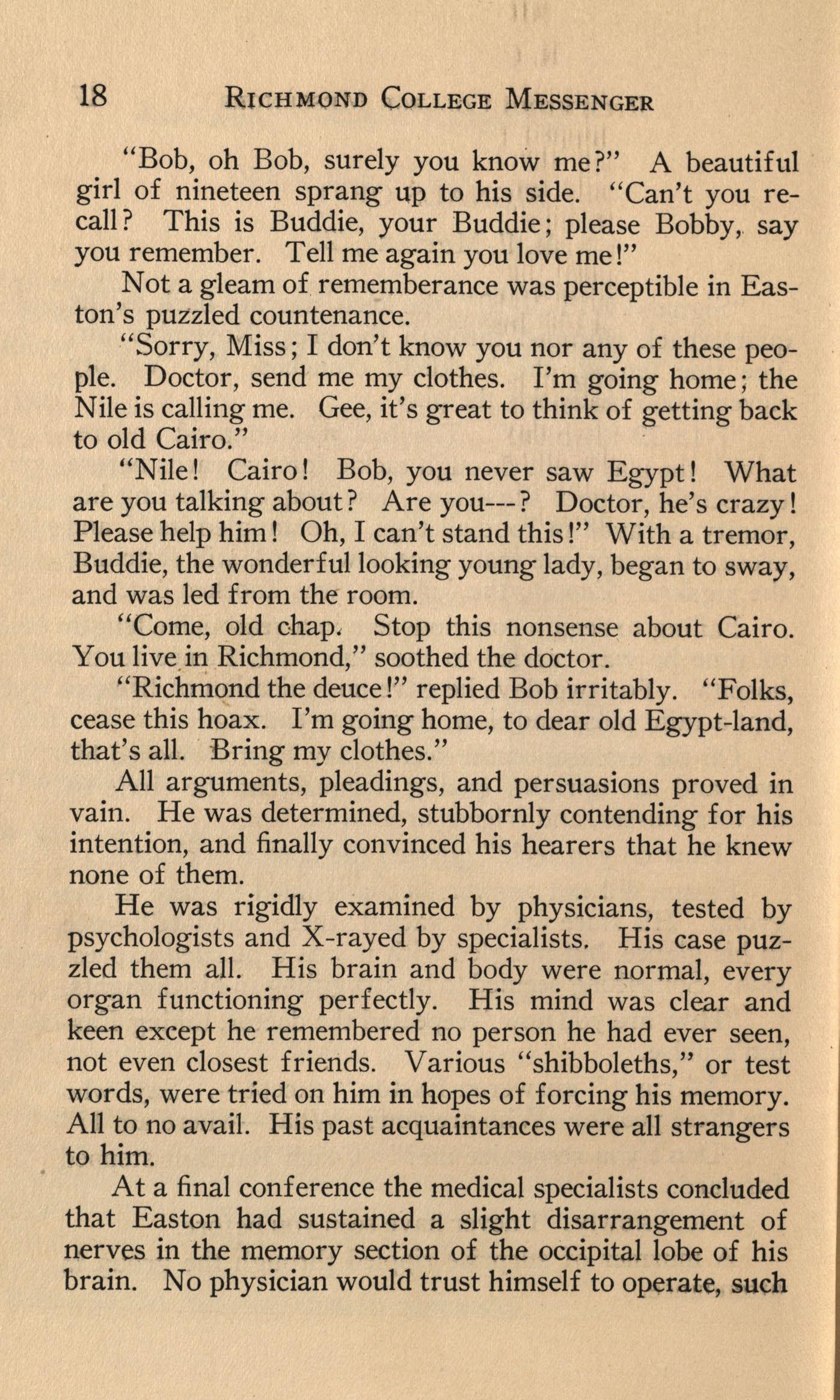
18 RICHMOND COLLEGE MESSENGER
"Bob, oh Bob, surely you know me?" A beautiful girl of nineteen sprang up to his side. " Can't you recall? This is Buddie, your Buddie; please Bobby,. say you remember. Tell me again you love me!"
Not a gleam of rememberance was perceptible in Easton's puzzled countenance.
"Sorry , Miss; I don't know you nor any of these people. Doctor , send me my clothes. I'm going home ; the Nile is calling me. Gee, it's great to think of getting back to old Cairo."
"Nile! Cairo! Bob, you never saw Egypt! What are you talking about? Are you - --? Doctor, he's crazy! Please help him! Oh, I can't stand this!" With a tremor, Buddie , the wonderful looking young lady, began to sway, and was led from the room.
"Come, old ohap , Stop this nonsense about Cairo. You live.in Richmond," soothed the doctor.
"Richmond the deuce!" replied Bob irritably. "Folks, cease this hoax. I'm going home, to dear old Egypt-land, that's all. Bring my clothes."
All arguments, pleadings , and persuasions proved in vain. He was determined, stubbornly contending for his intention , and finally convinced his hearers that he knew none of them.
He was rigidly examined by physicians, tested by psychologists and X-rayed by specialists. His case puzzled them all. His brain and body were normal, every organ functioning perfectly. His mind was clear and keen except he remembered no person he had ever seen, not even closest friends . Various "shibboleths," or test words, were tried on him in hopes of forcing his memory. All to no avail. His past acquaintances were all strangers to him.
At a final conference the medical specialists concluded that Easton had sustained a slight disarrangement of nerves in the memory section of the occipital lobe of his brain. No physician would trust himself to operate, such
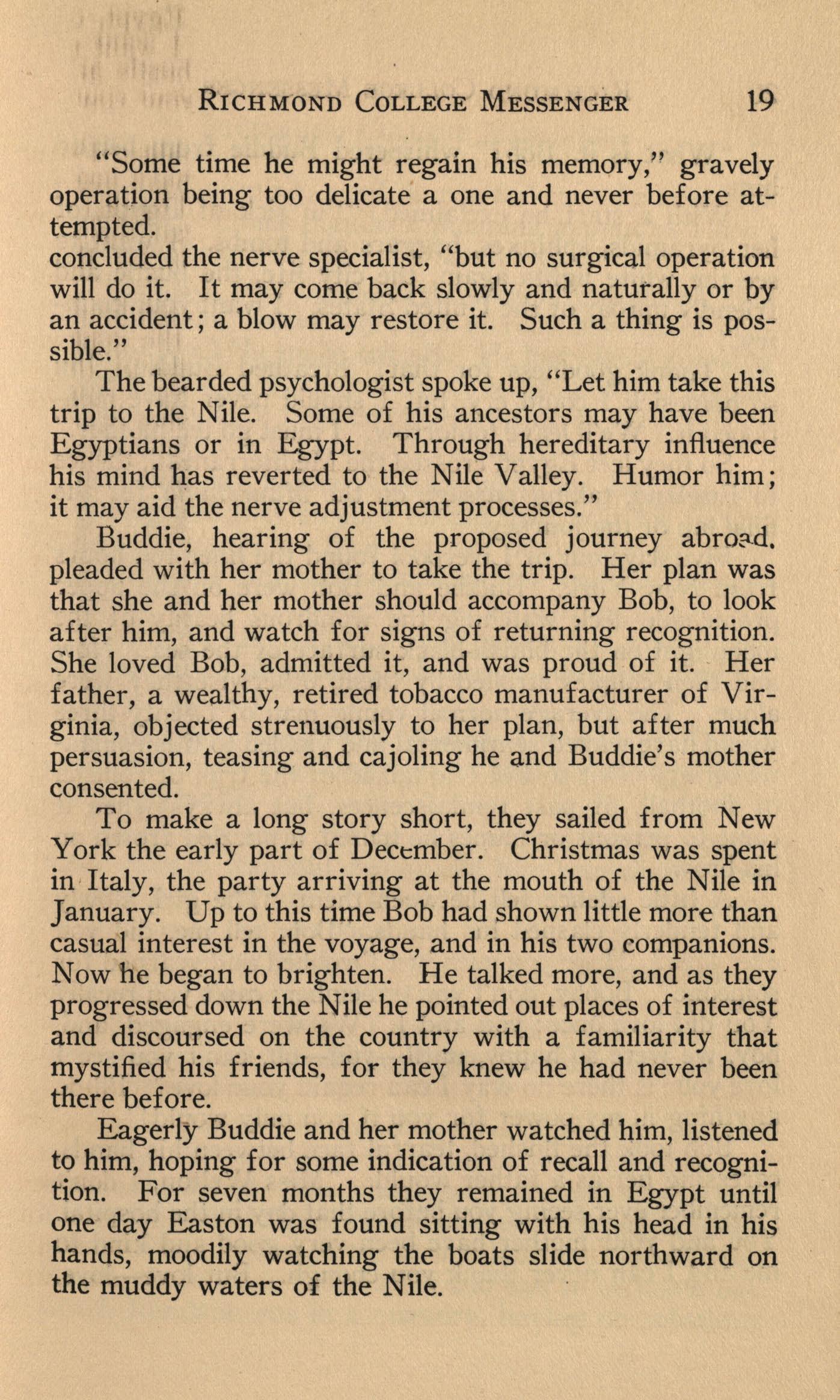
"Some time he might regain his memory/' gravely operation being too delicate a one and never before attempted.
concluded the nerve specialist, "but no surgical operation will do it. It may come back slowly and naturally or by an accident; a blow may restore it. Such a thing is possible."
The bearded psychologist spoke up, "Let him take this trip to the Nile. Some of his ancestors may have been Egyptians or in Egypt. Through hereditary influence his mind has reverted to the Nile Valley. Humor him; it may aid the nerve adjustment processes."
Buddie, hearing of the proposed journey abro~d. pleaded with her mother to take the trip. Her plan was that she and her mother should accompany Bob, to look after him, and watch for signs of returning recognition. She loved Bob, admitted it, and was proud of it. Her father, a wealthy, retired tobacco manufacturer of Virginia, objected strenuously to her plan, but after much persuasion, teasing and cajoling he and Buddie's mother consented.
To make a long story short, they sailed from New York the early part of Dectmber. Christmas was spent in Italy, the party arriving at the mouth of the Nile in January. Up to this time Bob had shown little more than casual interest in the voyage, and in his two companions. Now he began to brighten. He talked more, and as they progressed down the Nile he pointed out places of interest and discoursed on the country with a familiarity that mystified his friends, for they knew he had never been there before.
Eagerly Buddie and her mother watched him, listened to him, hoping for some indication of recall and recognition. For seven months they remained in Egypt until one day Easton was found sitting with his head in his hands, moodily watching the boats slide northward on the muddy waters of the Nile.
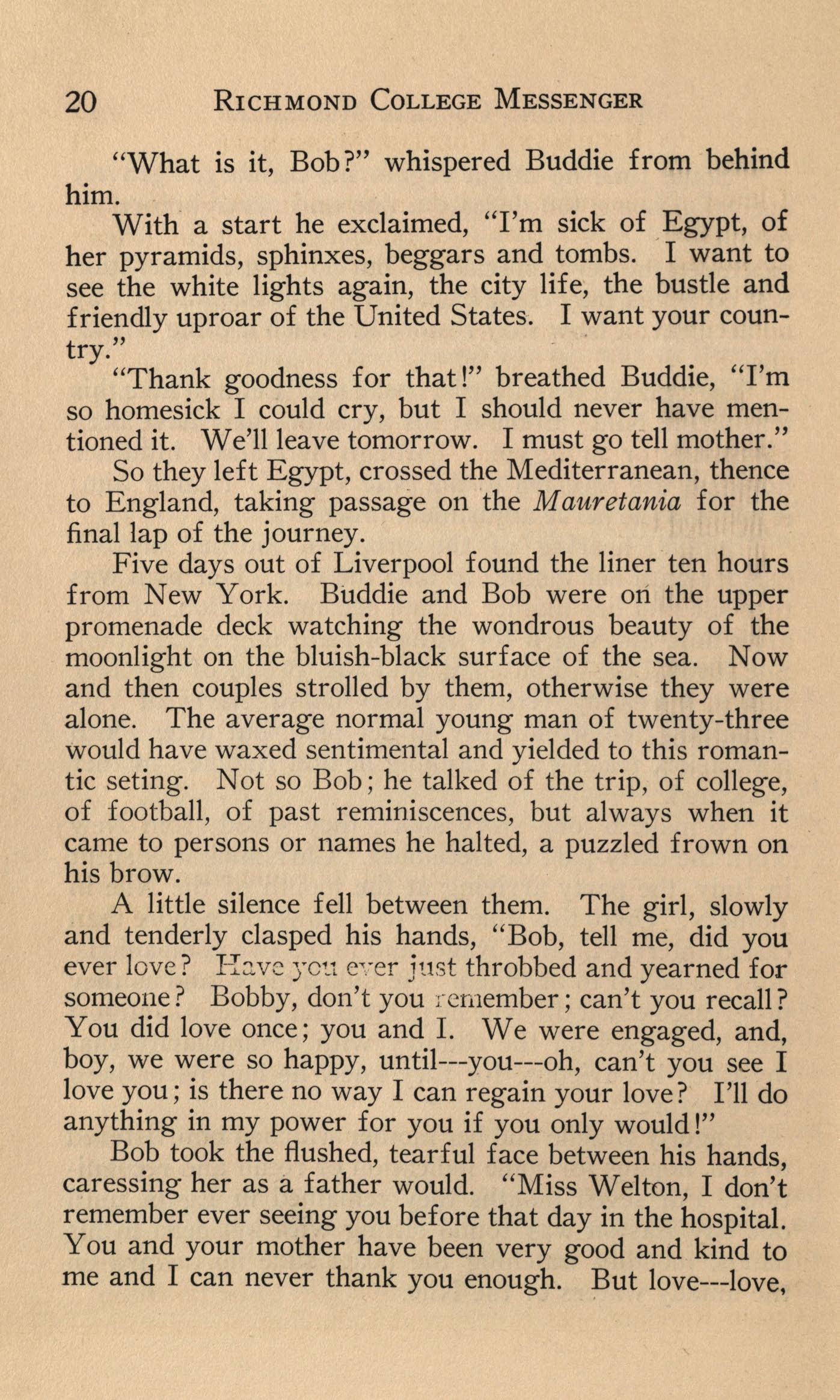
"What is it, Bob?" whispered Buddie from behind him.
With a start he exclaimed, "I'm sick of Egypt, of her pyramids, sphinxes, beggars and tombs. , I want to see the white lights again, the city life, the bustle and friendly uproar of the United States. I want your country."
"Thank goodness for that!" breathed Buddie, "I'm so homesick I could cry, but I should never have mentioned it. We'll leave tomorrow. I must go tell mother."
So they left Egypt, crossed the Mediterranean, thence to England, taking passage on the M auretania for the final lap of the journey.
Five days out of Liverpool found the liner ten hours from New York. Buddie and Bob were ori the upper promenade deck watching the wondrous beauty of the moonlight on the bluish-black surface of the sea. Now and then couples strolled by them, otherwise they were alone. The average normal young man of twenty-three would have waxed sentimental and yielded to this romantic seting. Not so Bob; he talked of the trip , of college, of football , of past reminiscences, but always when it came to persons or names he halted, a puzzled frown on his brow.
A little silence fell between them. The girl, slowly and tenderly clasped his hands, "Bob, tell me, did you ever love ? H :::.vcyc1...1 e :er just throbbed and yearned for someone? Bobby, don't you r emember; can't you recall? You did love once; you and I. We were engaged, and, boy, we were so happy, until---you---oh, can't you see I love you; is there no way I can regain your love? I'll do anything in my power for you if you only would!"
Bob took the flushed, tearful face between his hands, caressing her as a father would. "Miss Welton, I don't remember ever seeing you before that day in the hospital. You and your mother have been very good and kind to me and I can never thank you enough. ~ut love---love,
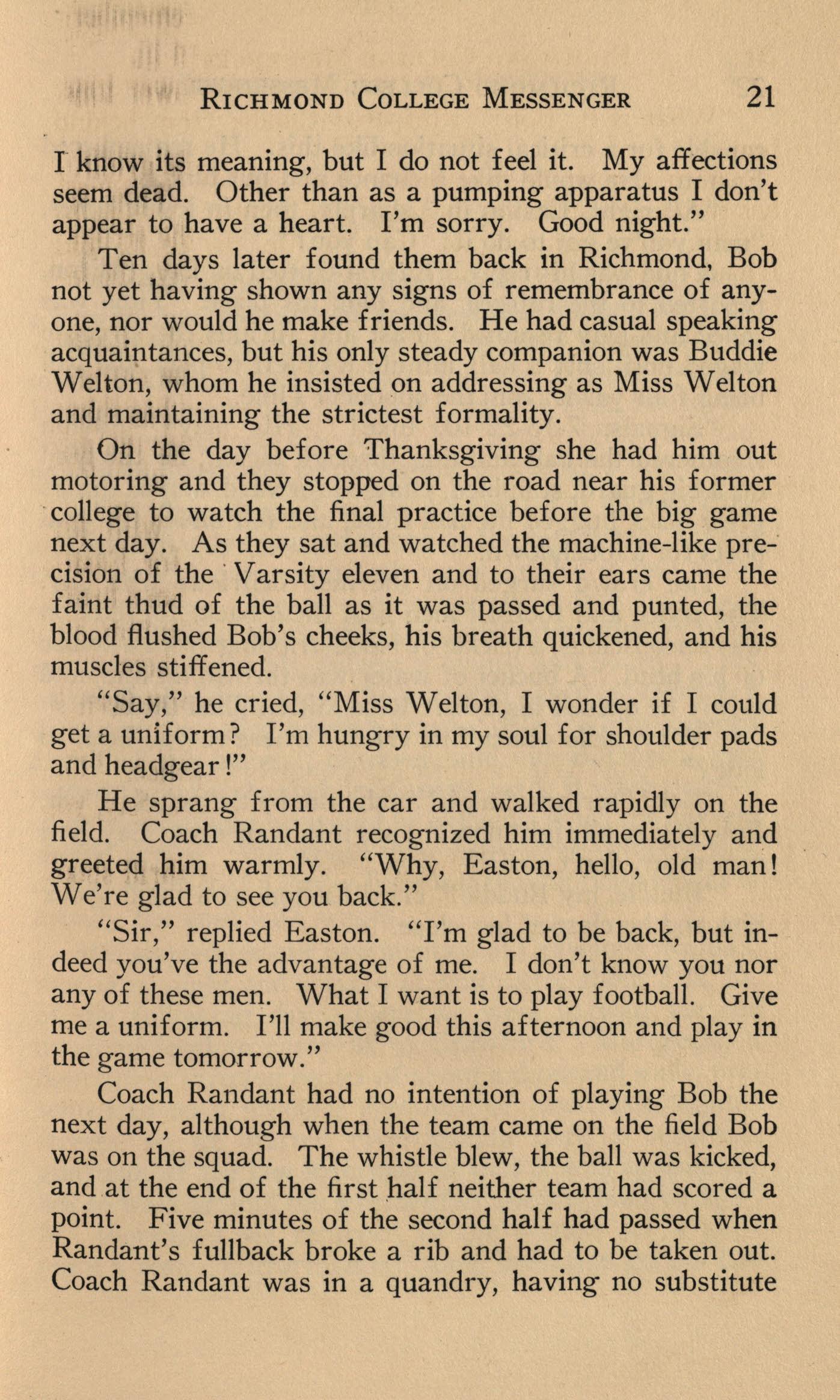
I know its meaning, but I do not feel it. My affections seem dead. Other than as a pumping apparatus I don't appear to have a heart. I'm sorry. Good night."
Ten days later found them back in Richmond, Bob not yet having shown any signs of remembrance of anyone, nor would he make friends. He had casual speaking acquaintances, but his only steady companion was Buddie Welton, whom he insisted on addressing as Miss Welton and maintaining the strictest formality.
On the day before Thanksgiving she had him out motoring and they stopped on the road near his former ·college to watch the final practice before the big game next day. As they sat and watched the machine-like precision of the · Varsity eleven and to their ears came the faint thud of the ball as it was passed and punted, the blood flushed Bob's cheeks, his breath quickened, and his muscles stiffened.
"Say," he cried, "Miss Welton, I wonder if I could get a uniform? I'm hungry in my soul for shoulder pads and headgear !"
He sprang from the car and walked rapidly on the field. Coach Randant recognized him immediately and greeted him warmly. "Why, Easton, hello, old man! We' re glad to see you back."
"Sir," replied Easton. "I'm glad to be back, but indeed you've the advantage of me. I don't know you nor any of these men. What I want is to play football. Give me a uniform. I'll make good this afternoon and play in the game tomorrow."
Coach Randant had no intention of playing Bob the next day, although when the team came on the field Bob was on the squad. The whistle blew, the ball was kicked, and at the end of the first .half neither team had scored a point. Five minutes of the second half had passed when Randant's fullback broke a rib and had to be taken out. Coach Randant was in a quandry, having no substitute
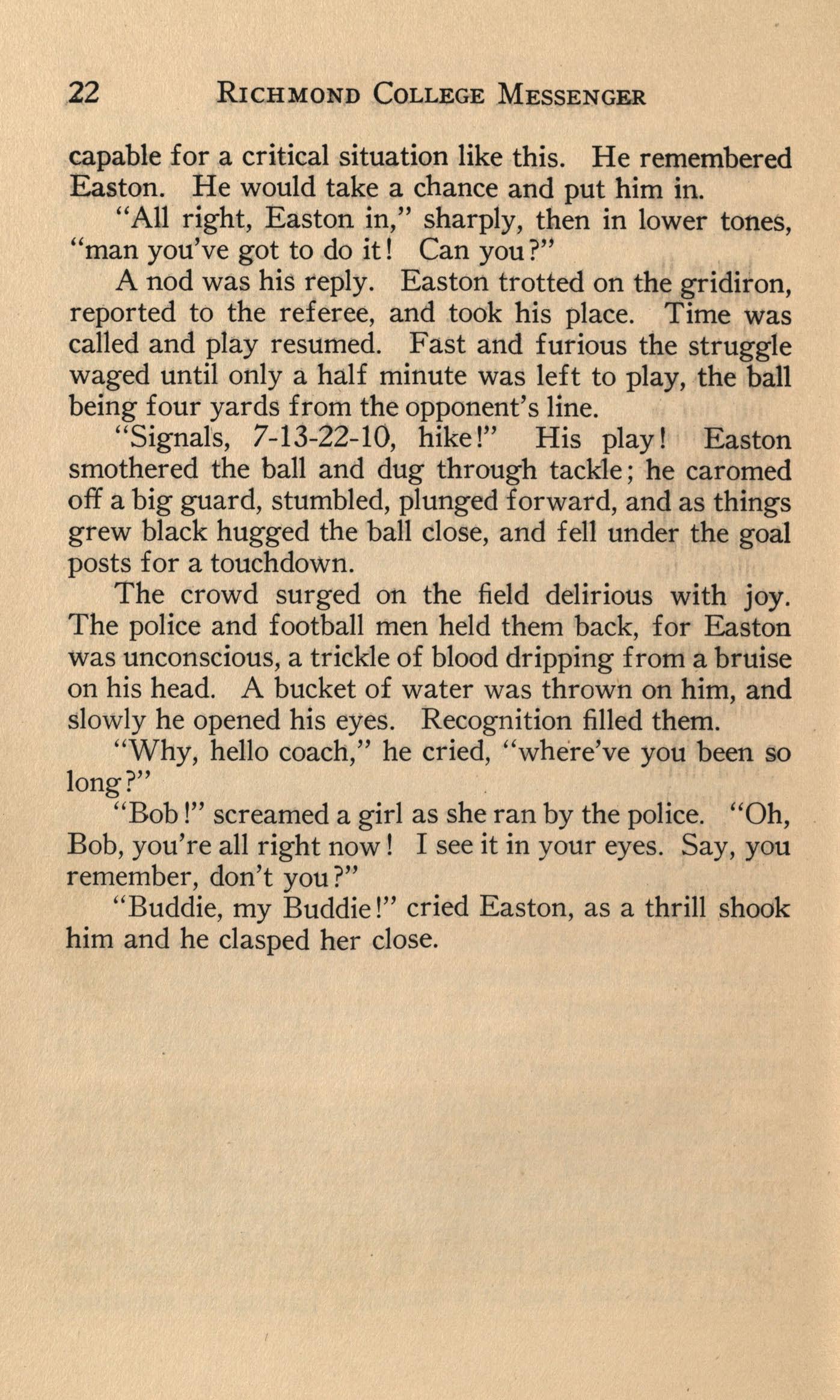
capable for a critical situation like this. He remembered Easton. He would take a chance and put him in.
"All right, Easton in," sharply, then in lower tones, "man you've got to do it! Can you?''
A nod was his reply. Eastort trotted on the gridiron, reported to the rderee, and took his place. Time was called and play resumed. Fast and furious the struggle waged until only a h,:i.lfminute was left to play, the ball being four yards from the opponent's line.
"Signal 's, 7-13-22-10, hike!" His play! Easton smothered the ball and dug through tackle; he caromed off a big guard, stumbled, plunged forward, and as things grew black hugged the ball close, and fell under the goal posts for a touchdown.
The crowd surged on the field delirious with joy. The police and football men held them back, for Easton was unconscious, a trickle of blood dripping from bruise on his head. A bucket of water was thrown on him, and slowly he opened his eyes. Recognition filled them.
"Why, hello coach," he cried, "where've you been so long?"
"Bob!" screamed a girl as she ran by the police. "Oh, Bob, you're all right now! I see it in your eyes. Say, you remember, don't you?"
"Buddie, my Buddie!" cried Easton, as a thrill shook him and he clasped her close.
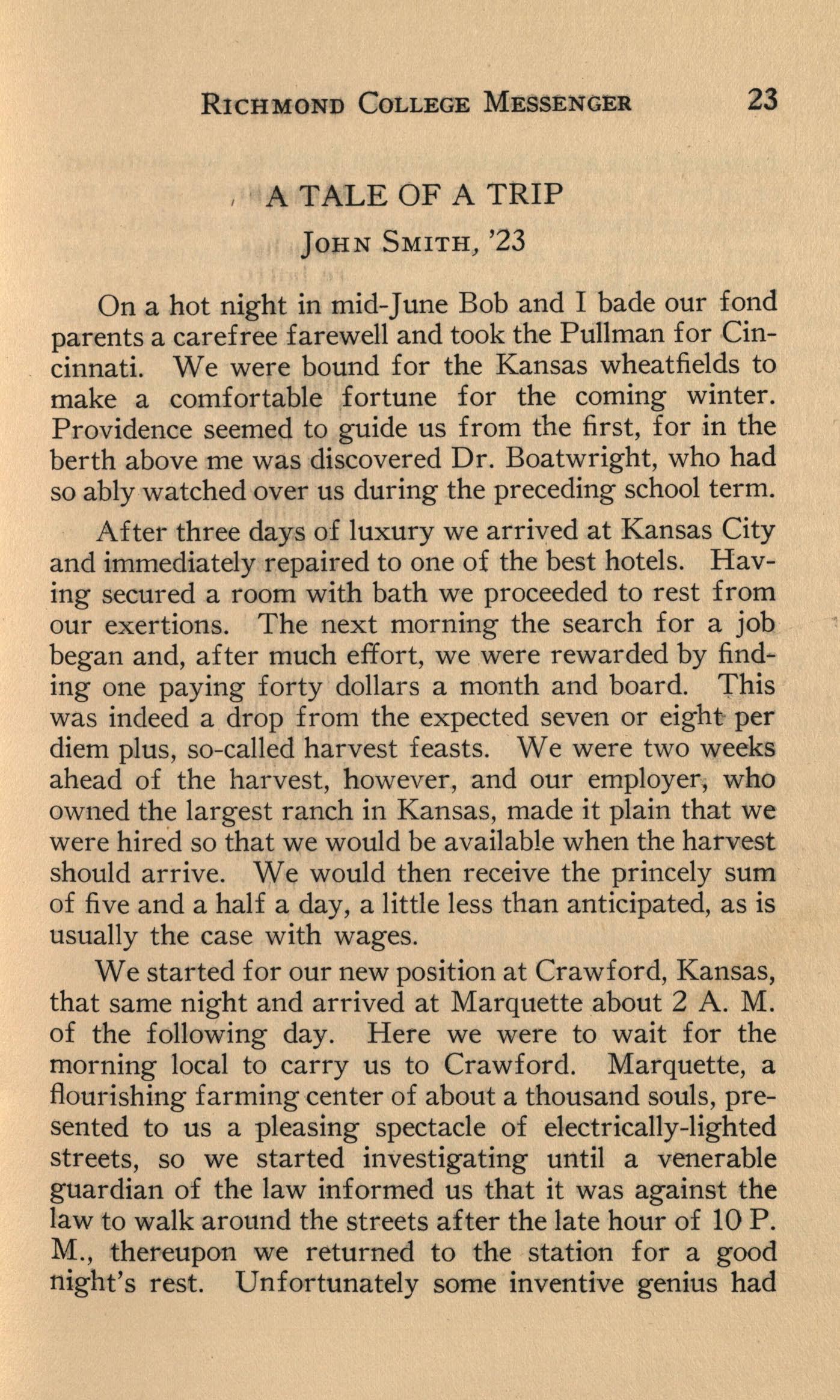
I ' A TALE OF A TRIP JOHN SMITH, '23
On a hot night in mid-June Bob and I bade our fond parents a carefree farewell and took the Pullman for Cincinnati. We were bound for the Kansas wheatfields to make a comfortable fortune for the corning winter. Providence seemed to guide us from the first, for in the berth above me was discovered Dr. Boatwright, who had so ably watched over us during the preceding school term.
After three days of luxury we arrived at Kansas City and immediately repaired to one of the best hotels. Having secured a room with bath we proceeded to rest from our exertions. The next morning the search for a job began and, after much effort, we were rewarded by find~ ing one paying forty dollars a month and board. This was indeed a drop from the expected seven or eight- per diem plus, so-called harvest feasts. We were two weeks ahead of the harvest, however, and our employer ; who owned the largest ranch in Kansas, made it plain that we were hired so that we would be available when the harvest should arrive. We would then receive the princely sum of five and a half a day, a little less than anticipated, as is usually the case with wages.
We started for our new position at Crawford, Kansas, that same night and arrived at Marquette about 2 A. M. of the following day. Here we were to wait for the morning local to carry us to Crawford. Marquette, a flourishing farming center of about a thousand souls, presented to us a pleasing spectacle of electrically-lighted streets, so we started investigating urttil a venerable guardian of the law informed us that it was against the law to walk around the streets after the late hour of 10 P. M., thereupon we returned to the station for a good night's rest. Unfortunately some inventive genius had
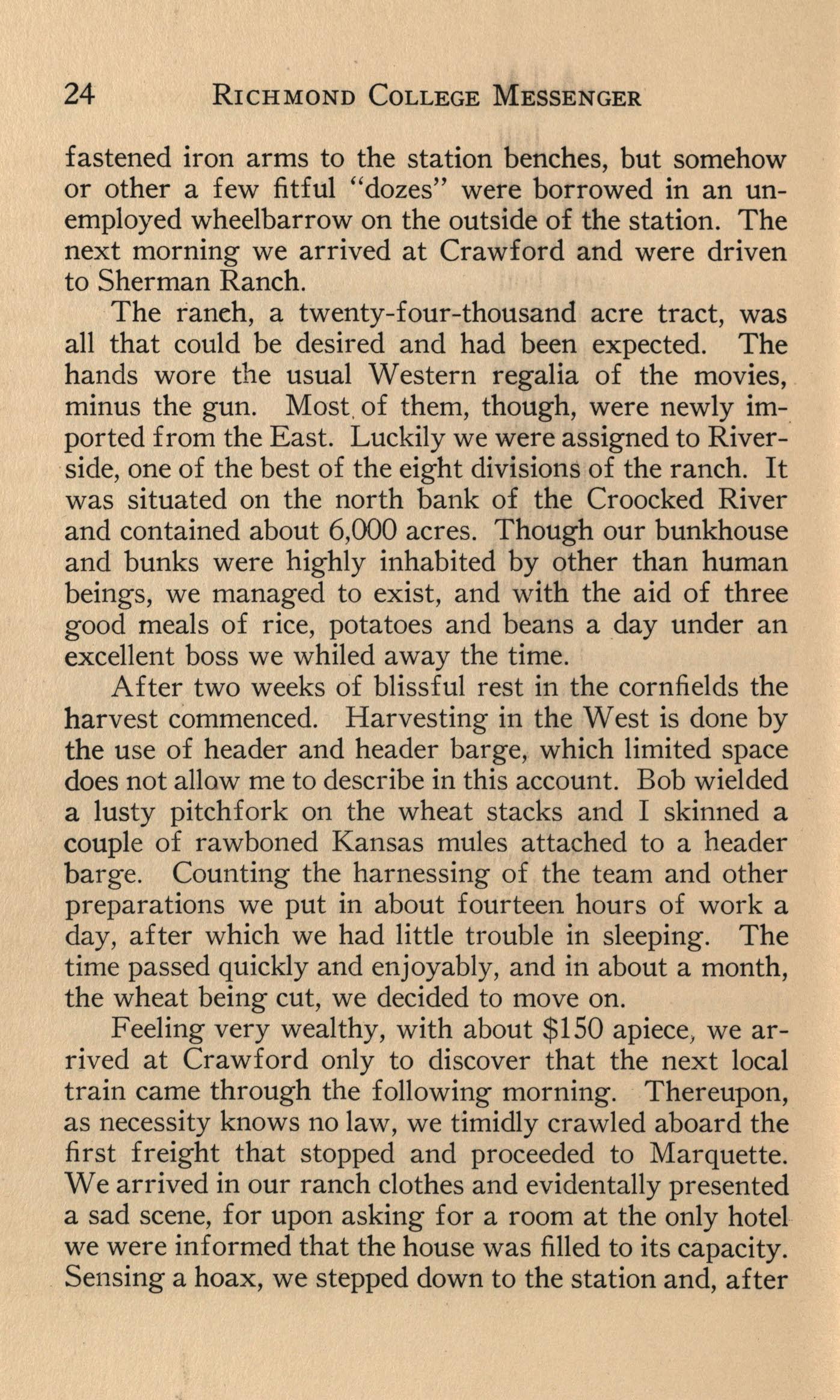
fastened iron arms to the station benches, but somehow or other a few fitful "dozes" were borrowed in an unemployed wheelbarrow on the outside of the station. The next morning we arrived at Crawford and were driven to Sherman Ranch.
The raneh, a twenty-four-thousand acre tract, was all that could be desired and had been expected. The hands wore the usual Wes tern regalia of the movies, minus the gun. Most . of them, though, were newly imported from the East. Luckily we were assigned to Riverside, one of the best of the eight divisions of the ranch. It was situated on the north bank of the Croocked River and contained about 6,000 acres. Though our bunkhouse and bunks were highly inhabited by other than human beings, we managed to exist, and with the aid of three good meals of rice, potatoes and beans a day under an excellent boss we whiled away the time.
After two weeks of blissful rest in the cornfields the harvest commenced. Harvesting in the West is done by the use of header and header barge, which limited space does not allow me to describe in this account. Bob wielded a lusty pitchfork on the wheat stacks and I skinned a couple of rawboned Kansas mules attached to a header barge. Counting the harnessing of the team and other preparations we put in about fourteen hours of work a day, after which we had little trouble in sleeping. The time passed quickly and enjoyably, and in about a month, the wheat being cut, we decided to move on.
Feeling very wealthy, with about $150 apiece ; wearrived at Crawford only to discover that the next local train came through the following morning. Thereupon, as necessity knows no law, we timidly crawled aboard the first freight that stopped and proceeded to Marquette. We arrived in our ranch clothes and evidentally presented a sad scene, for upon asking for a room at the only hotel we were informed that the house was filled to its capacity. Sensing a hoax, we stepped down to the station and, after
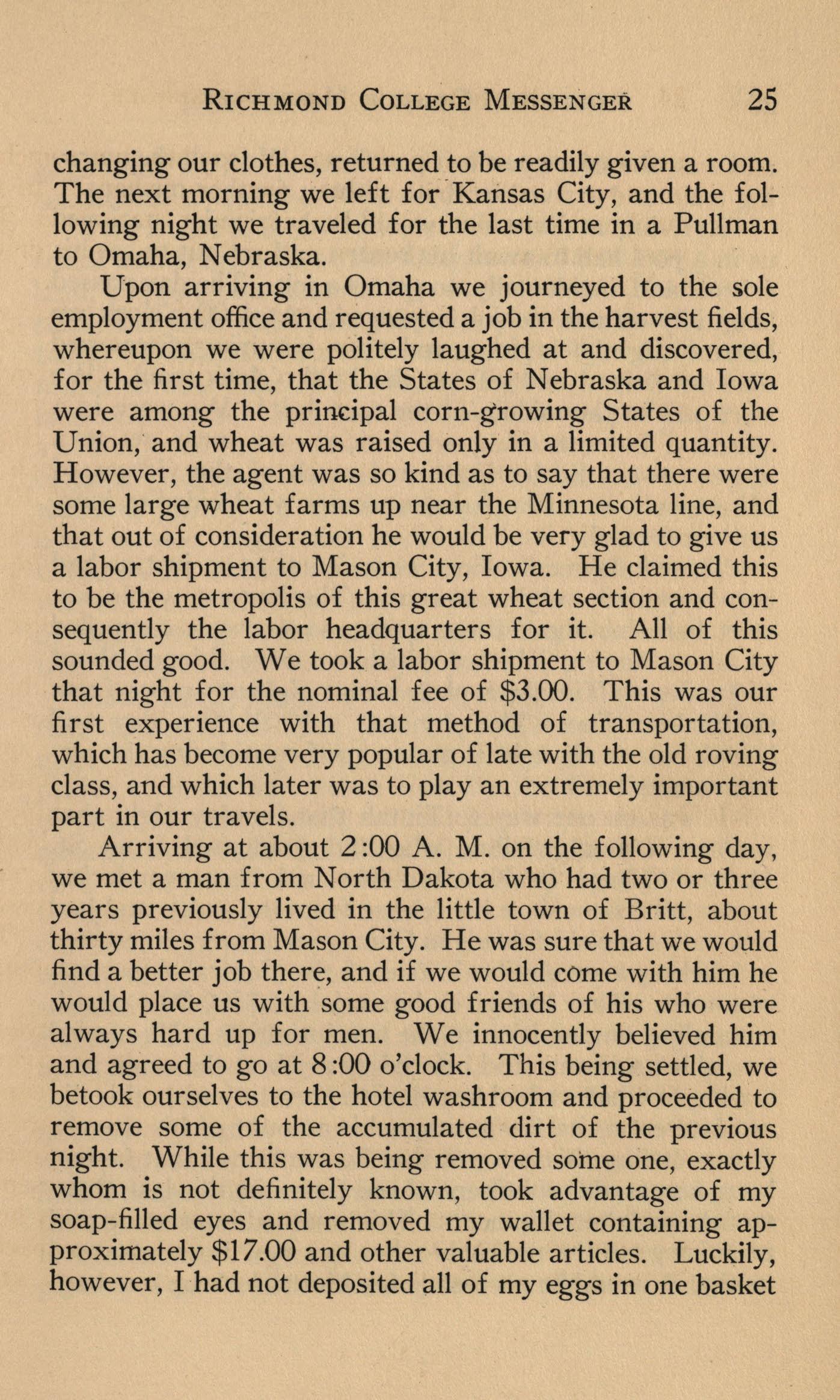
changing our clothes, returned to be readily given a room. The next morning we left for ·Kansas City, and the following night we traveled for the last time in a Pullman to Omaha, Nebraska.
Upon arriving in Omaha we journeyed to the sole employment office and requested a job in the harvest fields, whereupon we were politely laughed at and discovered, for the first time, that the States of Nebraska and Iowa were among the principal corn-growing States of the Union, and wheat was raised only in a limited quantity. However, the agent was so kind as to say that there were some large wheat farms up near the Minnesota line, and that out of consideration he would be very glad to give us a labor shipment to Mason City, Iowa. He claimed this to be the metropolis of this great wheat section and consequently the labor headquarters for it. All of this sounded good. We took a labor shipment to Mason City that night for the nominal fee of $3.00. This was our first experience with that method of transportation, which has become very popular of late with the old roving class, and which later was to play an extremely important part in our travels.
Arriving at about 2 :00 A. M. on the following day, we met a man from North Dakota who had two or three years previously lived in the little town of Britt, about thirty miles from Mason City. He was sure that we would find a better job there, and if we would come with him he would place us with some good friends of his who were always hard up for men. We innocently believed him and agreed to go at 8 :00 o'clock. This being settled, we betook ourselves to the hotel washroom and proceeded to remove some of the accumulated dirt of the previous night. While this was being removed so'me one, exactly whom is not definitely known, took advantage of my soap-filled eyes and removed my wallet containing approximately $17.00 and other valuable articles. Luckily, however, I had not deposited all of my eggs in one basket
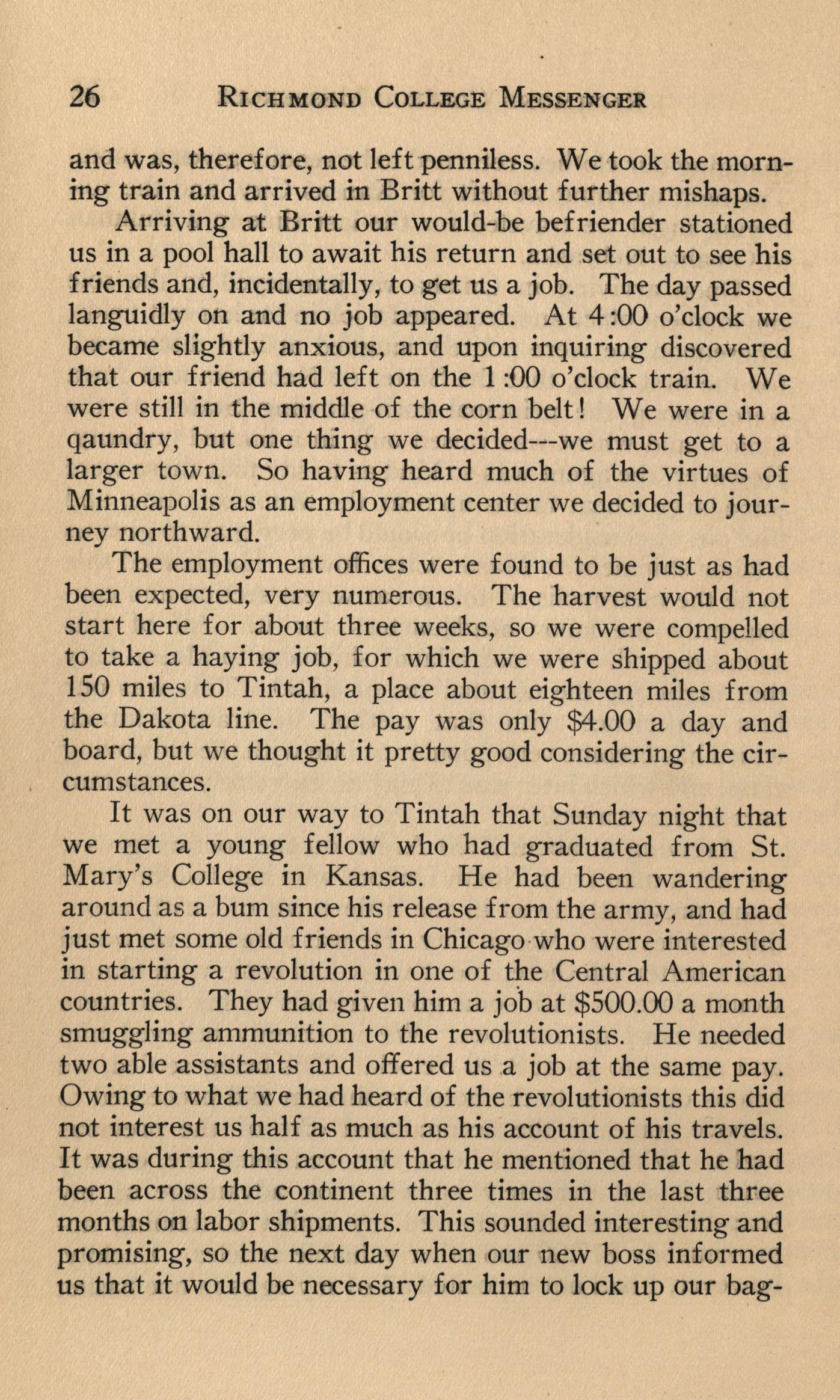
and was, therefore, not left penniless. We took the morning train and arrived in Britt without further mishaps. Arriving at Britt our would-be befriender stationed us in a pool hall to await his return and set out to see his friends and, incidentally, to get us a job. The day passed languidly oil and no job appeared. At 4 :00 o'clock we became slightly anxious, and upon inquiring discovered that our friend had left on the 1 :00 o'clock train. We were still in the middle of the corn belt! We were in a qaundry, but one thing we decided---we must get to a larger town. So having heard much of the virtues of Minneapolis as an employment center we decided to journey northward.
The employment offices were found to be just as had been expected, very numerous. The harvest would not start here for about three weeks, so we were compelled to take a haying job, for which we were shipped about 150 miles to Tintah, a place about eighteen miles from the Dakota line. The pay was only $4.00 a day and board, but we thought it pretty good considering the circumstances.
It was on our way to Tintah that Sunday night that we met a young fellow who had graduated from St. Mary's College in Kansas. He had been wandering around as a bum since his release from the army, and had just met some old friends in Chicago -who were interested in starting a revolution in one of the Central American countries. They had given him a job at $500.00 a month smuggling ammunition to the revolutionists. He needed two able assistants and offered us a job at the same pay. Owing to what we had heard of the revolutionists this did not interest us half as much as his account of his travels. It was during this account that he mentioned that he had been across the continent three times in the last three months on labor shipments. This sounded interesting and promising, so the next day when our new boss informed us that it would be necessary for him to lock up our bag-
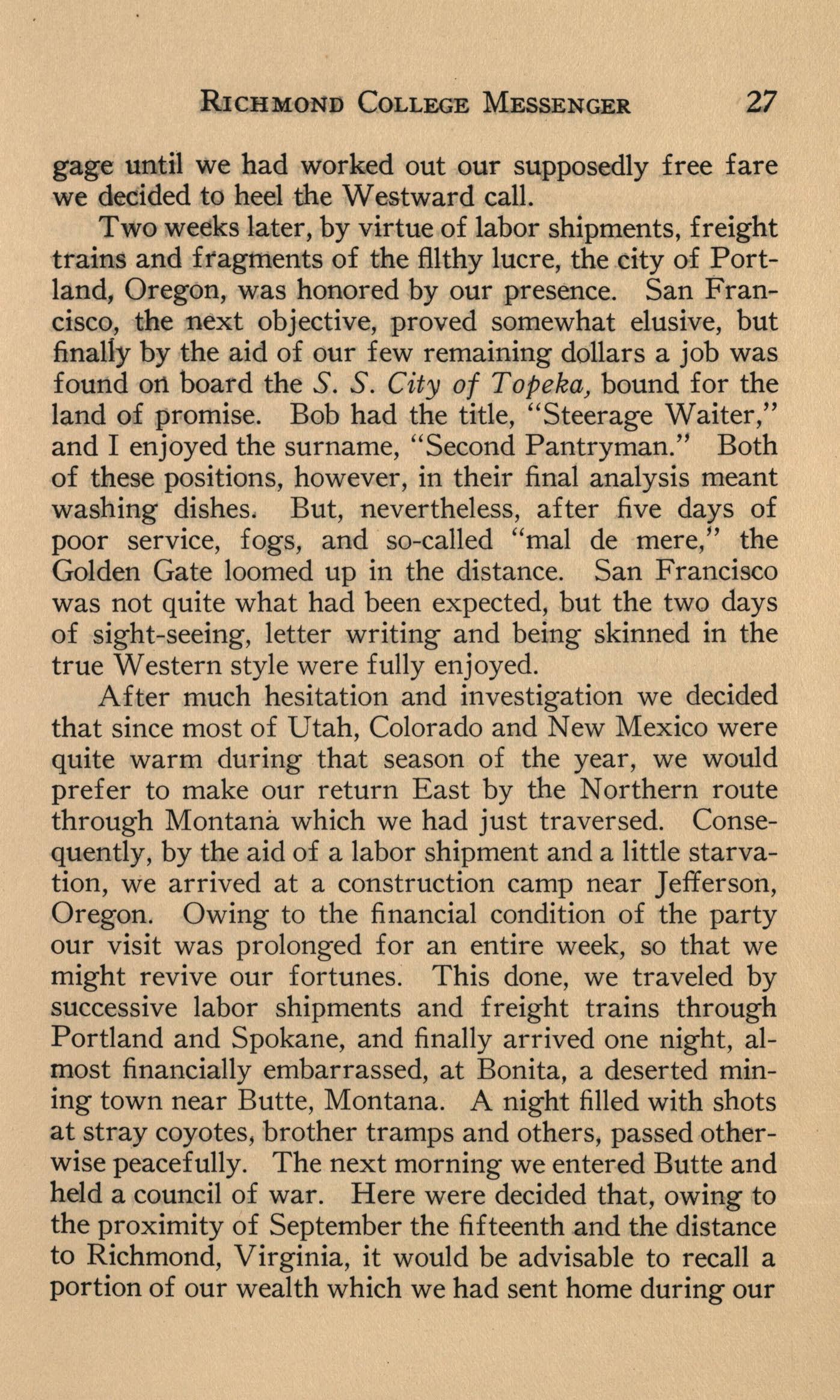
gage until we had worked out our supposedly free fare we decided to heel the Westward call.
Two weeks later, by virtue of labor shipments, freight trains and fragments of the filthy lucre, the city of Portland, Oregon, was honored by our presence. San Francisco, the next objective, proved somewhat elusive, but finally by the aid of our few remaining dollars a job was found ort board the S. S. City of Topeka, bound for the land of promise. Bob had the title, "Steerage Waiter," and I enjoyed the surname, "Second Pantryman.'' Both of these positions, however, in their final analysis meant washing dishes. But, nevertheless, after five days of poor service, fogs, and so-called "mal de mere,'' the Golden Gate loomed up in the distance. San Francisco was not quite what had been expected, but the two days of sight-seeing, letter writing and being skinned in the true Western style were fully enjoyed.
After much hesitation and investigation we decided that since most of Utah, Colorado and New Mexico were quite warm during that season of the year, we would pref er to make our return East by the Northern route through Montana which we had just traversed. Consequently, by the aid of a labor shipment and a little starvation, we arrived at a construction camp near Jefferson, Oregon. Owing to the financial condition of the party our visit was prolonged for an entire week, so that we might revive our fortunes. This done, we traveled by successive labor shipments and freight trains through Portland and Spokane, and finally arrived one night, almost financially embarrassed, at Bonita, a deserted mining town near Butte, Montana. A night filled with shots at stray coyotes, brother tramps and others, passed otherwise peacefully . The next morning we entered Butte and held a council of war. Here were decided that, owing to the proximity of September the fifteenth and the distance to Richmond, Virginia, it would be advisable to recall a portion of our wealth which we had sent home during our
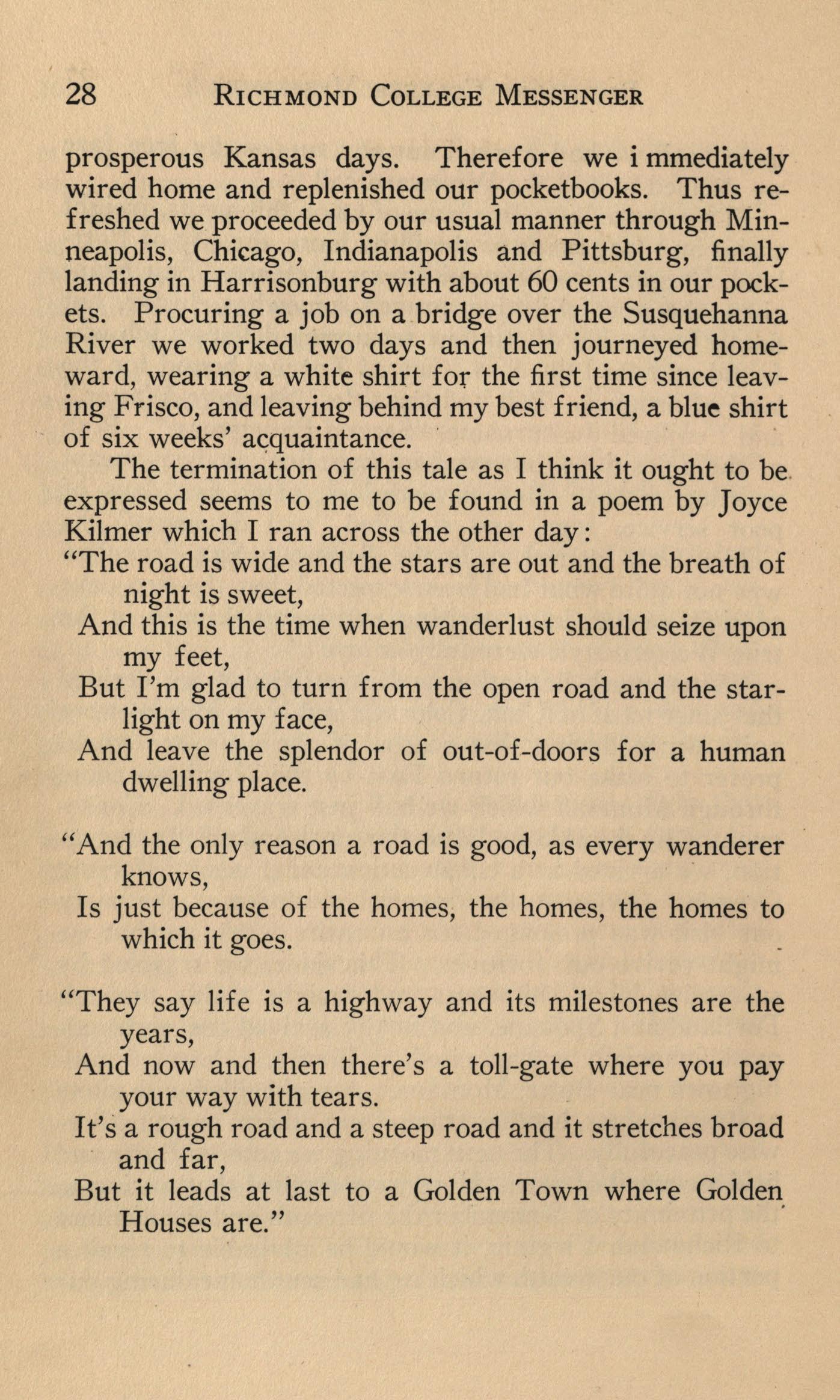
prosperous Kansas days. Therefore we immediately wired home and replenished our pocketbooks. Thus refreshed we proceeded by our usual manner through Minneapolis, Chicago, Indianapolis and Pittsburg, finally landing in Harrisonburg with about 60 cents in our pockets. Procuring a job on a bridge over the Susquehanna River we worked two days and then journeyed homeward, wearing a white shirt for the first time since leaving Frisco, and leaving behind my best friend, a blue shirt of six weeks' aGquaintance.
The termination of this tale as I think it ought to be expressed seems to me to be found in a poem by Joyce Kilmer which I ran across the other day:
"The road is wide and the stars are out and the breath of night is sweet,
And this is the time when wanderlust should seize upon my feet,
But I'm glad to turn from the open road and the starlight on my face, And leave the splendor of out-of-doors for a human dwelling place.
"And the only reason a road is good, as every wanderer knows,
Is just because of the homes, the homes, the homes to which it goes.
"They say life is a highway and its milestones are the years,
And now and then there's a toll-gate where you pay your way with tears. It's a rough road and a steep road and it stretches broad and far,
But it leads at last to a Golden Town where Golden Houses are."
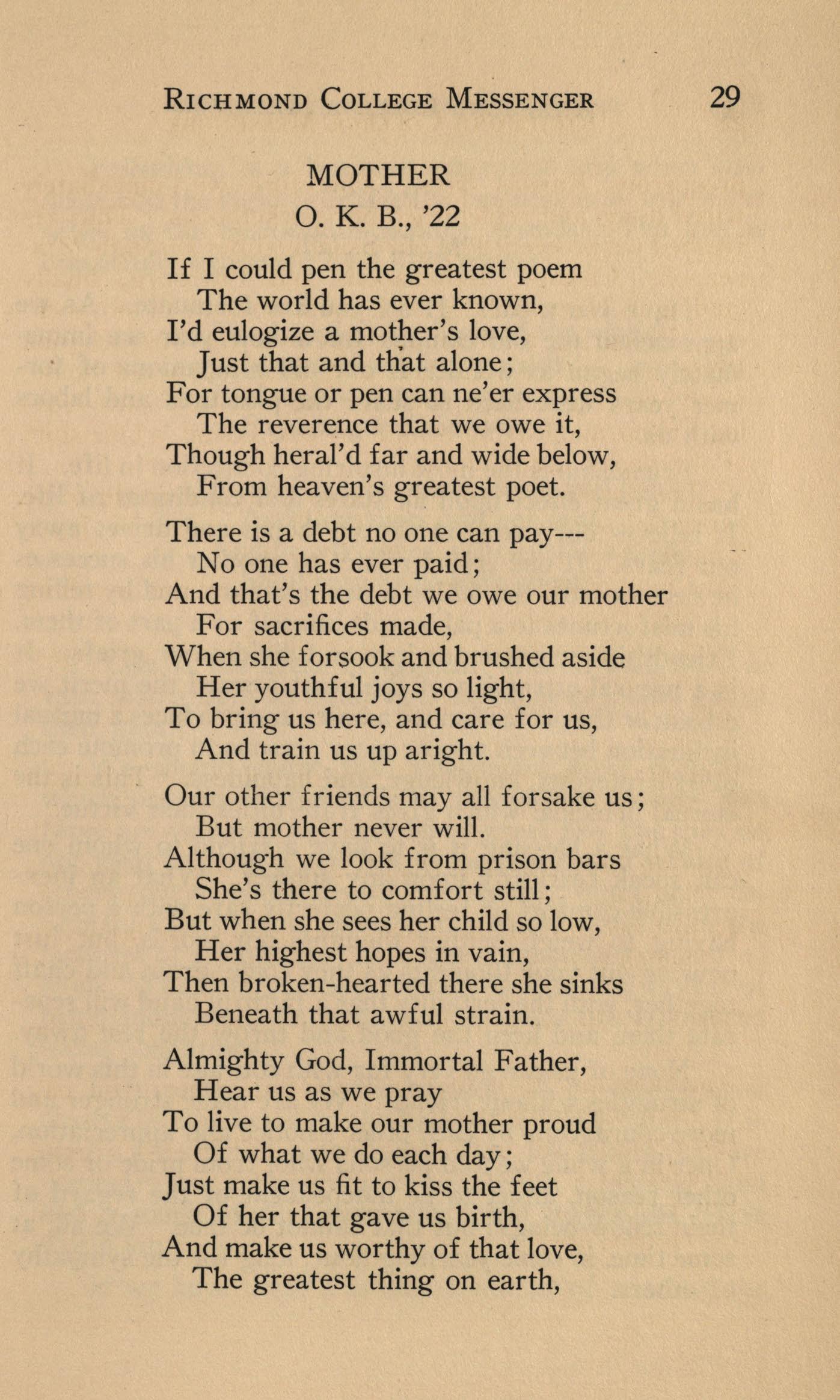
MOTHER 0. K. B., '22
If I could pen the greatest poem
The world has ever known, I'd eulogize a mother's love, Just that and th'at alone; For tongue or pen can ne'er express The reverence that we owe it, Though heral'd far and wide below, From heaven's greatest poet.
There is a debt no one can pay--N o one has ever paid; And that's the debt we owe our mother For sacrifices made, When she forsook and brushed aside
Her youth£ ul joys so light, To bring us here, and care for us, And train us up aright.
Our other friends may all forsake us; But mother never will. Although we look from prison bars She's there to comfort still; But when she sees her child so low, Her highest hopes in vain, Then broken-hearted there she sinks Beneath that awful strain.
Almighty God, Immortal Father, Hear us as we pray
To live to make our mother proud Of what we do each day; Just make us fit to kiss the feet Of her that gave us birth, And make us worthy of that love, The greatest thing on earth,
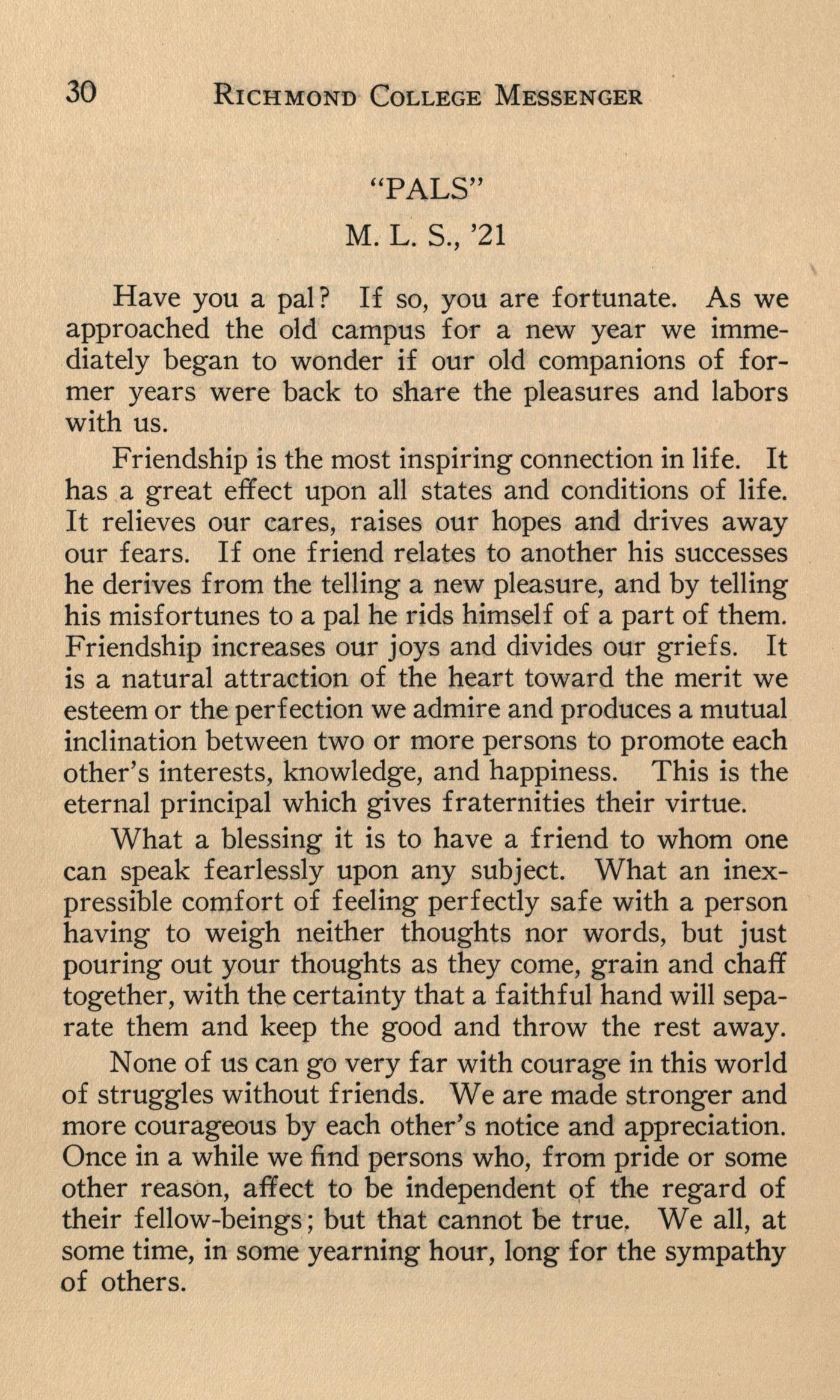
"PALS"
M. L. S., '21
Have you a pal? If so, you are fortunate. As we approached the old campus for a new year we immediately began to wonder if our old companions of former years were back to share the pleasures and labors with us.
Friendship is the most inspiring connection in life. It has a great effect upon all states and conditions of life. It relieves our cares, raises our hopes and drives away our fears. If one friend relates to another his successes he derives from the telling a new pleasure, and by telling his misfortunes to a pal he rids himself of a part of them. Friendship increases our joys and divides our griefs. It is a natural attraction of the heart toward the merit we esteem or the perfection we admire and produces a mutual inclination between two or more persons to promote each other's interests, knowledge, and happiness. This is the eternal principal which gives fraternities their virtue.
What a blessing it is to have a friend to whom one can speak fearlessly upon any subject. What an inexpressible comfort of feeling perfectly safe with a person having to weigh neither thoughts nor words, but just pouring out your thoughts as they come, grain and chaff together, with the certainty that a faithful hand will separate them and keep the good and throw the rest away.
None of us can go very far with courage in this world of struggles without friends. We are made stronger and more courageous by each other's notice and appreciation. Once in a while we find persons who, from pride or some other reason, affect to be independent qf the regard of their fellow-beings; but that cannot be true, We all, at some time, in some yearning hour, long for the sympathy of others.
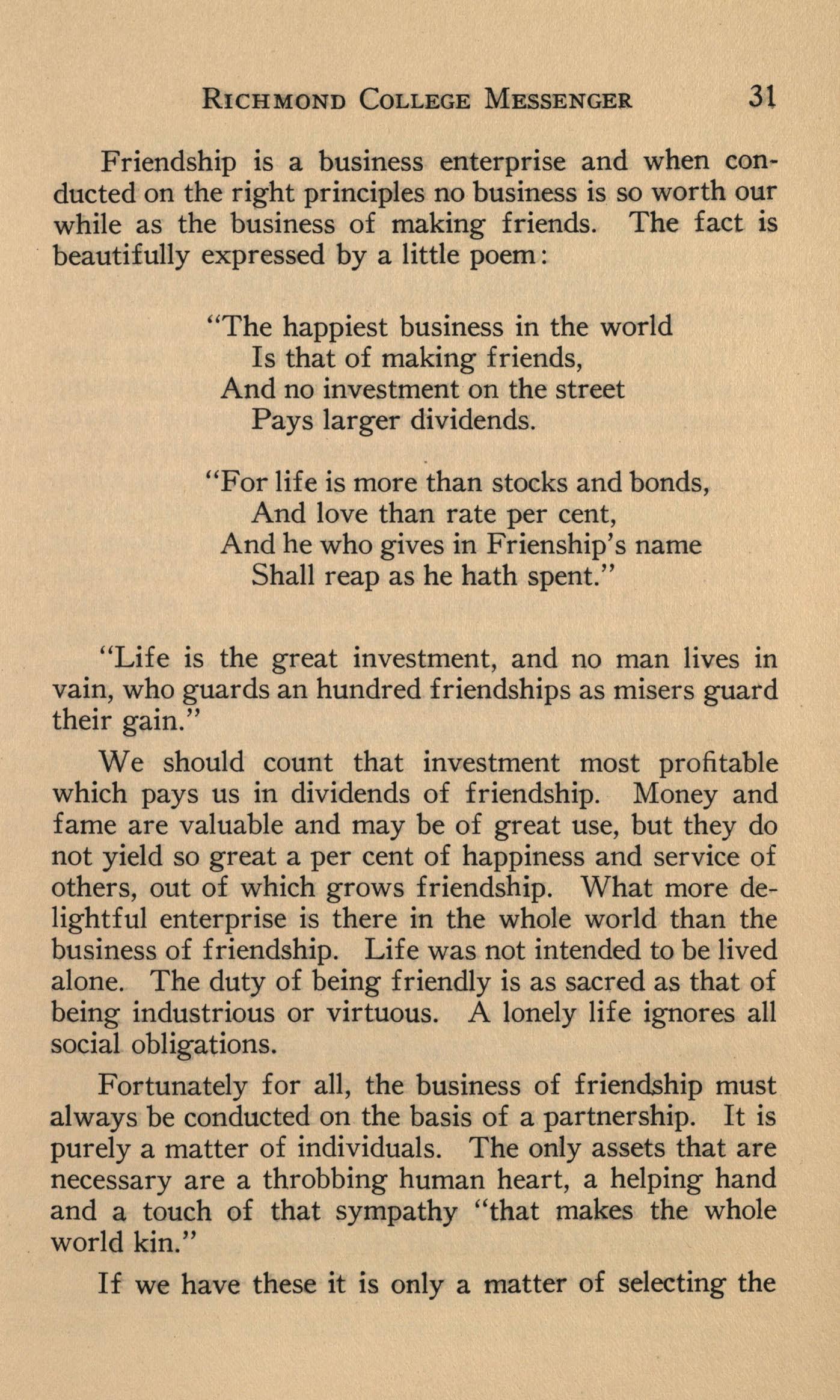
Friendship is a business enterprise and when conducted on the right principles no business is so worth our while as the business of making friends. The fact is · beautifully expressed by a little poem:
"The happiest business in the world Is that of making friends, And no investment on the street Pays larger dividends.
"For life is more than stocks and bonds, And love than rate per cent, And he who gives in Frienship's name Shall reap as he hath spent."
"Life is the great investment, and no man lives in vain, who guards an hundred friendships as misers guard their gain."
We should count that investment most profitable which pays us in dividends of friendship. Money and fame are valuable and may be of great use, but they do not yield so great a per cent of happiness and service of others, out of which grows friendship. What more delightful enterprise is there in the whole world than the business of friendship. Life was not intended to be lived alone. The duty of being friendly is as sacred as that of being industrious or virtuous. A lonely life ignores all social obligations.
Fortunately for all, the business of friendship must always be conducted on the basis of a partnership. It is purely a matter of individuals. The only assets that are necessary are a throbbing human heart, a helping hand and a touch of that sympathy "that makes the whole world kin."
If we have these it is only a matter of selecting the
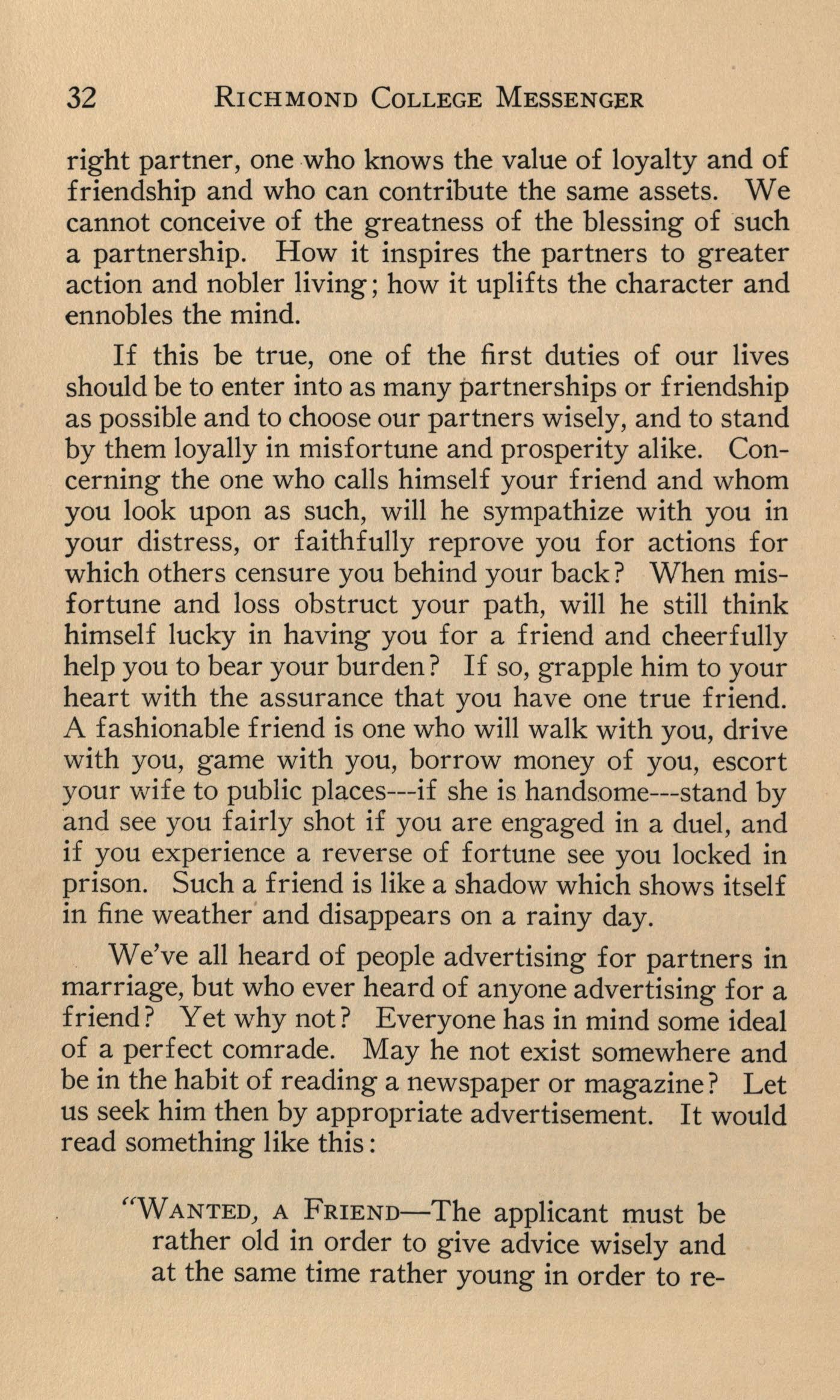
right partner, one who knows the value of loyalty and of friendship and who can contribute the same assets. We cannot conceive of the greatness of the blessing of such a partnership. How it inspires the partners to greater action and nobler living; how it uplifts the character and ennobles the mind.
If this be true, one of the first duties of our lives should be to enter into as many partnerships or friendship as possible and to choose our partners wisely, and to stand by them loyally in misfortune and prosperity alike. Concerning the one who calls himself your friend and whom you look upon as such, will he sympathize with you in your distress, or faithfully reprove you for actions for which others censure you behind your back? When misfortune and loss obstruct your path, will he still think himself lucky in having you for a friend and cheerfully help you to bear your burden? If so, grapple him to your heart with the assurance that you have one true friend. A fashionable friend is one who will walk with you, drive with you, game with you, borrow money of you, escort your wife to public pla,.ces---if she is handsome---stand by and see you fairly shot if you are engaged in a duel, and if you experience a reverse of fortune see you locked in prison. Such a friend is like a shadow which shows itself in fine weather and disappears on a rainy day.
We've all heard of people advertising for partners in marriage, but who ever heard of anyone advertising for a friend? Yet why not? Everyone has in mind some ideal of a perfect comrade. May he not exist somewhere and be in the habit of reading a newspaper or magazine? Let us seek him then by appropriate advertisement. It would read something like this :
"WANTED, A FRIEND-The applicant must be rather old in order to give advice wisely and at the same time rather young in order to re-
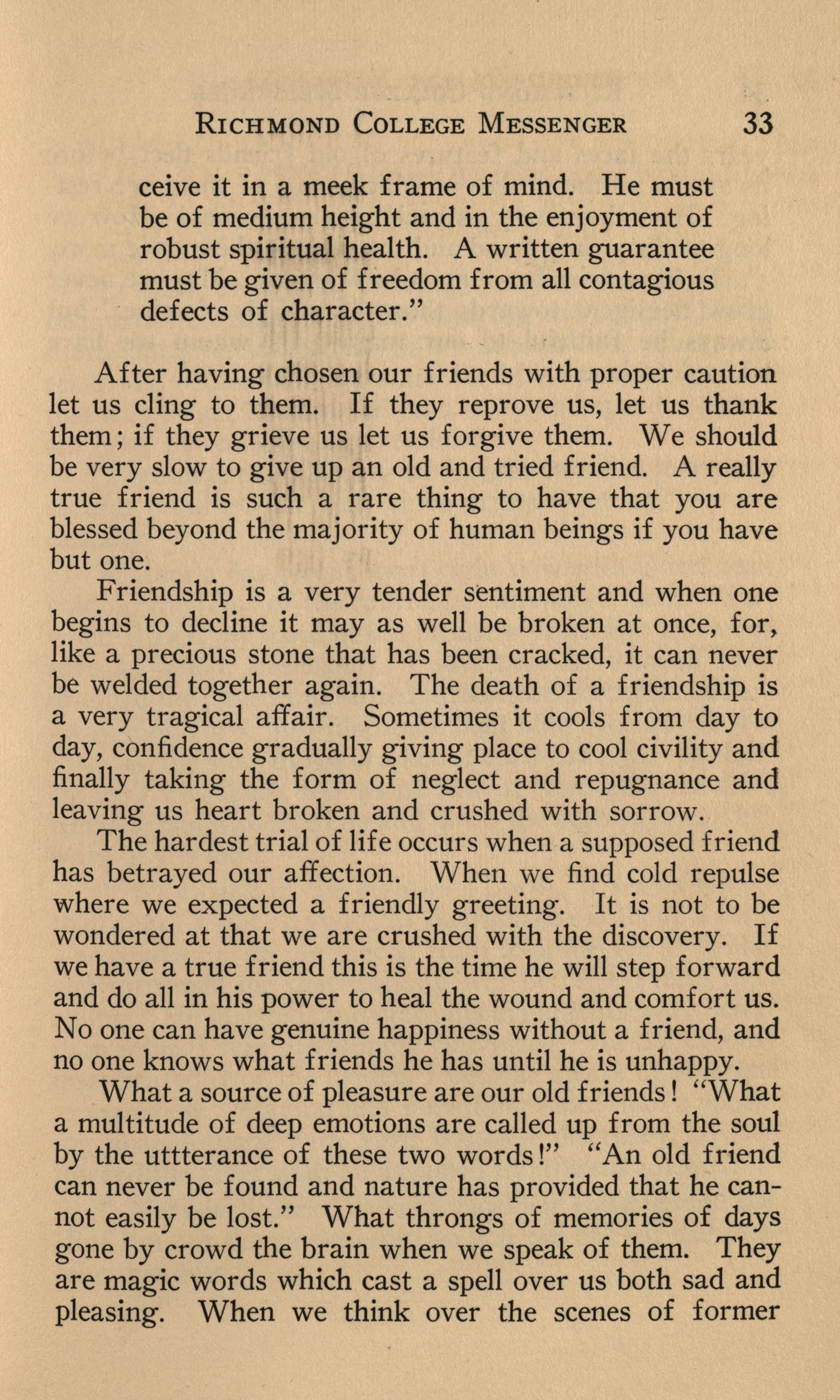
ceive it in a meek frame of mind. He must be of medium height and in the enjoyment of robust spiritual health. A written guarantee must be given of freedom from all contagious defects of character."
After having chosen our friends with proper caution let us cling to them. If they reprove us, let us thank them; if they grieve us let us forgive them. We should be very slow to give up an old and tried friend. A really true friend is such a rare thing to have that you are blessed beyond the majority of human beings if you have but one.
Friendship is a very tender sentiment and when one begins to decline it may as well be broken at once, for, like a precious stone that has been cracked, it can never be welded together again. The death of a friendship is a very tragical affair. Sometimes it cools from day to day, confidence gradually giving place to cool civility and finally taking the form of neglect and repugnance and leaving us heart broken and crushed with sorrow.
The hardest trial of life occurs when a supposed friend has betrayed our affection. When we find cold repulse where we expected a friendly greeting. It is not to be wondered at that we are crushed with the discovery. If we have a true friend this is the time he will step forward and do all in his power to heal the wound and comfort us. No one can have genuine happiness without a friend, and no one knows what friends he has until he is unhappy. What a source of pleasure are our old friends! "What a multitude of deep emotions are called up from the soul by the uttterance of these two words!" "An old friend can never be found and nature has provided that he cannot easily be lost." What throngs of memories of days gone by crowd the brain when we speak of them. They are magic words which cast a spell over us both sad and pleasing. When we think over the scenes of former
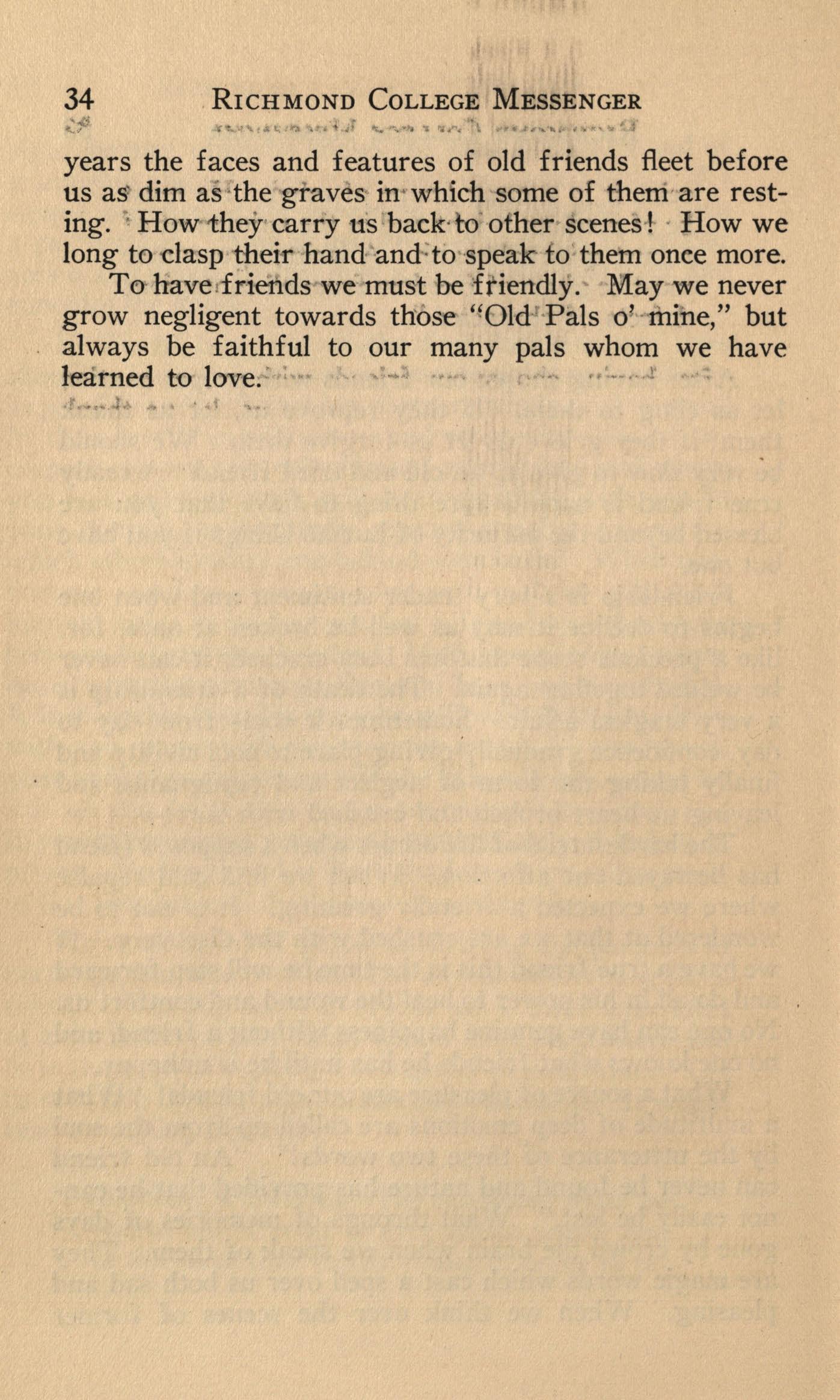
34 RICHMOND COLLEGE MESSENGER
years the faces and features of old friends fleet before us as' dim a s ·the graves in· which some of them ·are resting. How 1:hey ·carry us back to ·other scenes ·! · How we long to clasp their hand and ·to -speak to them onee more.
To have 1friehds we must be friendly. May we never grow negligent towards those ' fQld Pals o L fu.ine," but always be faithful to our many pals whom we have learned to love. ·
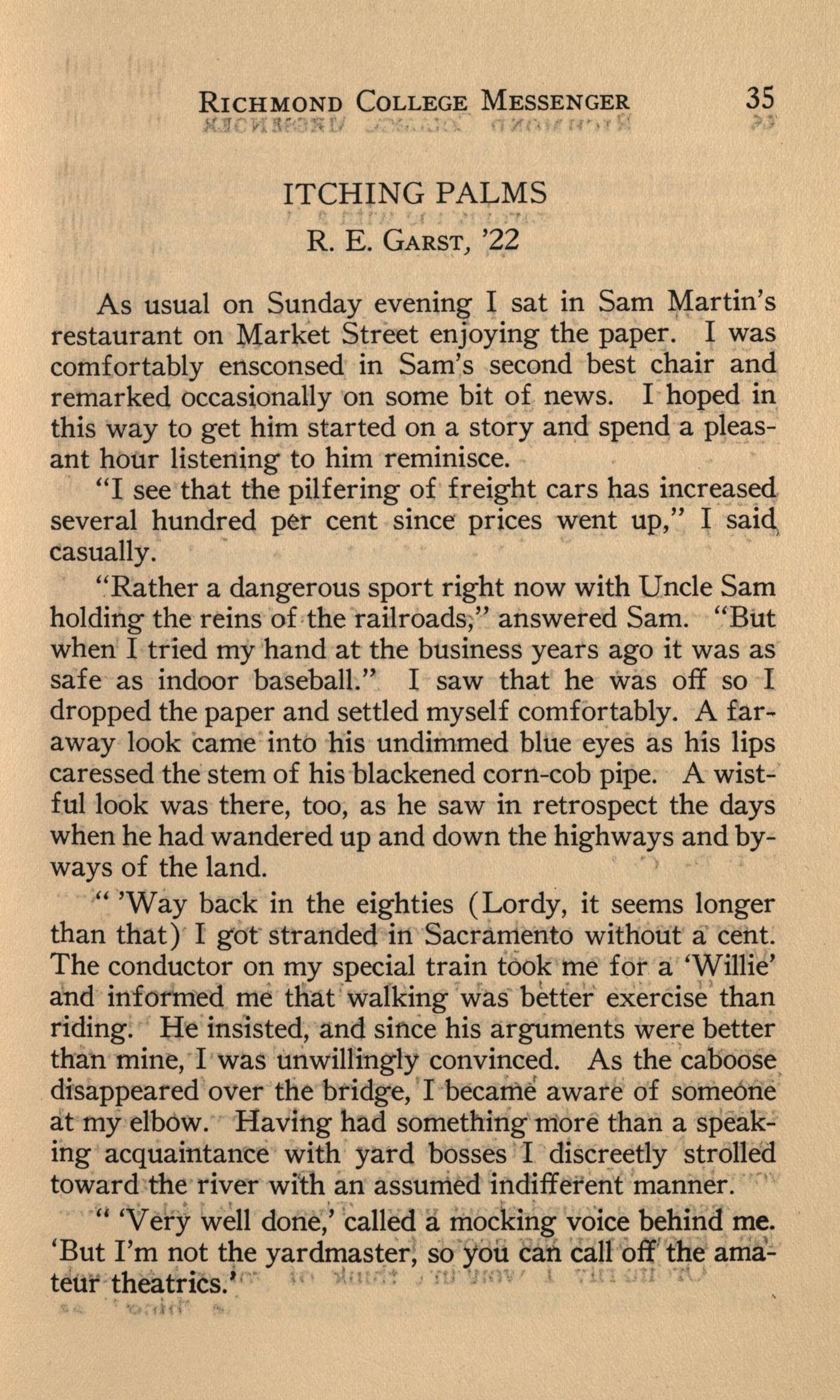
ITCHING PALMS
R. E. GARST, '2 2
As usual on Sunday evening I sat in Sam J:4artin ' s restaurant on Market Street enjoying the paper. I was comfortably ensconsed in Sam's second best chair and remarked occasionally on some bit of news. I hoped in this way to get him started on a story an~ spend a pleasant hour listening to him reminisce.
"I see that the pilfering of freight cars has increased several hundred per cent since prices went up," I sai~ casually.
"Rather a dangerous sport right now with Uncle Sam holding the reins of .the railroads ;" answered Sam. "But when I tried my hand at the business years ago it was as safe as indoor baseball." I saw that he was off so I dropped the paper and settled myself comfortably. A far~ away look came into his undimmed blue eyes as his lips caressed the stem of his blackened corn-cob pipe. A wistful look was there, too, as he saw in retrospect the days when he had wandered up and down the highways and byways of the land. ·
"'Way back in the eighties (Lordy, it seems longer than that) I gof stranded irt Sacramento without a· cent. The conductor on my special train t6ok me for a 'Willie' and informed me tnat ' walking was better · exercise than riding. He insisted, and since his arguments were better than mine, I was unwillingly convinced. As the ·caboose , disappeared over the bridge, ' I beca111iaware of someone at my elbow. Having had something more than a speaking acquaintance with yard bosses I discreetly strolled toward the river with an assumed indifferent manner. '
" 'Very well done,' called a mocld~g voice behind me. 'But I'm not the yardmaster, so yoiican call off' the amateur theatrics! ' I ' ' ,, I ' • : .. . '
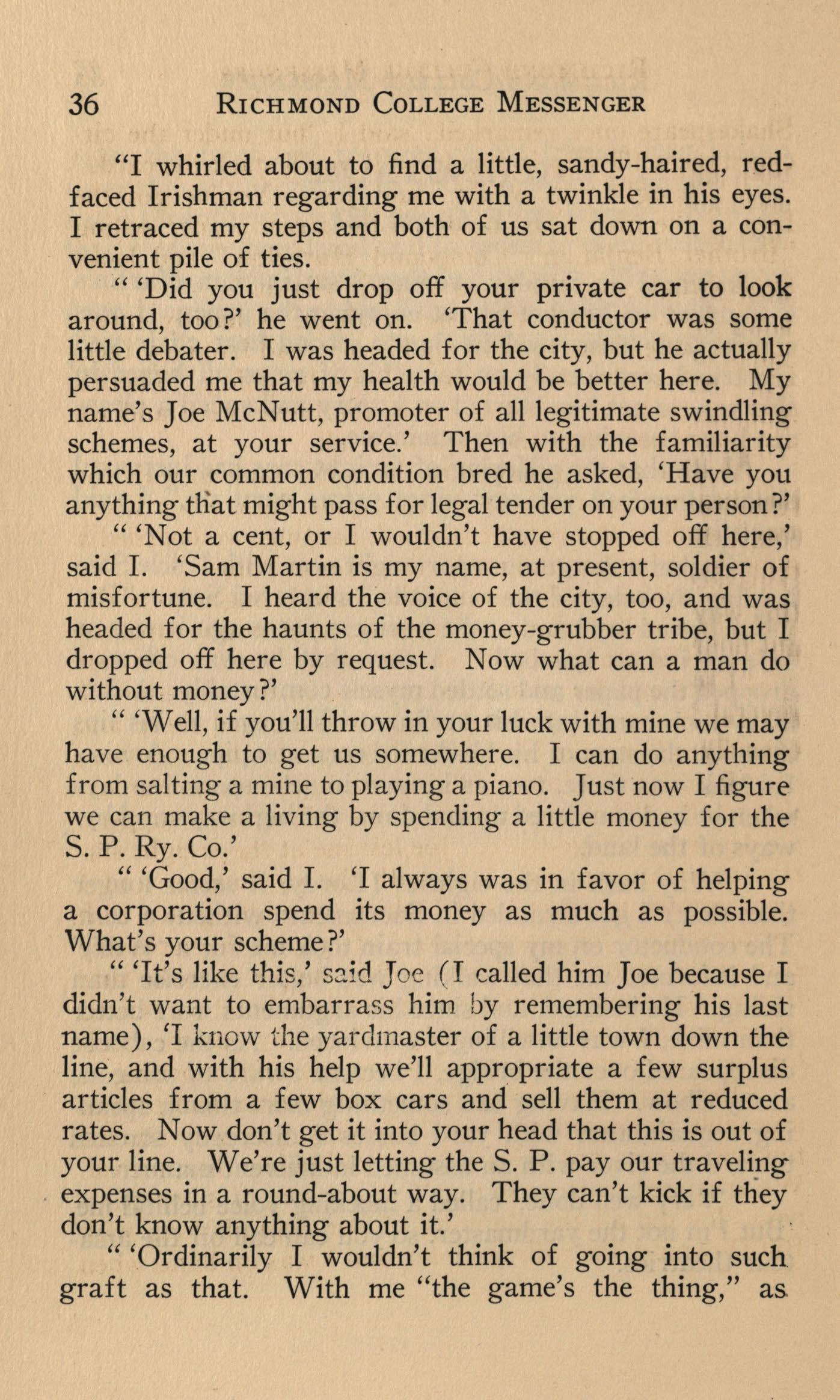
"I whirled about to find a little, sandy-haired, redfaced Irishman regarding me with a twinkle in his eyes. I retraced my steps and both of us sat down on a convenient pile of ties.
" 'Did you just drop off your private car to look around, too?' he went on. 'That conductor was some little debater. I was headed for the city, but he actually persuaded me that my health would be better here. My name's Joe McNutt , promoter of all legitimate swindling schemes, at your service.' Then with the familiarity which our common condition bred he asked, 'Have you anything tliat might pass for legal tender on your person?'
"'Not a cent, or I wouldn't have stopped off here,' said I. 'Sam Martin is my name, at present, soldier of misfortune. I heard the voice of the city, too, and was headed for the haunts of the money-grubber tribe, but I dropped off here by request. Now what can a man do without money?'
" 'Well, if you'll throw in your luck with mine we may have enough to get us somewhere. I can do anything from salting a mine to playing a piano. Just now I figure we can make a living by spending a little money for the S. P. Ry. Co.'
" 'Good,' said I. 'I always was in favor of helping a corporation spend its money as much as possible. What's your scheme?'
"'It's like thi s,' s2.id J oe ( I called him Joe because I didn't want to embarra ss him by remembering his last name), 'I kn ow the yardmaster of a little town down the line , and with his help we'll appropriate a few surplus articles from a few box cars and sell them at reduced rates. Now don't get it into your head that this is out of your line. We're just letting the S. P. pay our traveling . expenses in a round-about way. They can't kick if tliey don't know anything about it.'
" 'Ordinarily I wouldn't think of going into such graft as that. With me "the game's the thing," as.
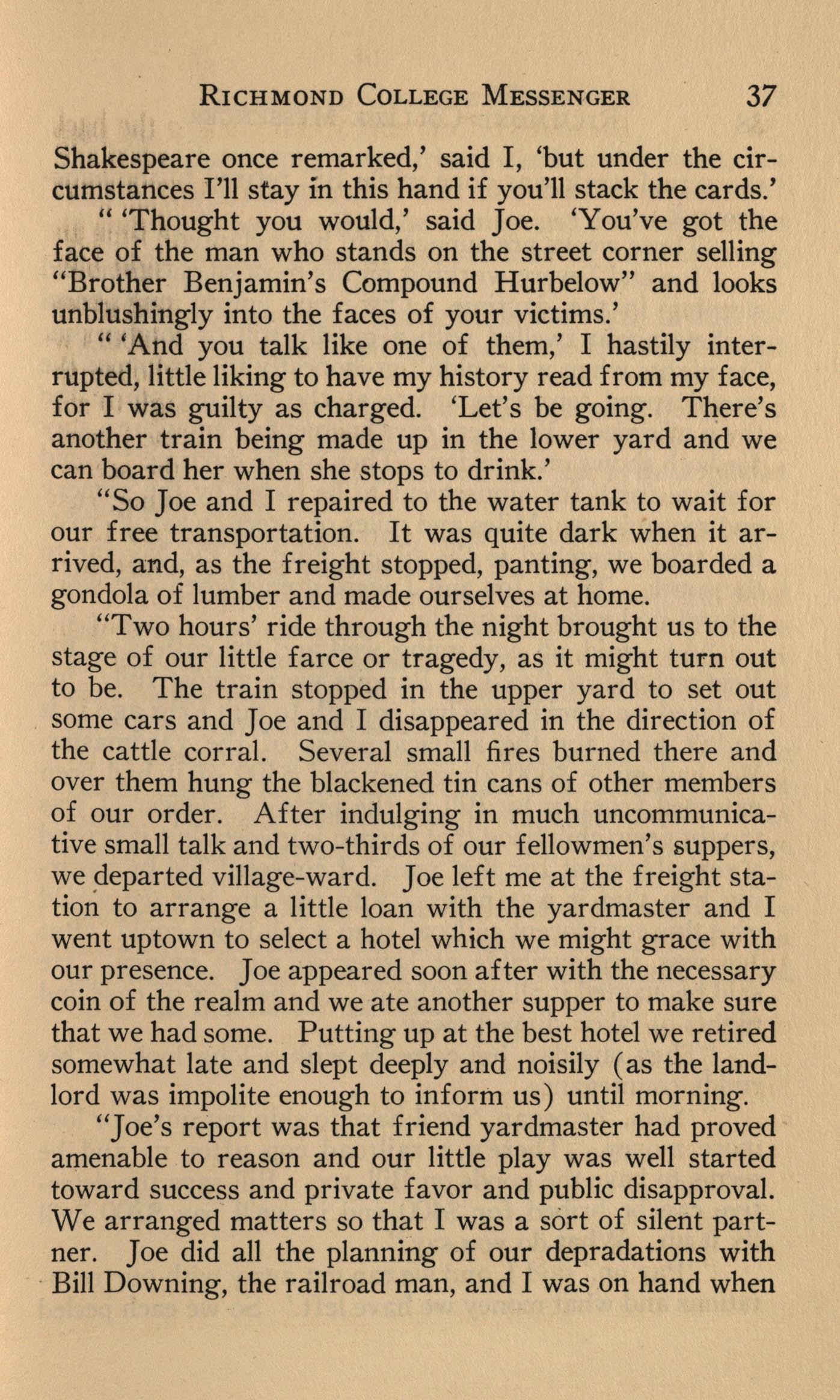
Shakespeare once remarked,' said I, 'but under the circumstances I'll stay in this hand if you'll stack the cards.'
i, 'Thought you would,' said Joe. 'You've got the face of the man who stands on the street corner selling "Brother Benjamin's Compound Hurbelow" and looks unblushingly into the faces of your victims.'
" 'And you talk like one of them,' I hastily interrupted, little liking to have my history read from my face, for I was guilty as charged. 'Let's be going. T4ere's another train being made up in the lower yard and we can board her when she stops to drink.'
"So Joe and I repaired to the water tank to wait for our free transportation. It was quite dark when it arrived, and, as the freight stopped, panting, we boarded a gondola of lumber and made ourselves at home.
"Two hours' ride through the night brought us to the stage of our little farce or tragedy, as it might turn out to be. The train stopped in the upper yard to set out some cars and Joe and I disappeared in the direction of the cattle corral. Several small fires burned there and over them hung the blackened tin cans of other members of our order. After indulging in much uncommunicative small talk and two-thirds of our fellowmen's suppers, we ~eparted village-ward. Joe left me at the freight station to arrange a little loan with the yardmaster and I went uptown to select a hotel which we might grace with our presence. Joe appeared soon after with the necessary coin of the realm and we ate another supper to make sure that we had some. Putting up at the best hotel we retired somewhat late and slept deeply and noisily ( as the landlord was impolite enough to inform us) until morning.
"Joe's report was that friend yardmaster had proved amenable to reason and our little play was well started toward success and private favor and public disapproval. We arranged matters so that I was a sort of silent partner. Joe did all the planning of our depradations with · Bill Downing, the railroad man, and I was on hand when
MESSENGER
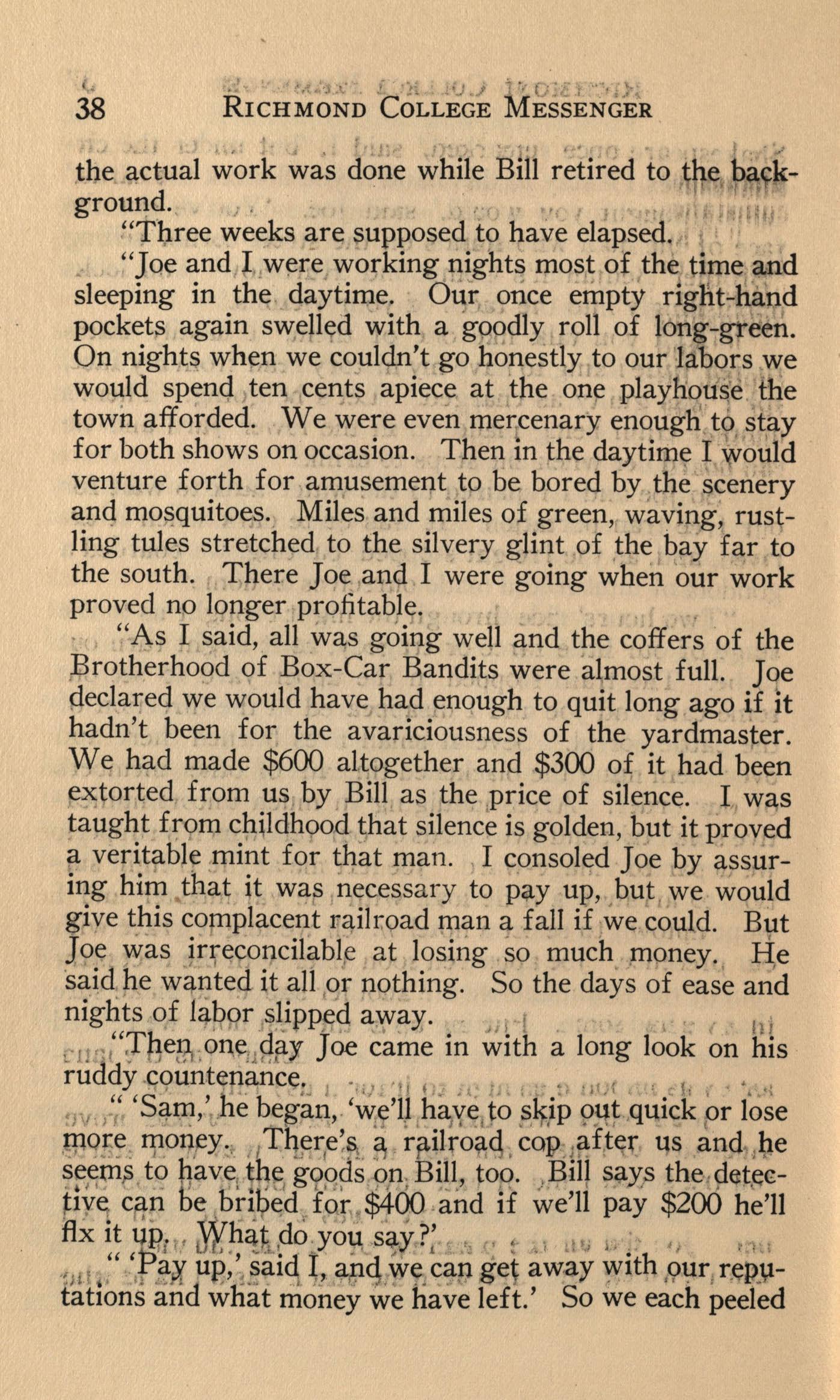
"'I ,,
the actual work was done while Bill retired to the back. · ii I T grou~d. . 1 •
,._.,
, , . Ill :'TJ;iree we~ks are supposed to have elapsed, . '.'Joe and I ,were , woi;-king11tiht~ mos,~ of tht; tipie ,_and sleeping in the . daytin:i~. 011r, once empty nglit-ha.I,Id pockets again swep~d with a g~qdly roll of iong-gre'en. On night~ w h~n we co_µlcln'tgo horestly to our 'l~b?rs ,w_e would spenq. ,ten ,cents apiec~ at the onr playti~u~e. th:e town afforded. W. e were even merrcenary enough to , st,ay for both shows on occasion. Then in the daytime I \VOuld , ' , venture forth for amusemetJ,t to be bored by the scenery apq mo?.quitoes._ M~les and miles of green,, waving; rustling tules stretched to the silvery glint of the ~ilY far to the south. There J qe an4 I were going when our work proved np lgnger ;p~ofitab_le. , . .
. . "As I said, all wa,s going well and the coffers of the ,Brotherho()d 9f Box-Car Bandits were a\most full. Jqe peclar;eq.we would have had ri;10ughto quit long ago if it hadn't been for the avariciousness of the yardmaster. We h~d made $600 aL~ogether and $300 o~ it had b~en rxtorted from us , by Bill as the [price of silence. I wa,s taught f r9m ch,ldh9qd that silence is golden, but it prov ed a veritable mint for that man. , I consoled Joe by assuring him that ~t wap ~ecessary to p:;i.yup, ,but , we would give t ~is cof11place~ttTc).ilr.oadtn?-n fall if ;we co\l,ld. Bvt Joe ~as irp~concilabl1e at losing so much _,noney. , ~e ·sa~d:he w,p:~.te~it all ,or pothing. So the days of ease and nights of 1a~gr_sl_ipp,t;d ~\V~Y,-. • 1 I tu cii•·."!he/?i ;on.~H~P-YJoe came in with a long look on his ruddy -~9unt~n~nce:. i • ,, , 11 1 • " 1 , :, ,11,1 , , - " • -. ,: 1 ,1 , ',' 'S4~,' he beg~n, . 'wflJ haxe 1to .s.~.ip 9~t,quick pr lose .BN!:~ . rv.or,fY:~ ,1Tlu ~rt:~ . ?,, q:1.ilro~g,COP,tf1£,t<tr4s and . )Je ~f,~UI;, t <?qave 1 ~45g9Rps-9,n,B~!l ,, to,q. JB~lJsayp the ,~~t~~t1y1 Cf!-!1te b~1.~~d}.O-f.:$1QO,and if we 11pay $200 he 11 fix 1t lJP.•,, ~foiJ; ,do .yo1,1.say?; ,, , , .,.; -'" i .· ,, , 1 -~;rl'" :tiJuf \ ~~ic_f. ~! e;1.pg ,w~.car ge\ ~way ~ith pur in~P.\1tatlons and what money we have left. So we each peeled
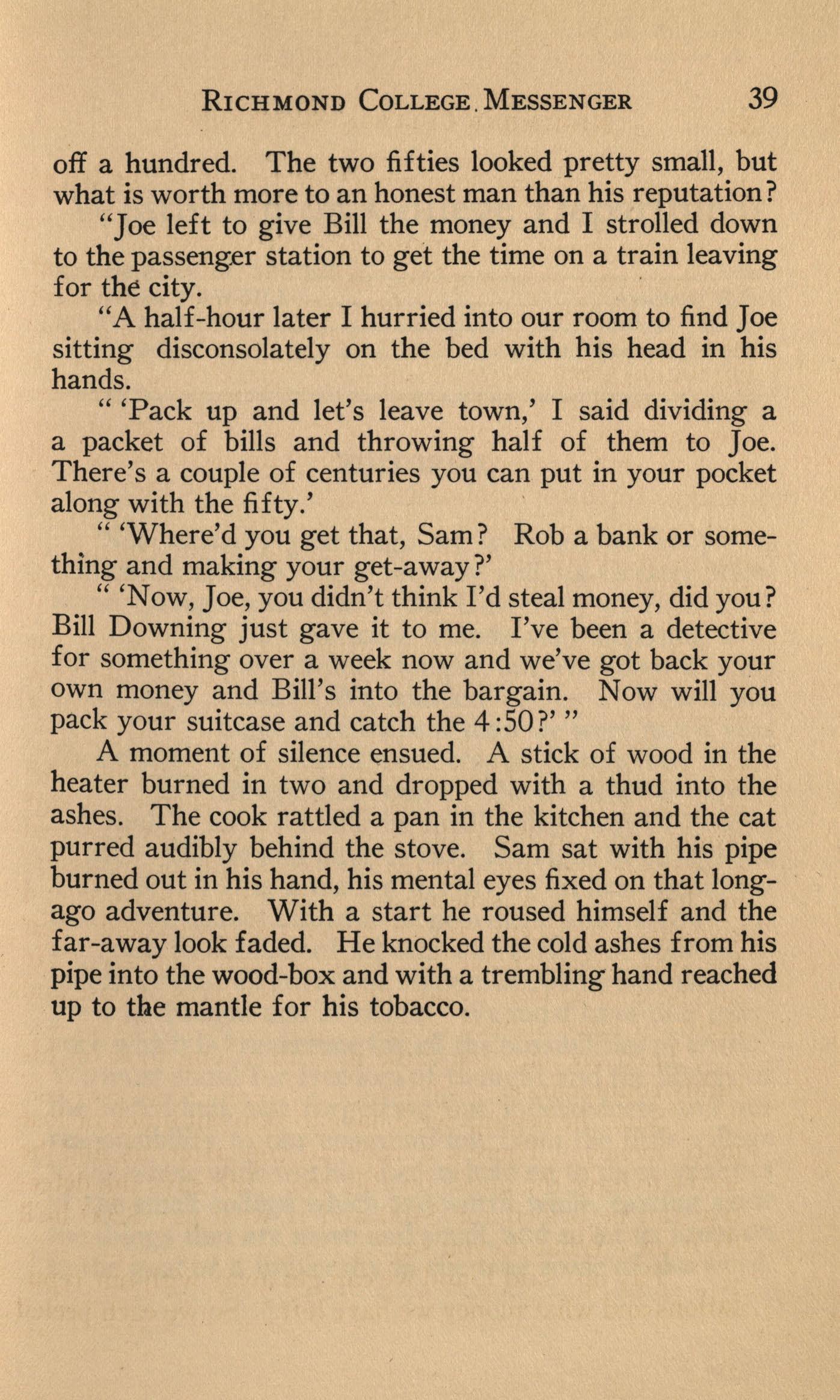
off a hundred. The two fifties looked pretty small, but what is worth more to an honest man than his reputation?
"Joe left to give Bill the money and I strolled down to the passenger station to get the time on a train leaving for the city.
"A half-hour later I hurried into our room to find Joe sitting disconsolately on the bed with his head in his hands.
"'Pack up and let's leave town,' I said dividing a a packet of bills and throwing half of them to Joe. There's a couple of centuries you can put in your pocket along with the fifty.'
"'Where'd you get that, Sam? Rob a bank or something and making your get-away?'
"'Now, Joe, you didn't think I'd steal money, did you? Bill Downing just gave it to me. I've been a detective for something over a week now and we've got back your own money and Bill's into the bargain. Now will you pack your suitcase and catch the 4 :SO?'"
A moment of silence ensued. A stick of wood in the heater burned in two and dropped with a thud into the ashes. The cook rattled a pan in the kitchen and the cat purred audibly behind the stove. Sam sat with his pipe burned out in his hand, his mental eyes fixed on that longago adventure. With a start he roused himself and the far-away look faded. He knocked the cold ashes from his pipe into the wood-box and with a trembling hand reached up to the mantle for his tobacco.
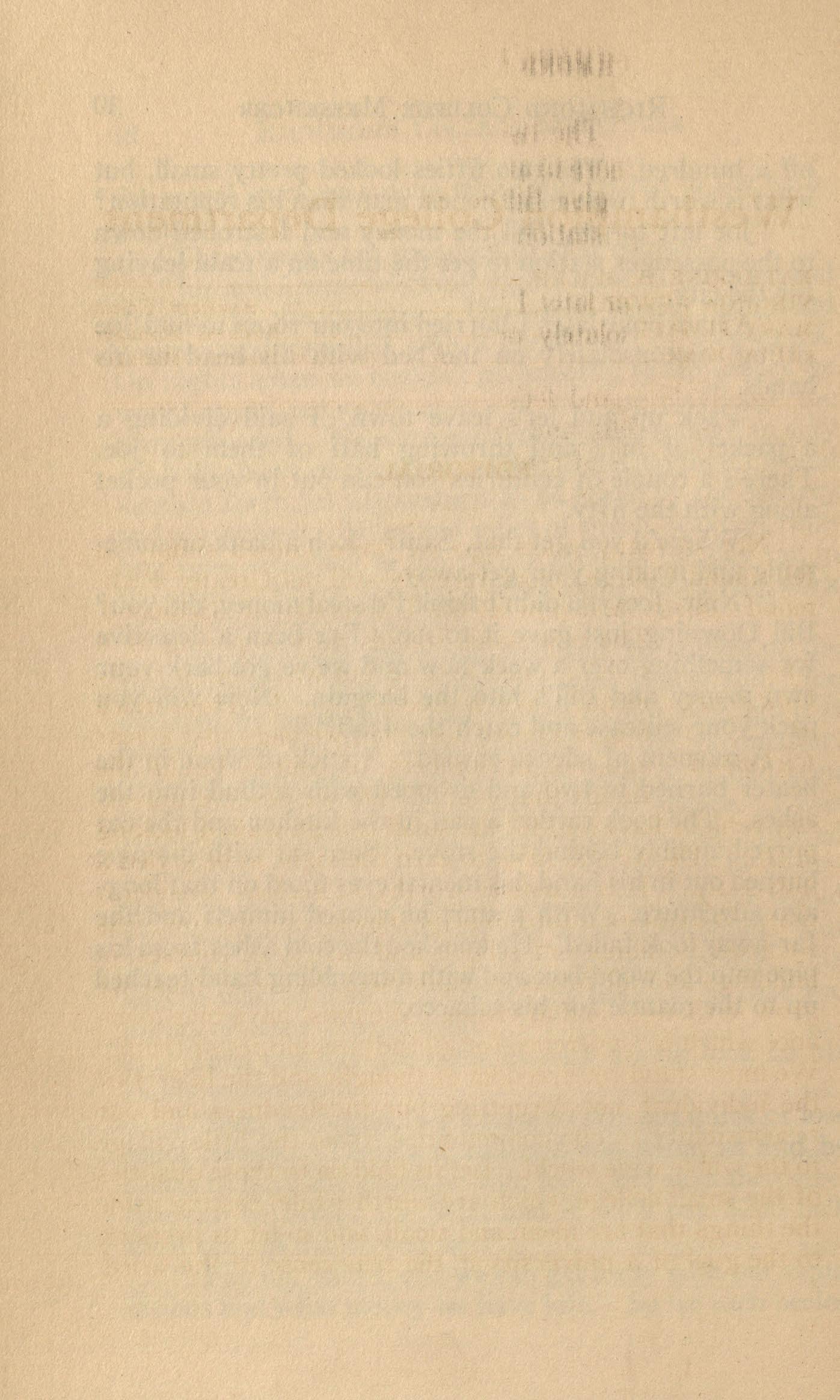
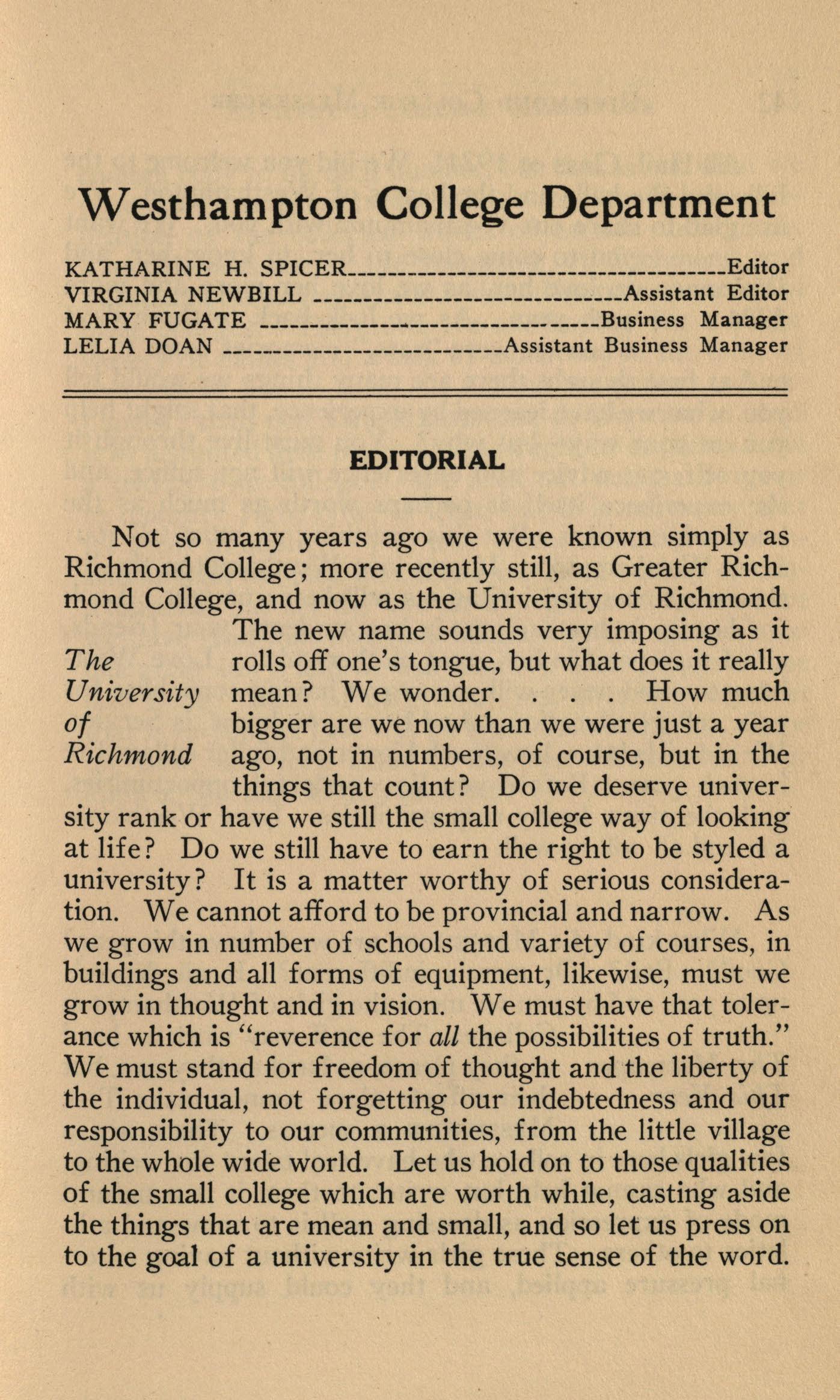
Westhampton College Department
KATHARINE H. SPICER ______________________________________ Editor
VIRGINIA NEWBILL _______________________________Assistant Editor
MARY FUGATE ----------------------------- _____Business Manager
LELIA DOAN ____________________________ Assistant Business Manager
EDITORIAL
Not so many years ago we were known simply as Richmond College; more recently still, as Greater Richmond College, and now as the University of Richmond. The University of Richmond The new name sounds very imposing as it rolls off one's tongue, but what does it really mean? We wonder. How much bigger are we now than we were just a year ago, not in numbers, of course, but in the things that count? Do we deserve university rank or have we still the small college way of looking at life? Do we still have to earn the right to be styled a university? It is a matter worthy of serious consideration. We cannot afford to be provincial and narrow. As we grow in number of schools and variety of courses, in buildings and all forms of equipment, likewise, must we grow in thought and in vision. We must have that tolerance which is "reverence for all the possibilities of truth." We must stand for freedom of thought and the liberty of the individual, not forgetting our indebtedness and our responsibility to our communities, from the little village to the whole wide world. Let us hold on to those qualities of the small college which are worth while, casting aside the things that are mean and small, and so let us press on to the goal of a university in the true sense of the word.
All Hail, Class of 1924 ! We bid you welcome to the hills apd the .1)al}.sand the ,he~rts o~.~t;sth ,a.mpt ,on. We are glad to share our Westhampton with you. We want _ . you to come close to her, to know her, and W.elcome , .to.love lier,a~'Ve loye her mR~e ap~ 1924 each . year. As we look back to , thpse daJ.s when we were "rats," memories come to us, and at first . thought .ther.e are many thi!lgs we would tell you, what we have learned by experience, that might help you on your way-but ,vhy? _ You must live throug;h it yourself, our advice and experience will not suffice, and the experience itself is perhaps worth as much as the knowledge gained. · But this one thing we must tell you: Love Westhampton. If you love Westhampton the little annoyances and irritatio.ns will be as naught. Look for beauty in her campus, in her students, your friends, all of them, and in her great mother-spirit. Love Westhampton and never will you regret having come here ,for your college education. And Love, you know, is Service. We old girls know how much bigger and fuller college life .is each year. Before.. you lie . wonderful opportunities, and, therefore ; heavy responsibilities. Love Westhampton and all will be well.
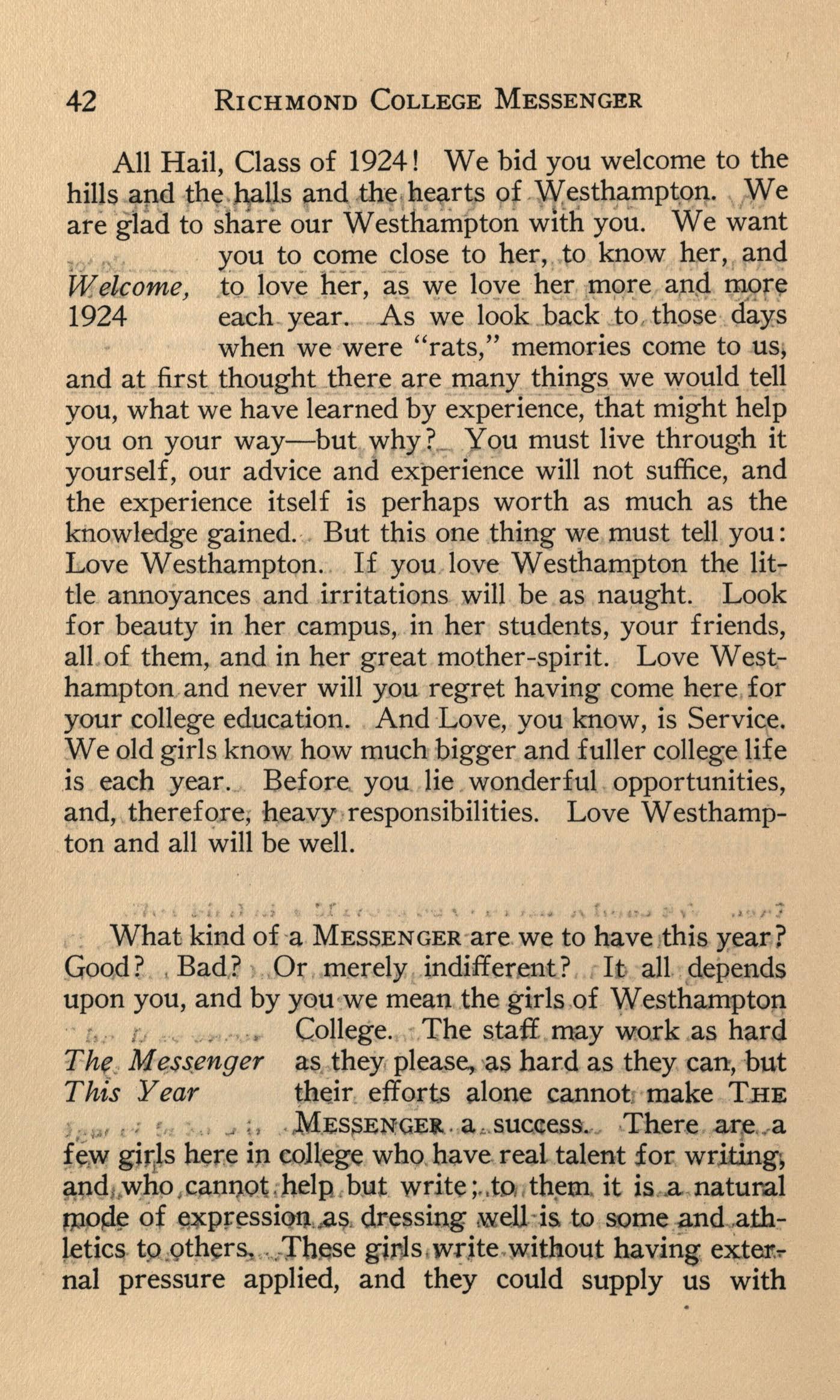
What kind of -a MESSENGER are .we to have this year? Good? , Bad ,? Or merely indiff er~nt? Lb all depends upon you, and by you we mean the girls ,of W esthamptoµ r, ,.. , , , .• College. The staff may work as hard Thf . M ~ss_enger as. they , please, -asbar.cl as they can, but This Year their efforts alone cannot i make T.HE ., ..... , , : ~. ,, ...,;, . ;MESpEN:GElt. , a ,.succ:ess. . Ther..e a-r.e.... a f~,w giri1.sher.e iJ1collegewho . h<,1.vereal talent :for wr.itinID ~pd ,.~hp , i:ao11ot.help . but write ;..to,,th~m.. it is ..a natunal 1PPP~ of e,~p,:~ssi~Q.,..a9. dressing iWell-is. to some .and .athletics t~t9th~r5;,.·,-Tb~se ginls iw~.ite .withoqt having eitw..nal pressure applied, and they could supply us with
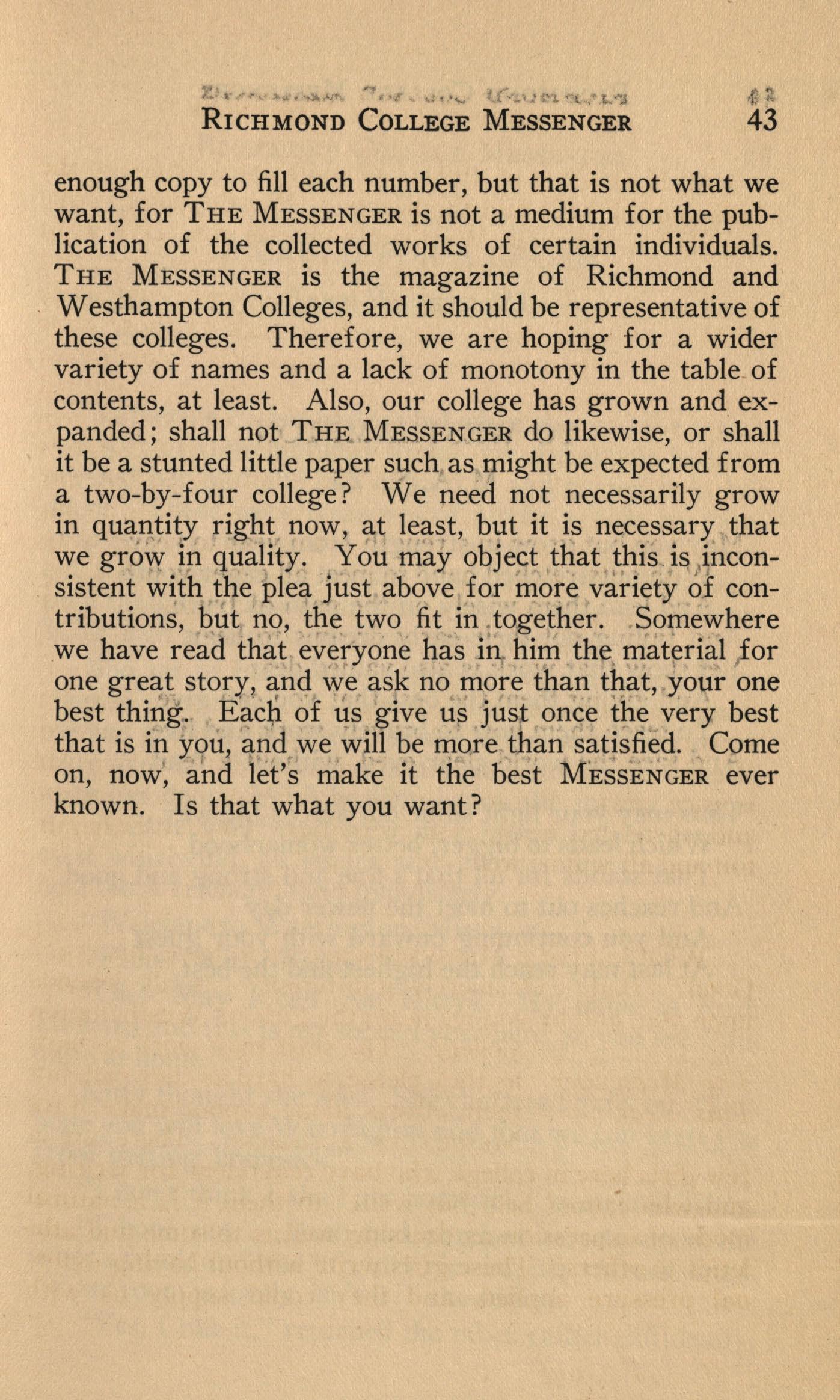
RICHMOND COLLEGE MESSENGER
enough copy to fill each number, but that is not what we want, for THE MESSENGER is not a medium for the publication of the collected works of certain individuals. THE MESSENGER is the magazine of Richmond and Westhampton Colleges, and it should be representative of these colleges. Therefore, we are hoping for a wider variety of names and a lack of monotony in the table of contents, at least. Also, our college has grown and expanded; shall not THE MESSENGER do likewise, or shall it be a stunted little paper such as might be expected from a two-by-four college? We need not necessarily grow in qua~tity right now, at lea~t, but it is necessary that we grow in quality. y OU may object that t his . is ,.inconsistent with the plea just above for more variety of contributions, but no, the two fit in .together. Somewhere we have read that everyone has in, him the . material ,for one great story 1 and we ask no more than that, your one best thing Eac6 of us give us just once the very best that is in youi and . we will be n:iore than satisfied. Come on, now, and let's make it the best MESSENGER ever known. Is that what you want?
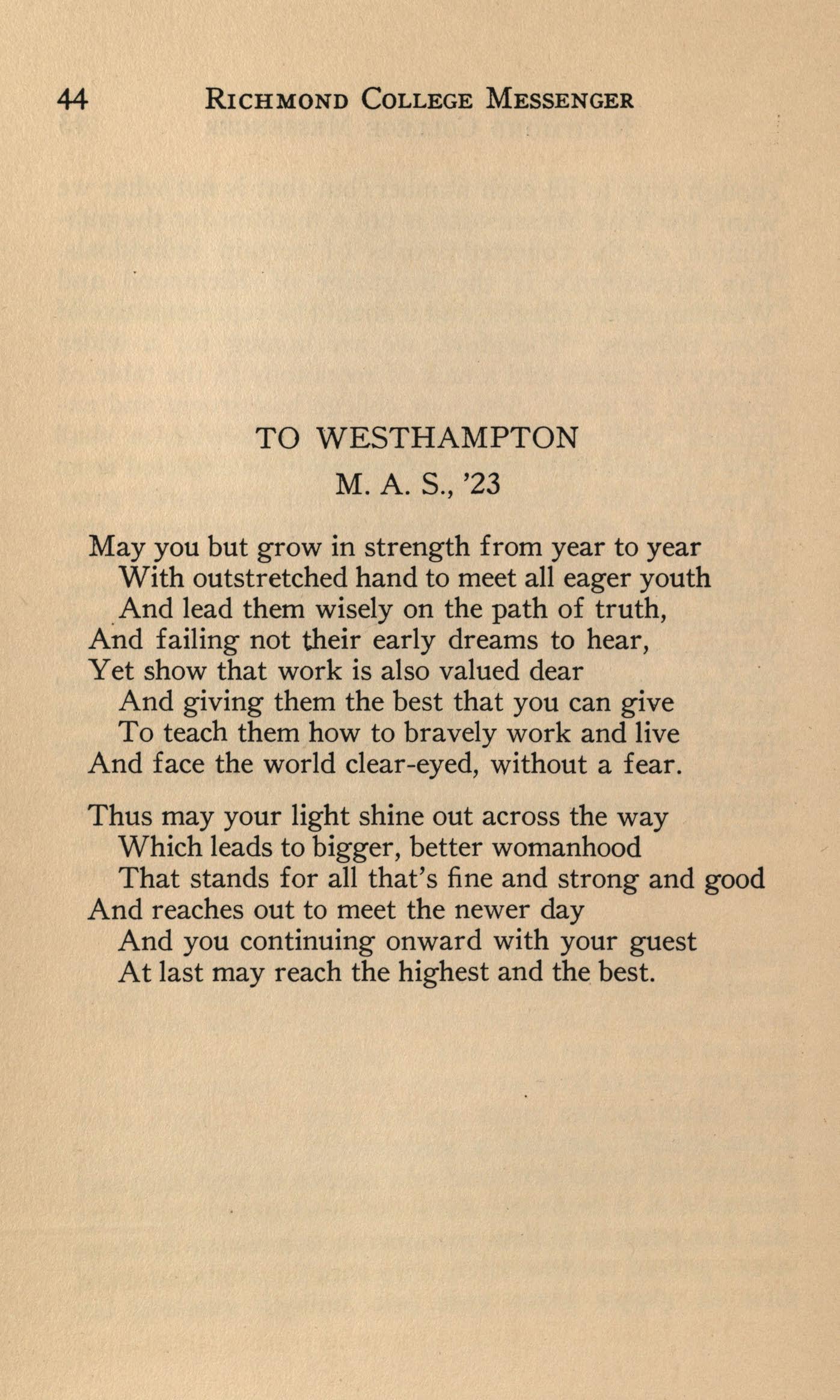
TO WESTHAMPTON
M.A. S., '23
May you but grow in strength from year to year
With outstretched hand to meet all eager youth .And lead them wisely on the path of truth, And failing not their early dreams to hear, Yet show that work is also valued dear And giving them the best that you can give To teach them how to bravely work and live And face the world clear-eyed, without a fear.
Thus may your light shine out across the way Which leads to bigger, better womanhood That stands for all that's fine and strong and good And reaches out to meet the newer day And you continuing onward with your guest At last may reach the highest and the best.
A CRUSH FOR A CRUSH
JANE WATERS, '23
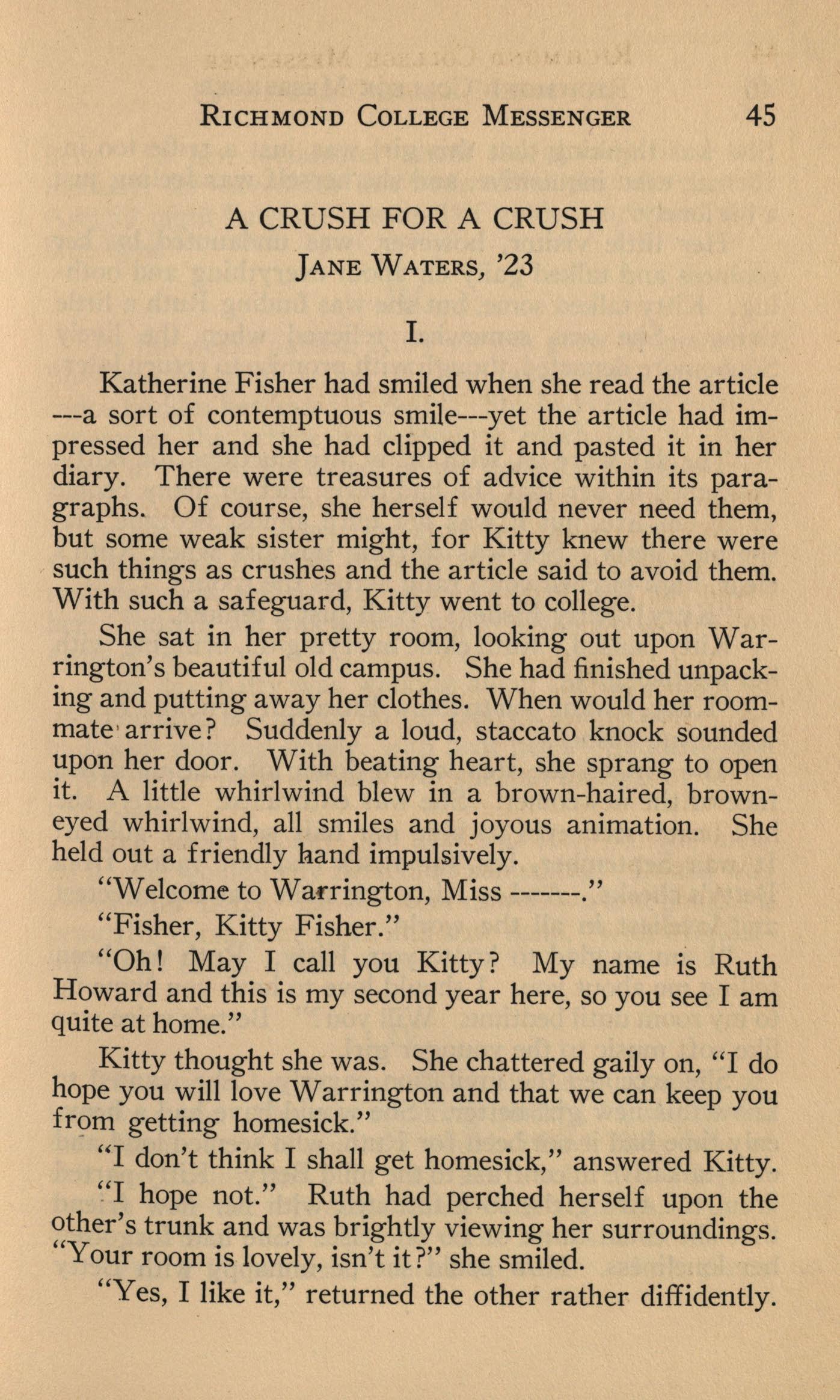
Katherine Fisher had smiled when she read the article ---a sort of contemptuous smile---yet the article had impressed her and she had clipped it and pasted it in her diary. There were treasures of advice within its paragraphs. Of course, she herself would never need them, but some weak sister might, for Kitty knew there were such things as crushes and the article said to avoid them. With such a safeguard, Kitty went to college.
She sat in her pretty room, looking out upon Warrington's beautiful old campus. She had finished unpacking and putting away her clothes. When would her roommate ·arrive? Suddenly a loud, staccato knock sounded upon her door. With beating heart, she sprang to open it. A little whirlwind blew in a brown-haired, browneyed whirlwind, all smiles and joyous animation. She held out a friendly hand impulsively.
"W 1 W . M. " e come to aumgton, 1ss -------.
"Fisher, Kitty Fisher."
"Oh! May I call you Kitty? My name is Ruth Howard and this is my second year here, so you see I am quite at home."
Kitty thought she was. She chattered gaily on, "I do hope you will love Warrington and that we can keep you fr9m getting homesick."
"I don't think I shall get homesick," answered Kitty. ~'I hope not." Ruth had perched herself upon the other's trunk and was brightly viewing her surroundings. "Your room is lovely, isn't it?" she smiled.
"Yes, I like it," returned the other rather diffidently.
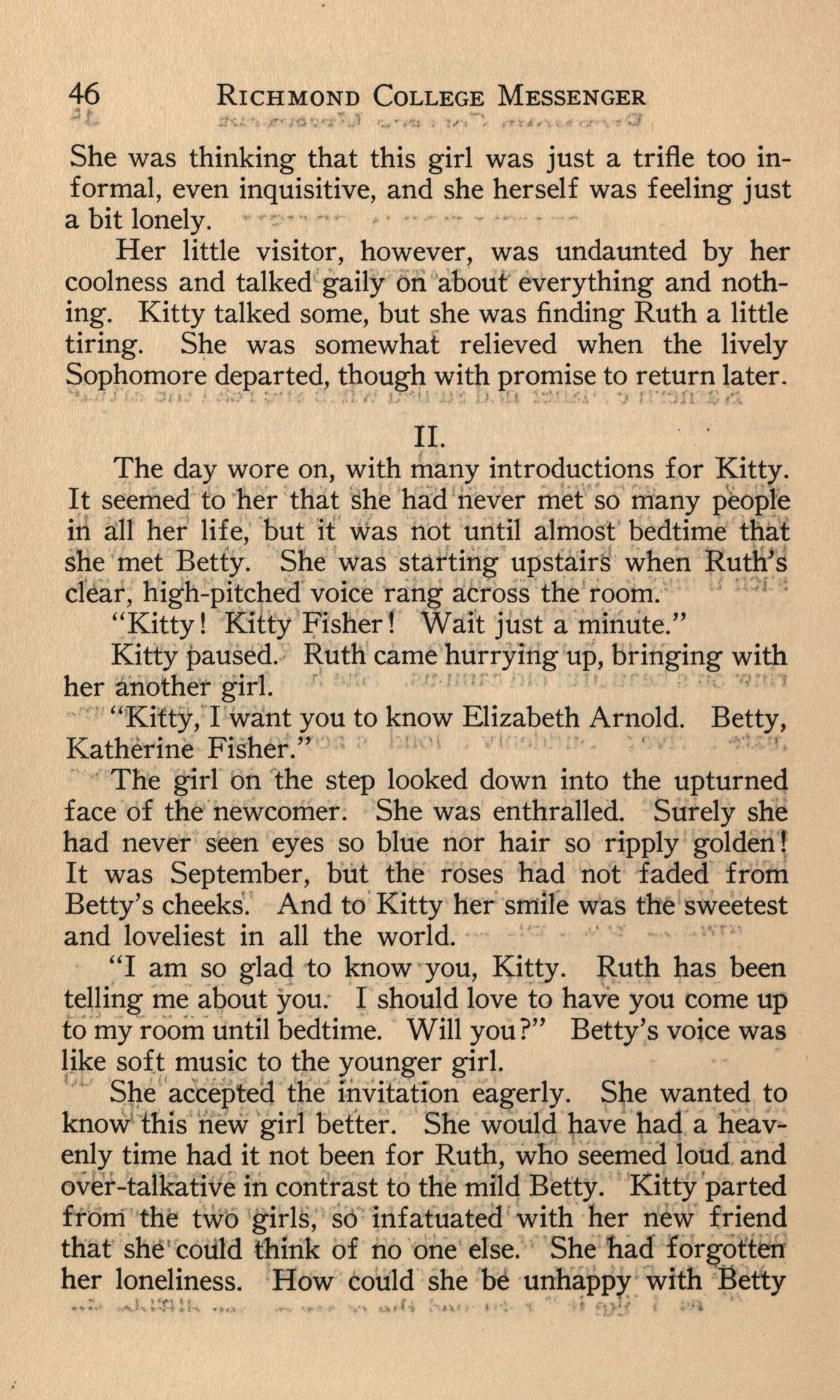
She was thinking that this girl was just a trifle too informal, even inquisitive, and she herself was feeling just a bit lonely.
Her little visitor, however, was undaunted by her coolness and talked ' gaily on ·'about everything and nothing. Kitty talked some, but she was finding Ruth a little tiring. She was somewhat relieved when the lively Sophomore departed, though with promise to return later.
II.
The day wore on, with many introductions for Kitty. It seemed to he'r ' that ·she had never met so many p~ople in all her1 life, but it' ~as not until almost bedtime tliat she met Betty. She was starting upst .airs when Ruth's dear, high-pitched voice rang across the ' room. . ·
"Kitty! Kitty ~isher ! Wait just a n:i,inute."
Kitty paused. ~utl:i' came hurrying up, bringing with her anothet girl. ' : · ,
"Kitty ; I want you to know Elizabeth Arnold. Betty, Katherine Fisher." ' I • \
The girl on ~the step looked down into the upturned face of the ·newcomer. She was enthralled. Surely she had never seen eyes so blue nor hair so ripply golden! It was September, but the roses had not faded from Betty's cheeks'. And to ' Kitty her · smile was the sweetest and loveliest in all the world. · ·
"I am so glaq to know you, Kitty. Ruth has been telling me about you: I should love to have you come up fo ·my rooiii until bedtime. Will you?" Betty's voice was Uke soft music to the younger girl.
·- Sl].e'accepte~ the invitatiori eagerly. S~e wanted to know this new 'girl befter. She would have had a heavenly time had it not been for Ruth, who seemed loud and over-talkative in contrast to the mild Betty. Kitty 'parted ftoni the two girls, soinfatuat .ea with her new friend that she' could think of no one else. She had forgotten her loneliness. How could she be unhapp:r, with Betty ~.
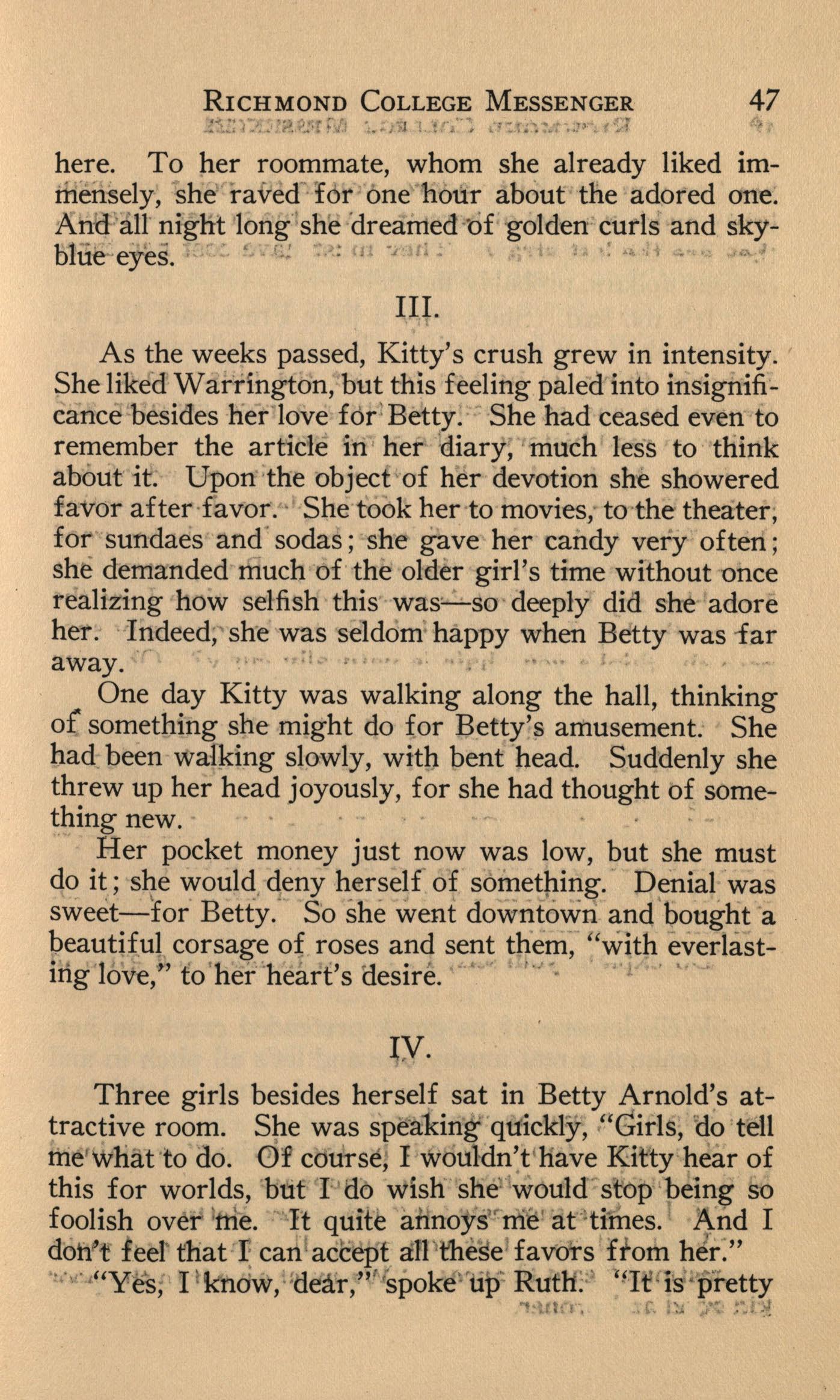
here. To her roommate, whom she already liked imrhensely, she ra ved- for one hour about the adored one. And all night long she 'dreamed ti£ golden curls and skyblue ·eyes. ' ' ' : : ·
III.
As the weeks passed, Kitty's crush grew in intensity. She liked Warrington, but this feeling paled into insignificance besides her love for ·Betty. She had ceased even to remember the article in her diary, ' much less to think about it. Upon the object of her devotion she showered favor after favor. · She took her to movies, tothe theater, for sundaes and · sodas; she gave her candy very often ; she demanded much of the older girl's time without once realizing how selfish this was · -so deeply did she adore her. Indeed, she was seldom happy when Betty was far away.
One day Kitty was walking along the hall, thinking of something she might do for Betty's amusement. She had been walking slowly, with bent head. Suddenly she threw up her head joyously , for she had thought of something new.
Her pocket money just now was low, but she must do it; she would deny herself of sometp.ing. Denial was sweet-tor Betty : So she went downtown and bought a beautiful corsage of roses and sent them, ' 'with everlastirig love," to her heart's tlesire. '· · ·
rv.
Three girls besides herself sat in Betty Arnold's attractive room. She was spea"king quickly, "Girls, cio tell me' what to do. Of course, I wouldn't 1Have Kitty hear of this for worlds, btit I ' tlo wish she' would stop 'being so foolish over me. It quite annoys " rri'e at ·titnes. And I doh~ t feel that I can •accept all ' t'hese favors from h r." '•'. "Yes, I 1know / tlear," '' spoke ·up· Rutli :· lilf-is ·pi·etty t· • ~...
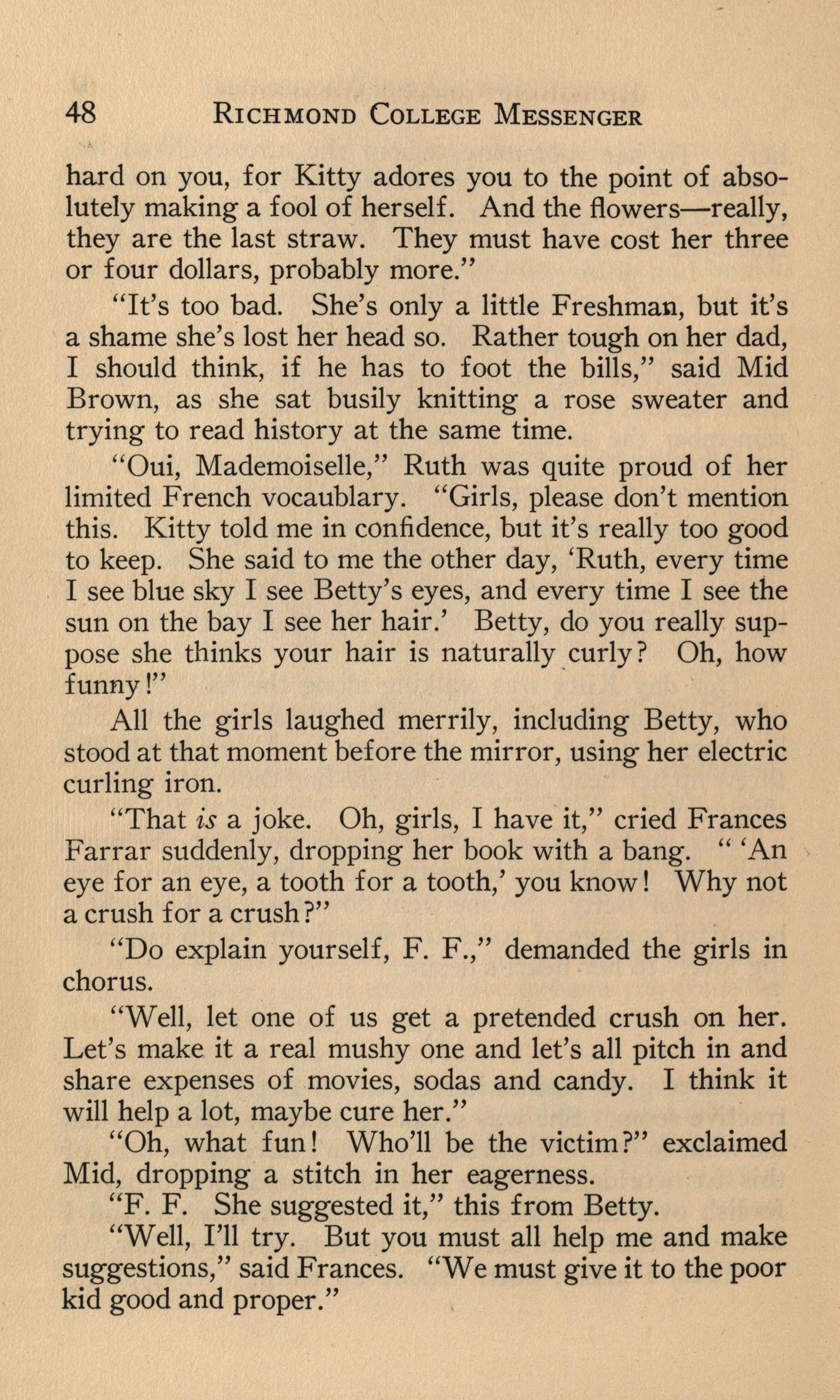
48 RICHMOND COLLEGE MESSENGER
hard on you, for Kitty adores you to the point of absolutely making a fool of herself. And the flowers-really, they are the last straw. They must have cost her three or four dollars, probably more."
"It's too bad. She's only a little Freshman, but it's a shame she's lost her head so. Rather tough on her dad, I should think, if he has to foot the bills," said Mid Brown, as she sat busily knitting a rose sweater and trying to read history at the same time.
"Oui, Mademoiselle," Ruth was quite proud of her limited French vocaublary. "Girls, please don't mention this. Kitty told me in confidence, but it's really too good to keep. She said to me the other day, 'Ruth, every time I see blue sky I see Betty's eyes, and every time I see the sun on the bay I see her hair.' Betty, do you really suppose she thinks your hair is naturally .curly? Oh, how funny!"
All the girls laughed merrily, including Betty, who stood at that moment before the mirror, using her electric curling iron.
"That is a joke. Oh, girls, I have it," cried Frances Farrar suddenly, dropping her book with a bang. "'An eye for an eye, a tooth for a tooth,' you know! Why not a crush for a crush ?"
"Do explain yourself, F. F.," demanded the girls in chorus.
"Well, let one of us get a pretended crush on her. Let's make it a real mushy one and let's all pitch in and share expenses of movies, sodas and candy. I think it will help a lot, maybe cure her."
"Oh, what fun! Who'll be the victim?" exclaimed Mid, dropping a stitch in her eagerness.
"F. F. She suggested it," this from Betty.
"Well, I'll try. But you must all help me and make suggestions," said Frances. "We must give it to the poor kid good and proper."
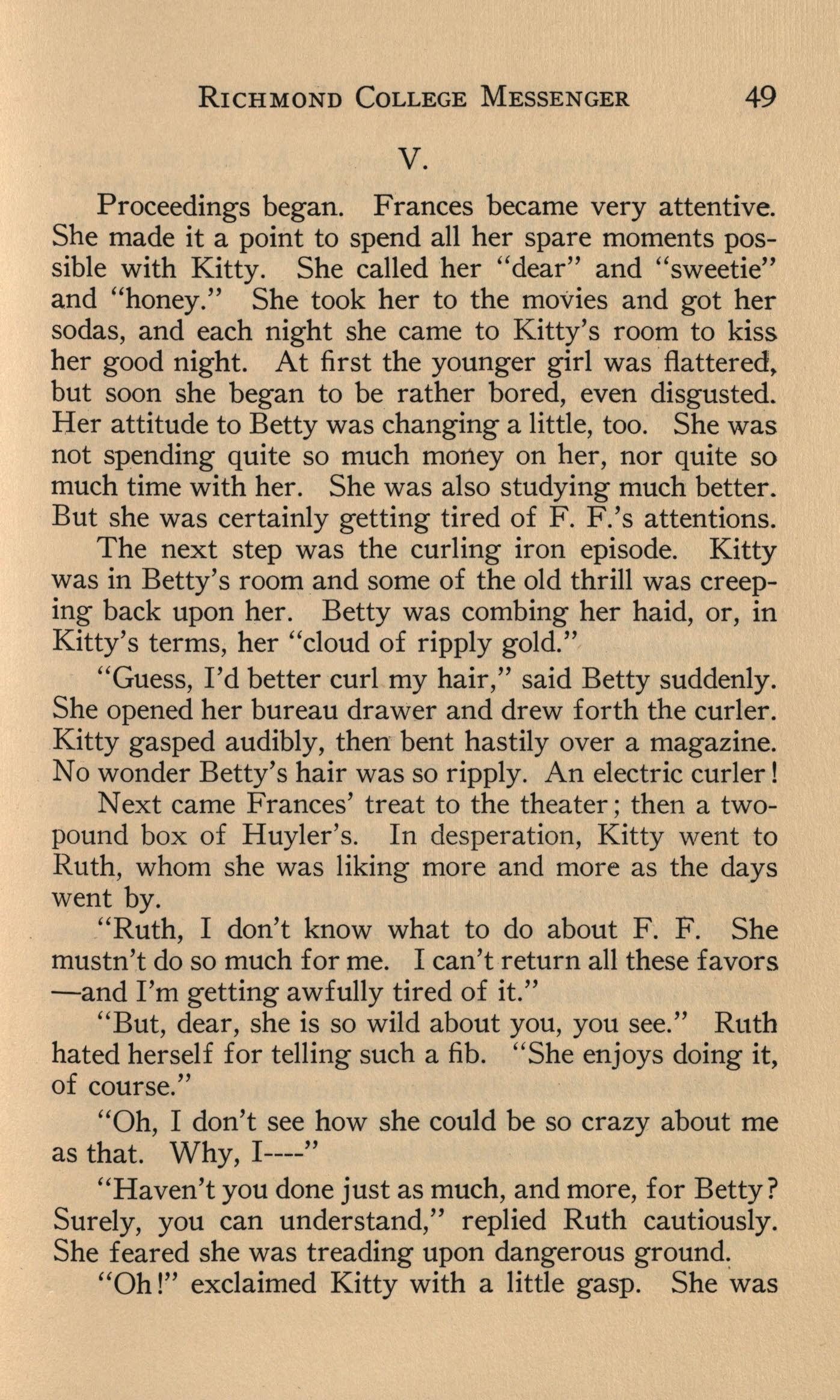
V.
Proceedings began. Frances became very attentive. She made it a point to spend all her spare moments possible with Kitty. She called her "dear" and "sweetie" and "honey." She took her to the movies and got her sodas, and each night she came to Kitty's room to kiss her good night. At first the younger girl was ·flattered, but soon she began to be rather bored, even disgusted. Her attitude to Betty was changing a little, too. She was not spending quite so much money on her, nor quite so much time with her. She was also studying much better. But she was certainly getting tired of F. F.'s attentions.
The next step was the curling iron episode. Kitty was in Betty's room and some of the old thrill was creeping back upon her. Betty was combing her haid, or, in Kitty's terms, her "cloud of ripply gold."
"Guess, I'd better curl my hair," said Betty suddenly. She opened her bureau drawer and drew forth the curler. Kitty gasped audibly, then bent hastily over a magazine. No wonder Betty's hair was so ripply. An electric curler! Next came Frances' treat to the theater; then a twopound box of Huyler's. In desperation, Kitty went to Ruth, whom she was liking more and more as the days went by.
"Ruth, I don't know what to do about F. F. She mustn't do so much for me. I can't return all these favors -and I'm getting awfully tired of it."
"But, dear, she is so wild about you, you see." Ruth hated herself for telling such a fib. "She enjoys doing it, of course.''
"Oh, I don't see how she could be so crazy about me as that. Why, I----"
"Haven't you done just as much, and more, for Betty? Surely, you can understand," replied Ruth cautiously. She feared she was treading upon dangerous ground: "Oh!" exclaimed Kitty with a little gasp. She was
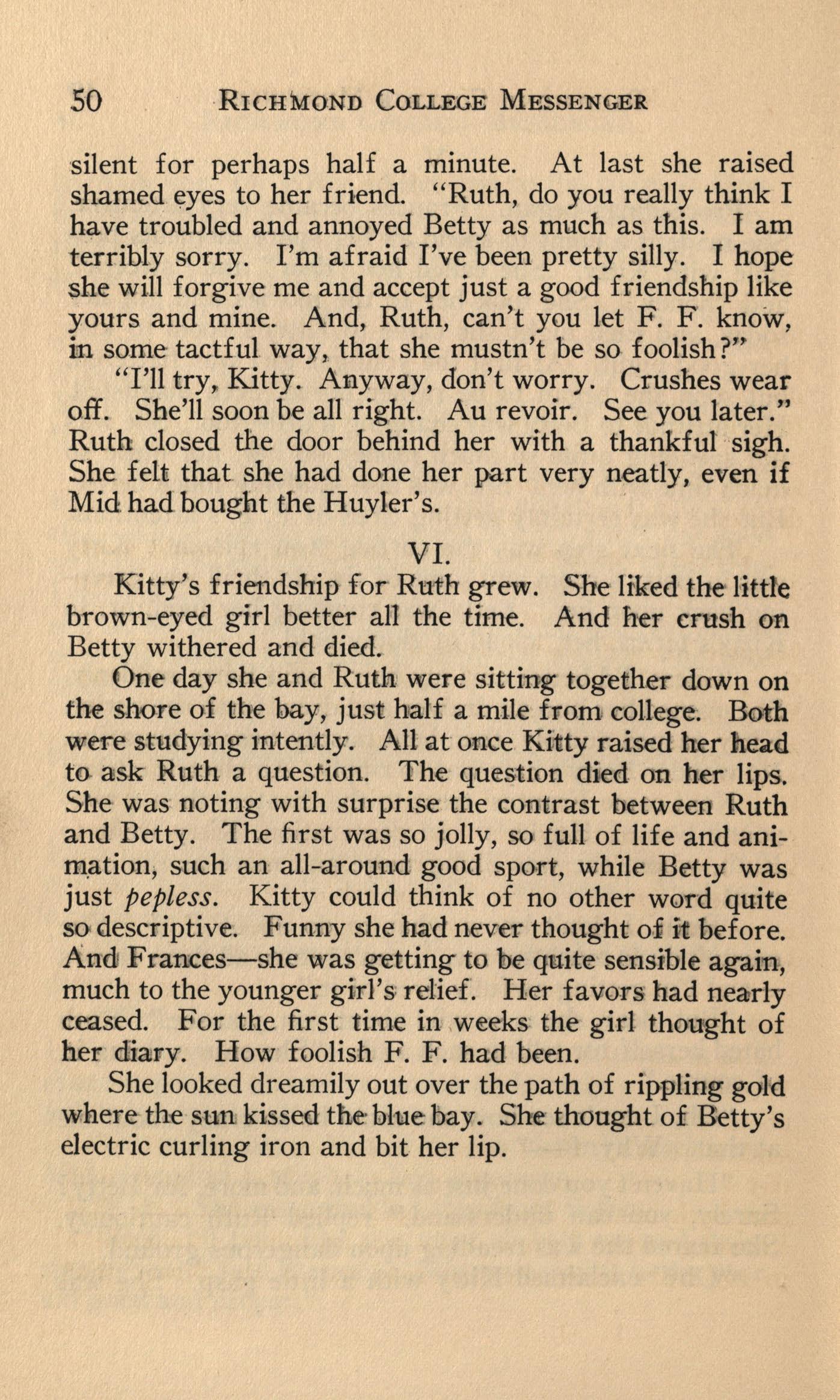
silent for perhaps half a minute . At last she raised shamed eyes to her friend. " Ruth, do you really think I have troubled and annoyed Betty as much as this. I am terribly sorry. I'm afraid I've been pretty silly. I hope she will forgive me and accept just a good friendship like yours and mine. And, Ruth, can't you let F. F. know, in some tactful way, that she mustn't be so foolish?"
"I'll try , Kitty. Anyway, don't worry. Crushes wear off. She'll soon be all right. Au revoir. See you later." Ruth closed the door behind her with a thankful sigh. She felt that she had done her pa.rt very neatly, even if Mid had bought the Huyler's.
VI.
Kitty's friendship for Ruth grew. She liked the little brown-eyed girl better all the time. And her crush on Betty withered and died.
One day she and Ruth were sitting together down on the shore of the bay, just half a mile from college. Both were studying intently. All at Ol'l.CeKitty raised her head to ask Ruth a question. The question died on her lips. She was noting with surprise the contrast between Ruth and Betty. The first was so jolly, so full of life and anim.ation, such an all-around good sport, while Betty was just pepless. Kitty could think of no other word quite so descriptive. Funny she had never thought oi it before. Andi Frances-she was getting to l>equite sensible again, much to the younger girl's , relief. Her favors had nearly ceased. For the first time in weeks the girl thought of her diary. How foolish F. F. had been.
She looked dreamily out over the path of rippling gold where the sun kissed the-blue bay. She thought of Betty's electric curling iron and bit her lip.
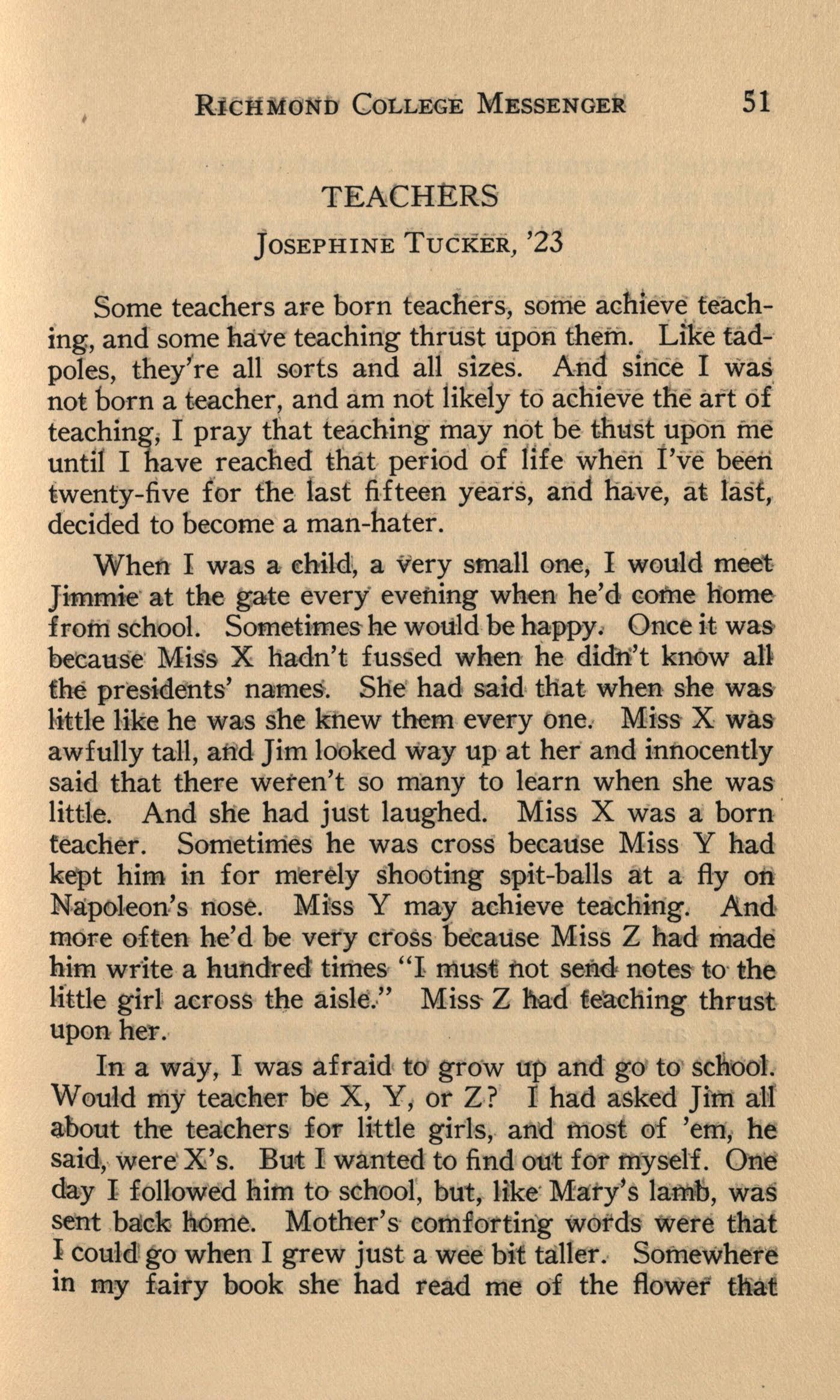
TEACHERS
JOSEPHINE TUCKER, '23
Some teachers aFe born teachers, some aGhieve teaching;, and some have teaching thrust upon them. _ Like tadpoles, they 1 re all sorts and all sizes. Ai:id since I was , not horn a teacher, and am not 1ike1yf6 achieve the art of teaching ; I pray that teaching may not be thust upon ine untif I have reached that period of iHe when 1've been twenty-five for the last fifteen years, and liave, at last, decided to become a man-hater.
When I was a €hild, a very small one, I would meet Jimmie · at the gate every evening when he'd Got'neliomef rofn school. Sometimes he would be happy . Once it was, because · Miss X hadn't fussed when he didti't know aU the presidents' names. Slie had said that when she was, little like he was she khew them every bne ., Miss X was awfully tall, and Jim looked way up at her and innocently said that there weten't so m·any to learn when she was little. And slie had just laughed. Miss X was a born · teacher. Sometimes he was cross because Miss Y had kept him in for merely shooting spit-balls at a fly on Napoleon's nose. Mi'ss Y may achieve teaching. And mo-re of ten he'd be very cr'oss because Miss Z had made him write a hundred' times "I mus 1inot send- notes to ·the Httle girl across the aisle .." Miss Z l\.ad feaeliing thrust upon her.
In a way , I was afraid td grow up and go to scJ\ool. W(mld my teacher be X, Y, or Z? I had asked Jim alf about the teachers for little girls, and most of 'em, he said, were X/ s. :But I wanted to find out for myself. One day I followed him to school, but, like · Mary's lamb, was sent bad~ I!i:ome. Mother's com:for ting words were that l could!go when I grew just a wee bit taller. Somewhere in my fairy book she had read me of the flower that
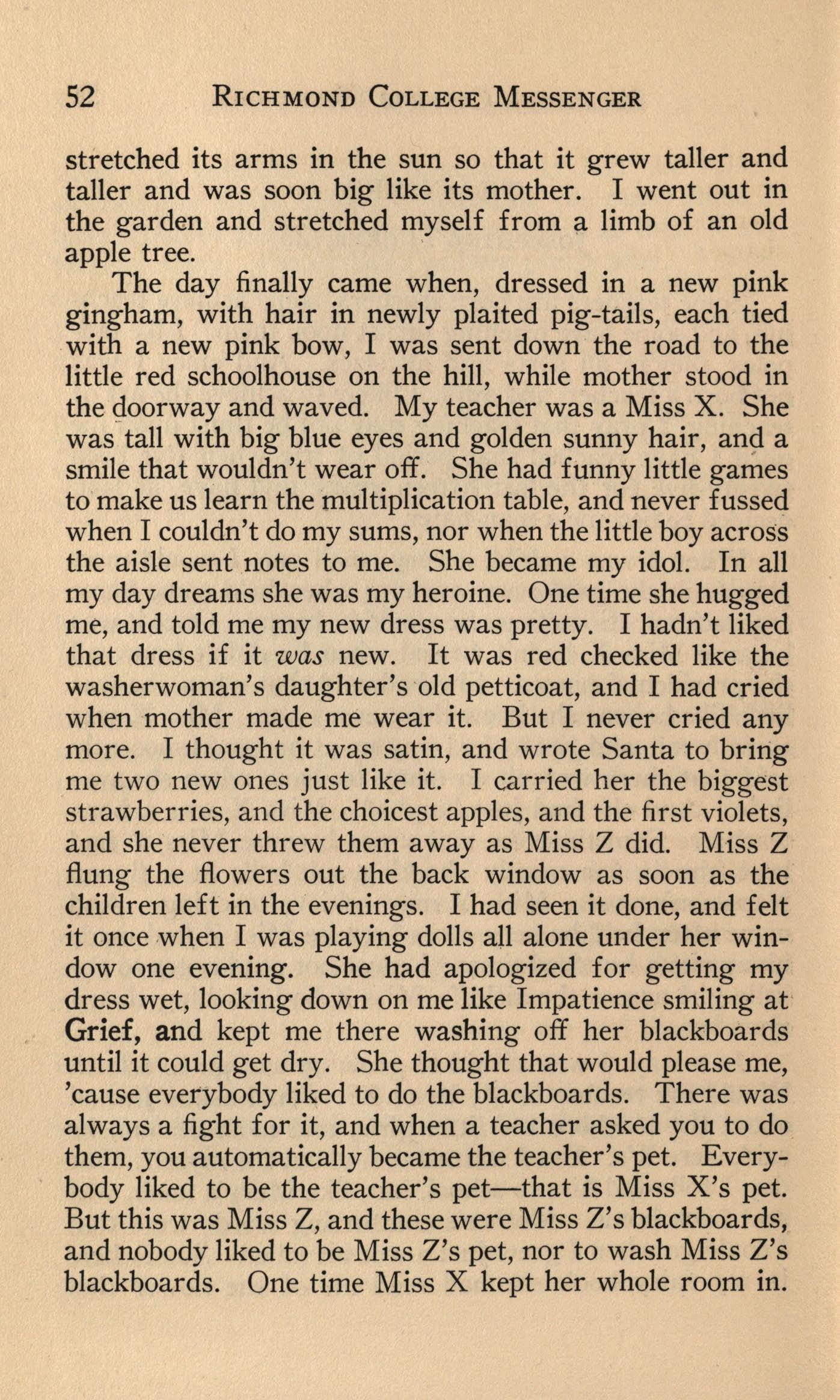
stretched its arms in the sun so that it grew taller and taller and was soon big like its mother. I went out in the garden and stretched myself from limb of an old apple tree.
The day finally came when, dressed in a new pink gingham, with hair in newly plaited pig-tails, each tied with a new pink bow, I was sent down the road to the little red schoolhouse on the hill, while mother stood in the c;loorwayand waved. My teacher was a Miss X. She was tall with big blue eyes and golden sunny hair, an9- a smile that wouldn't wear off. She had funny little games to make us learn the multiplication table, and never fussed when I couldn't do my sums, nor when the little boy across the aisle sent notes to me. She became my idol. In all my day dreams she was my heroine. One time she hugged me, and told me my new dress was pretty. I hadn't liked that dress if it was new. It was red checked like the washerwoman's daughter's old petticoat, and I had cried when mother made me wear it. But I never cried any more. I thought it was satin, and wrote Santa to bring me two new ones just like it. I carried her the biggest strawberries, and the choicest apples, and the first violets, and she never threw them away as Miss Z did. Miss Z flung the flowers out the back window as soon as the children left in the evenings. I had seen it done, and felt it once -when I was playing dolls all alone under her window one evening. She had apologized for getting my dress wet, looking down on me like Impatience smiling at Grief, and kept me there washing off her blackboards until it could get dry. She thought that would please me, 'cause everybody liked to do the blackboards. There was always a fight for it, and when a teacher asked you to do them, you automatically became the teacher's pet. Everybody liked to be the teacher's pet-that is Miss X's pet. But this was Miss Z, and these were Miss Z's blackboards, and nobody liked to be Miss Z's pet, nor to wash Miss Z's blackboards. One time Miss X kept her whole room in.
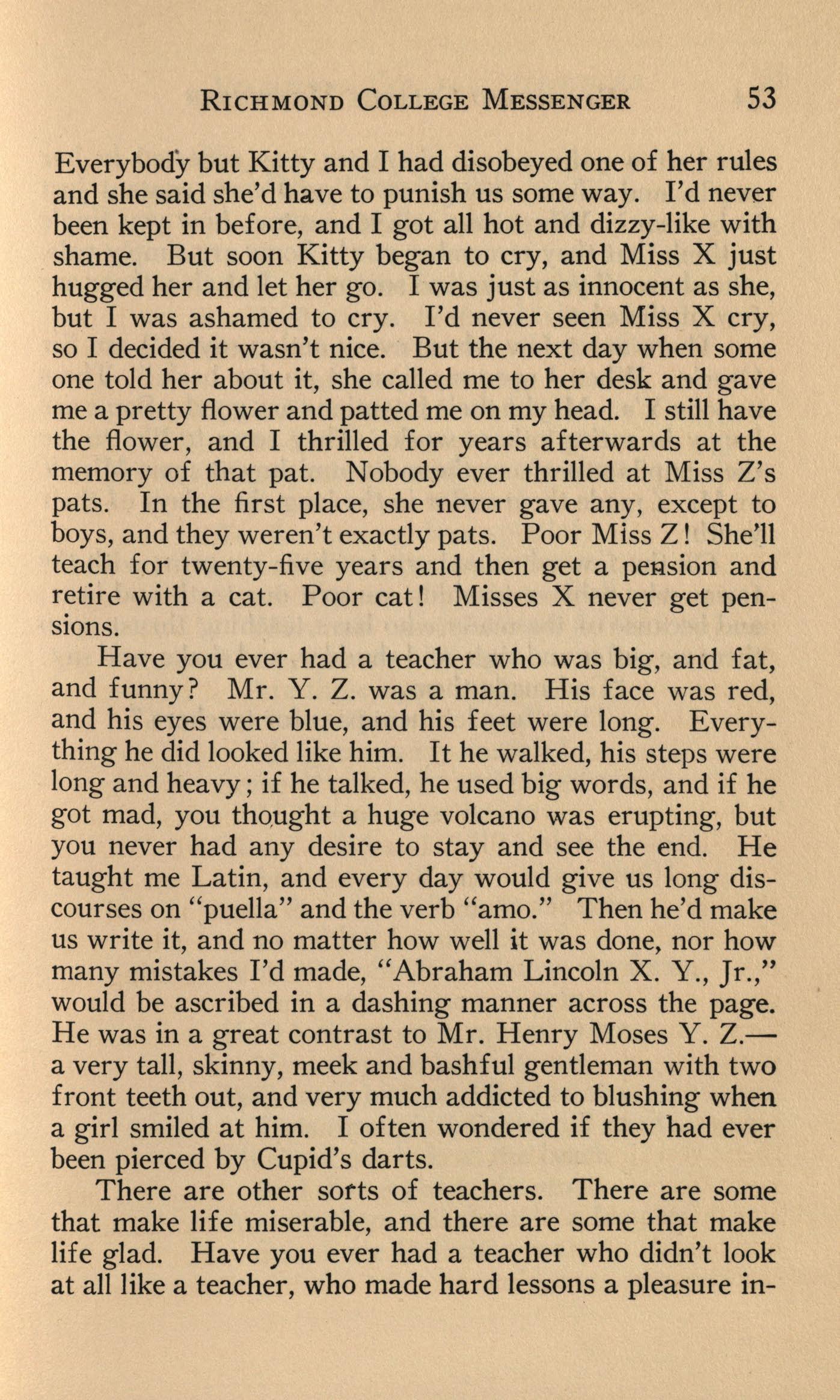
Everybody but Kitty and I had disobeyed one of her rules and she said she'd have to punish us some way. I'd never been kept in before, and I got all hot and dizzy-like with shame. But soon Kitty began to cry, and Miss X just hugged her and let her go. I was just as innocent as she, but I was ashamed to cry. I'd never seen Miss X cry, so I decided it wasn't nice. But the next day when some one told her about it, she called me to her desk and gave me a pretty flower and patted me on my head. I still have the flower, and I thrilled for years afterwards at the memory of that pat. Nobody ever thrilled at Miss Z's pats . In the first place, she never gave any, except to boys, and they weren't exactly pats. Poor Miss Z ! She'll teach for twenty-five years and then get a peRsion and r~tire with a cat. Poor cat! Misses X never get pensions.
Have you ever had a teacher who was big , and fat, and funny? Mr. Y. Z. was a man. His face was red, and his eyes were blue, and his feet were long. Everything he did looked like him. It he walked, his steps were long and heavy; if he talked, he used big words, and if he got mad, you th0,ught a huge volcano was erupting, but you never had any desire to stay and see the end. He taught me Latin, and every day would give us long discourses on "puella" and the verb "amo." Then he'd make us write it, and no matter how well it was done, nor how many mistakes I'd made, "Abraham Lincoln X. Y., Jr.," would be ascribed in a dashing manner across the page. He was in a great contrast to Mr. Henry Moses Y. Z.a very tall, skinny, meek and bashful gentleman with two front teeth out, and very much addicted to blushing when a girl smiled at him. I often wondered if they had ever been pierced by Cupid's darts.
There are other sorts of teachers. There are some that make life miserable, and there are some that make life glad. Have you ever had a teacher who didn't look at all like a teacher, who made hard lessons a pleasure in-
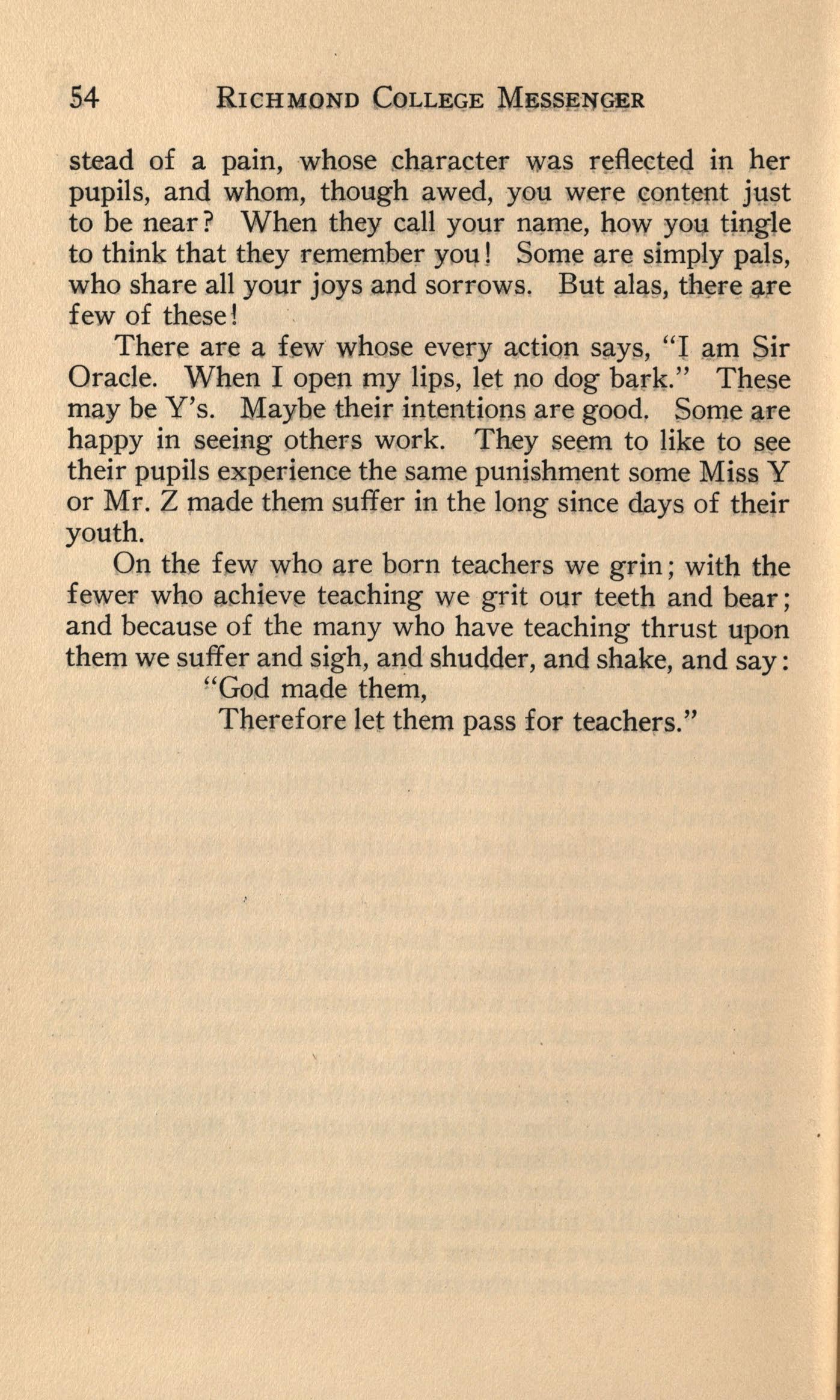
stead of a pain, whose ~haracter was refle~ted in her pupils, and whom, though awed, you were ~onts:mtjust to be near ? When they call your nq.me, hovy you tingle to think that they remember you l Some are simply pals, who share all your joys and sorrows. But alas, th~re ~re few of these!
There are a few whose every action s~ys, "l am Sir Oracle. When I open my lips, let no dog bark." These may be Y's. Maybe their intentions are good. Some are happy in seeing others work. They seem to like to see their pupils experience the same punishment some Miss Y or Mr. Z made them suffer in the long since days of their youth.
On the ftw who are born teachers we grin; with the fewer who a.chieve teaching we grit our teeth and bear; and because of the many who have teaching thrust upon them we suffer and sigh, and shudder, and shake, and say: "God made them, Therefore let them pass for teachers."
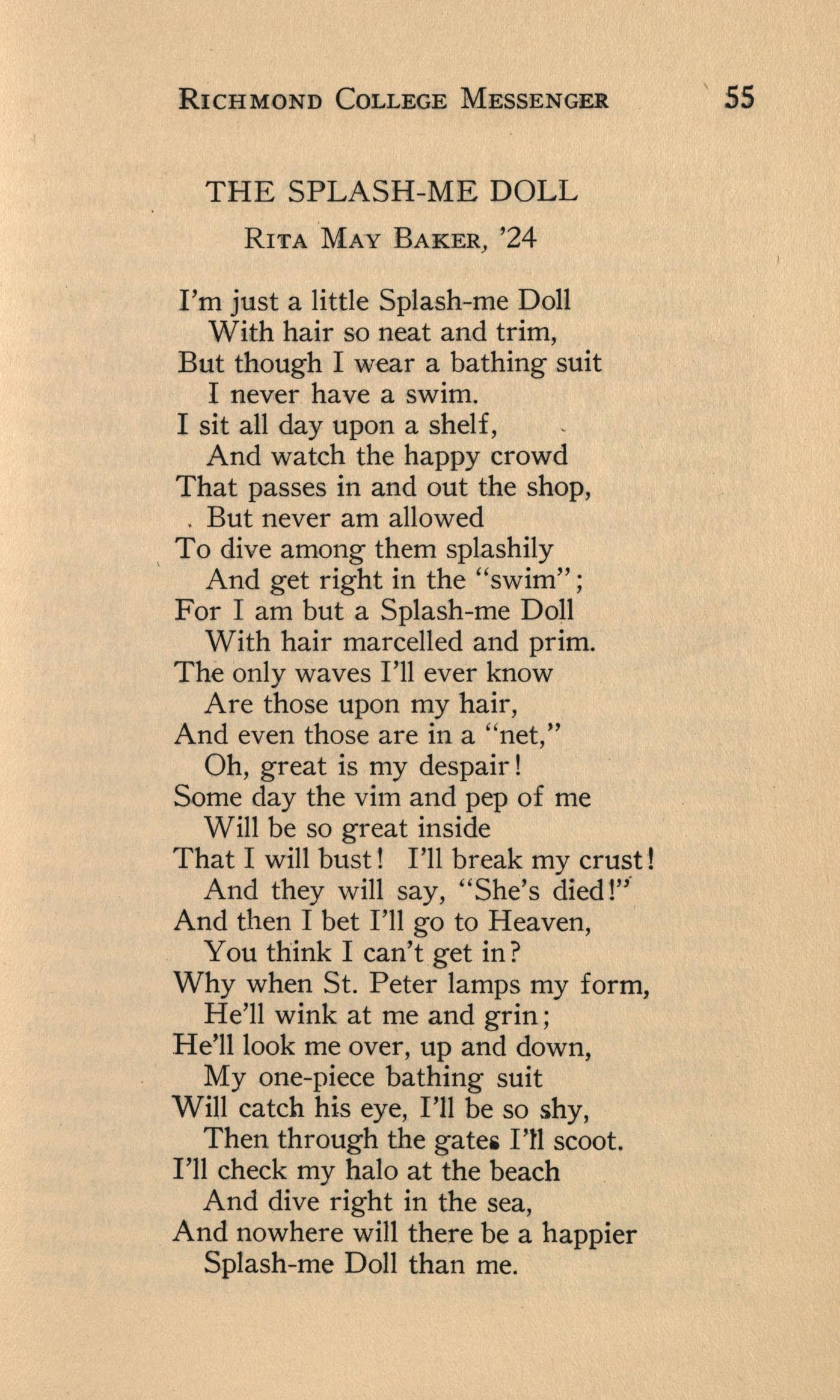
THE SPLASH-ME DOLL
RITA .MA Y BAKER, '24
I'm just a little Splash-me Doll With hair so neat and trim, But though I wear a bathing suit I never have a swim. I sit all day upon a shelf, And watch the happy crowd That passes in and out the shop, . But never am allowed , To dive among them splashily And get right in the "swim"; For I am but a Splash-me DoJl With hair marcelled and prim. The only waves I'll ever know Are those upon my hair, And even those are in a "net," Oh, great is my despair! Some day the vim and pep of me Will be so great inside That I will bust! I'll break my crust! And they will say, "She's died!'' And then I bet I'll go to Heaven, You think I can't get in? Why when St. Peter lamps my form, He'll wink at me and grin; He'll look me over, up and down, My one-piece bathing suit Will catch his eye, I'll be so shy, Then through the gate. I'll scoot. I'll check my halo at the beach And dive right in the sea, And nowhere will there be a happier Splash-me Doll than me.
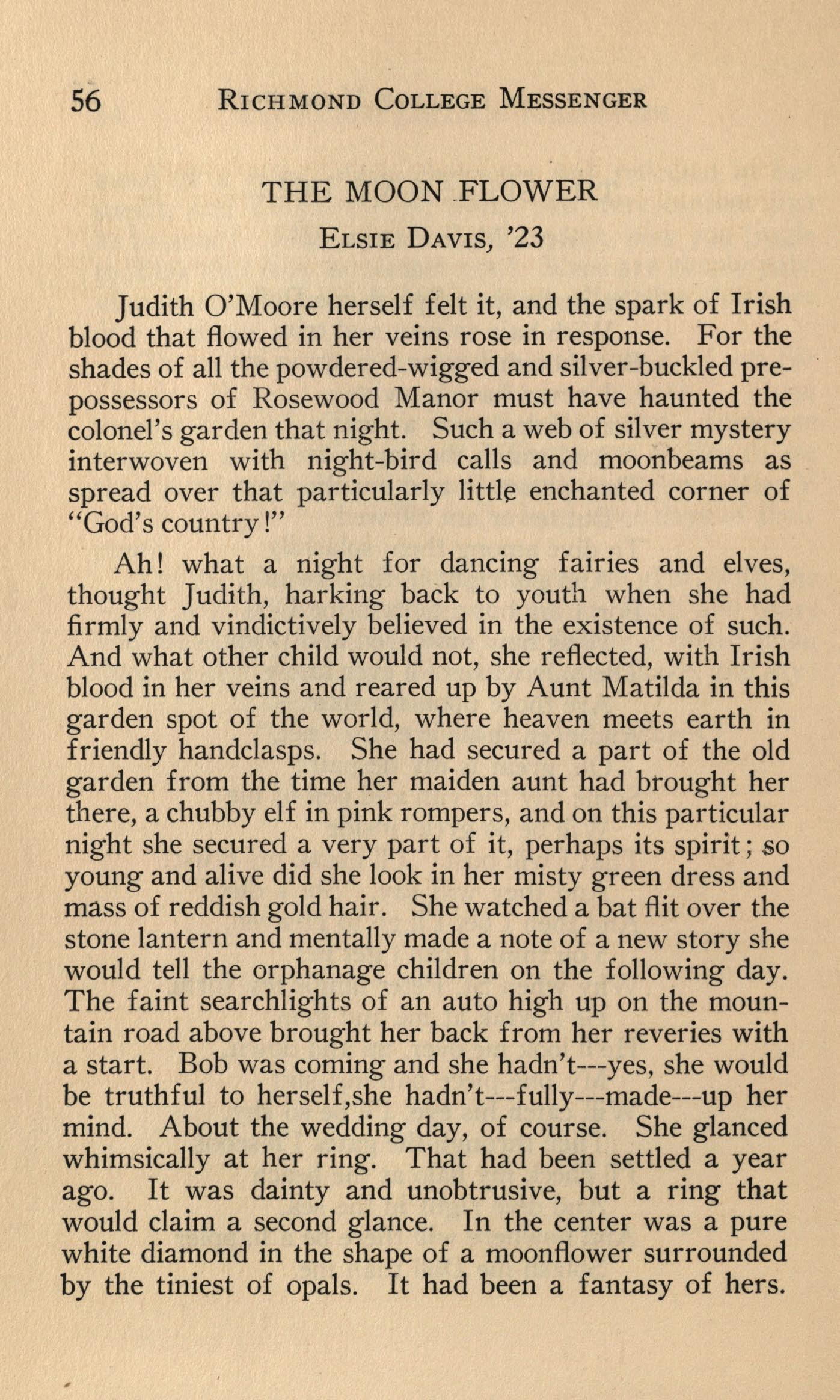
THE MOON FLOWER
ELSIE DAVIS, '23
Judith O'Moore herself felt it, and the spark of Irish blood that flowed in her veins rose in response. For the shades of all the powdered-wigged and silver-buckled prepossessors of Rosewood Manor must have haunted the colonel's garden that night . Such a web of silver mystery interwoven with night-bird calls and moonbeams as spread over that particularly little enchanted corner of "God's country!"
Ah! what a night for dancing fairies and elves, thought Judith, harking back to youth when she had firmly and vindictively believed in the existence of such. And what other child would not, she reflected, with Irish blood in her veins and reared up by Aunt Matilda in this garden spot of the world, where heaven meets earth in friendly handclasps. She had secured a part of the old garden from the time her maiden aunt had btought her there, a chubby elf in pink rompers, and on this particular night she secured a very part of it, perhaps its spirit; so young and alive did she look in her misty green dress and mass of reddish gold hair. She watched a bat flit over the stone lantern and mentally made a note of a new story she would tell the orphanage children on the following day. The faint searchlights of an auto high up on the mountain road above brought her back from her reveries with a start. Bob was coming and she hadn't---yes , she would be truthful to herself ,she hadn't---fully---made---up her mind. About the wedding day, of course . She glanced whimsically at her ring. That had been settled a year ago. It was dainty and unobtrusive, but a ring that would claim a second glance. In the center was a pure white diamond in the shape of a moonflower surrounded by the tiniest of opals. It had been a fantasy of hers.
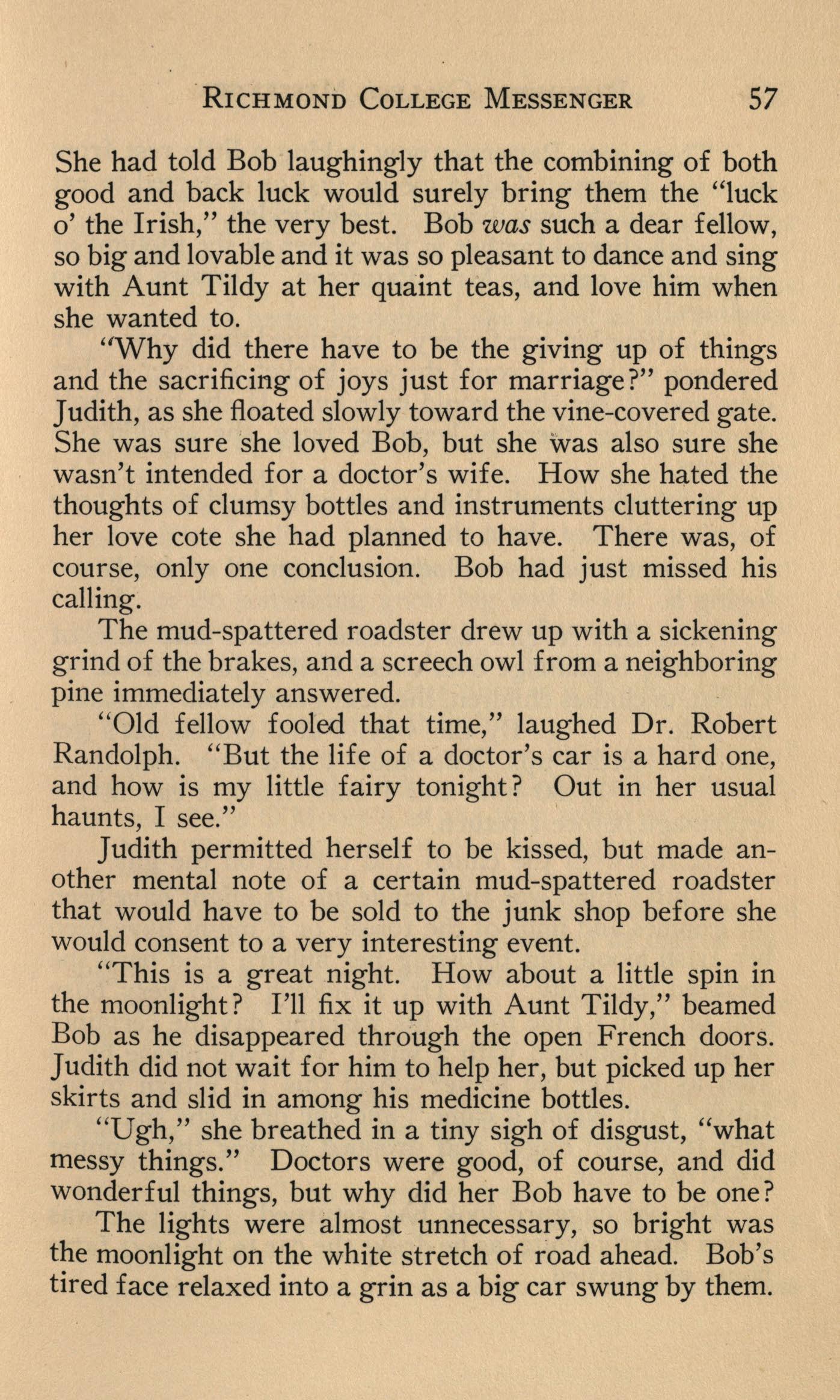
She had told Bob laughingly that the combining of both good and back luck would surely bring them the "luck o' the Irish," the very best. Bob was such a dear fellow, so big and lovable and it was so pleasant to dance and sing with Aunt Tildy at her quaint teas, and love him when she wanted to.
"Why did there have to be the giving up of things and the sacrificing of joys just for marriage?" pondered Judith, as she floated slowly toward the vine-covered gate. She was sure she loved Bob, but she was also sure she wasn't intended for a doctor's wife. How she hated the thoughts of clumsy bottles and instruments cluttering up her love cote she had planned to have. There was, of course, only one conclusion. Bob had just missed his calling.
The mud-spattered roadster drew up with a sickening grind of the brakes, and a screech owl from a neighboring pine immediately answered.
"Old fellow fooled that time," laughed Dr. Robert Randolph. "But the life of a doctor's car is a hard one, and how is my little fairy tonight? Out in her usual haunts, I see."
Judith permitted herself to be kissed, but made another mental note of a certain mud-spattered roadster that would have to be sold to the junk shop before she would consent to a very interesting event.
"This is a great night. How about a little spin in the moonlight? I'll fix it up with Aunt Tildy," beamed Bob as he disappeared through the open French doors. Judith did not wait for him to help her, but picked up her skirts and slid in among his medicine bottles.
"Ugh," she breathed in a tiny sigh of disgust, "what messy things." Doctors were good, of course, and did wonderful things, but why did her Bob have to be one?
The lights were almost unnecessary, so bright was the moonlight on the white stretch of road ahead. Bob's tired face relaxed into a grin as a big car swung by them.
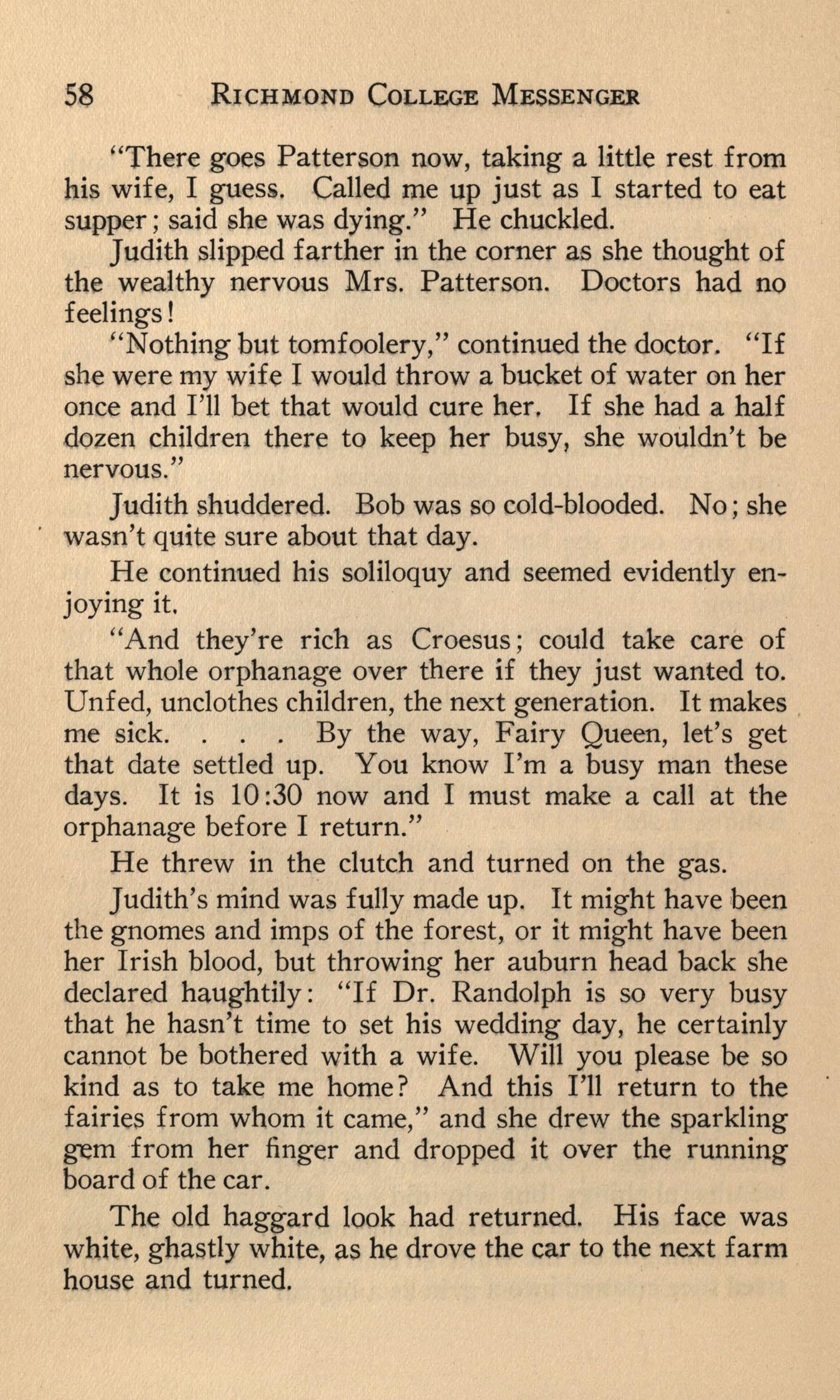
"There goes Patterson now, taking a little rest from his wife, I guess. Called me up just as I started to eat supper; said she w.as dying." He chuckled. Judith slipped farther in the corner as she thought of the weaithy nervous Mrs. Patterson. Doctors had no feelings!
"Nothing but tomfoolery," continued the doctor. "If she were my wife I would throw a bucket of water on her once and I'll bet that would cure her. If she had a half dozen children there to keep her busy, she wouldn't be nervous."
Judith shuddered. Bob was so cold-blooded. No; she wasn't quite sure about that day.
He continued his soliloquy and seemed evidently enjoying it.
"And they're rich as Croesus; could take care of that whole orphanage over there if they just wanted to. Unfed, unclothes children, the next generation. It makes me sick. By the way, Fairy Queen, let's get that date settled up. You know I'm a busy man these days. It is 10 :30 now and I must make a call at the orphanage before I return."
He threw in the clutch and turned on the gas.
Judith's mind was fully made up. It might have been the gnomes and imps of the forest, or it might have been her Irish blood, but throwing her auburn head back she declared haughtily: "If Dr. Randolph is so very busy that he hasn't time to set his wedding day, he certainly cannot be bothered with a wife. Will you please be so kind as to take me home? And this I'll return to the fairies from whom it came," and she drew the sparkling ~m from her finger and dropped it over the running board of the car.
The old haggard look had returned. His face was white, ghastly white, as he drove the car to the next farm house and turned.
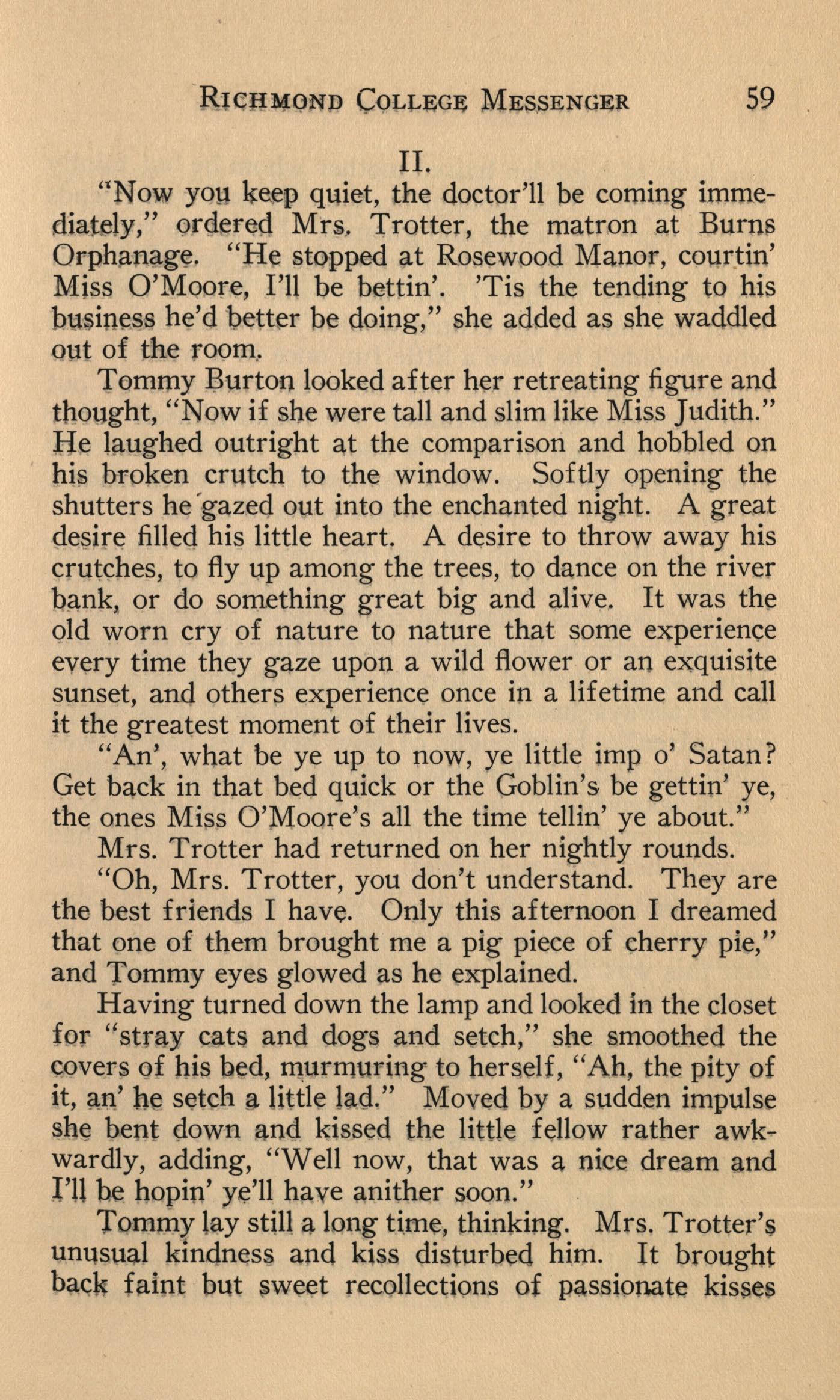
IL
"Now you ke.ep q~iet, the doctor'll be coming immediattly," order~d Mrs, Trotter, the matron at Burns Orph;i.page. "He stqpped at Rosewood Manor, courtin' Miss O'Moore, I'll be bettin'. 'Tis the tending to his J:msin~sshe'd better be doing," she added as she waddled out of the room_.
Tommy Burton looked after he.r retreating figure and thotJght, "Now if she were tall and slim like Miss Judith." He laughed outright at the comparison and hobbled on his broken crutch to the window. Softly op,ening the shutters he 'gazed out into the enchanted night. A great desire filled his little heart. A desire to throw away his crutches, to fly up among the trees, to dance on the river bank~ or do something great big and alive. It was the old worn cry of nature to nature that some experience every time they gaze upon a wild flower or an exquisite sunset, and others experience once in a lifetime and call it the greatest moment of their lives.
"An', what be ye up to now, ye little imp o' Satan? Get back in that bed quick or the Goblin's be gettin' ye, the ones Miss O'Moore's all the time tellin' ye about."
Mrs. Trotter had returned on her nightly rounds.
"Oh, Mrs. Trotter, you don't understand. They are the best friends I have. Only this afternoon I dreamed that one of them brought me a pig piece of cherry pie," and Tommy eyes glowed as he explained.
Having turned down the lamp and looked in the closet for "str~y cats and dogs and setch," she smoothed the covers of his bed, ~urmuring to herself, "Ah, the pity of it, a11'h~ st;Jtchg little la.d."
Moved by a sudden impulse she bent down and kissed the little fellow rather awkwardly, adding, "Well now, that was a nice dream and l'U be hopin' ye'll have anither soon."
Tommy lay still <1,long time, thinking. Mrs. Trotter's un4suq.l kindness and kiss disturbed him. It brought back faint but fiweet recollections of passionate kisses
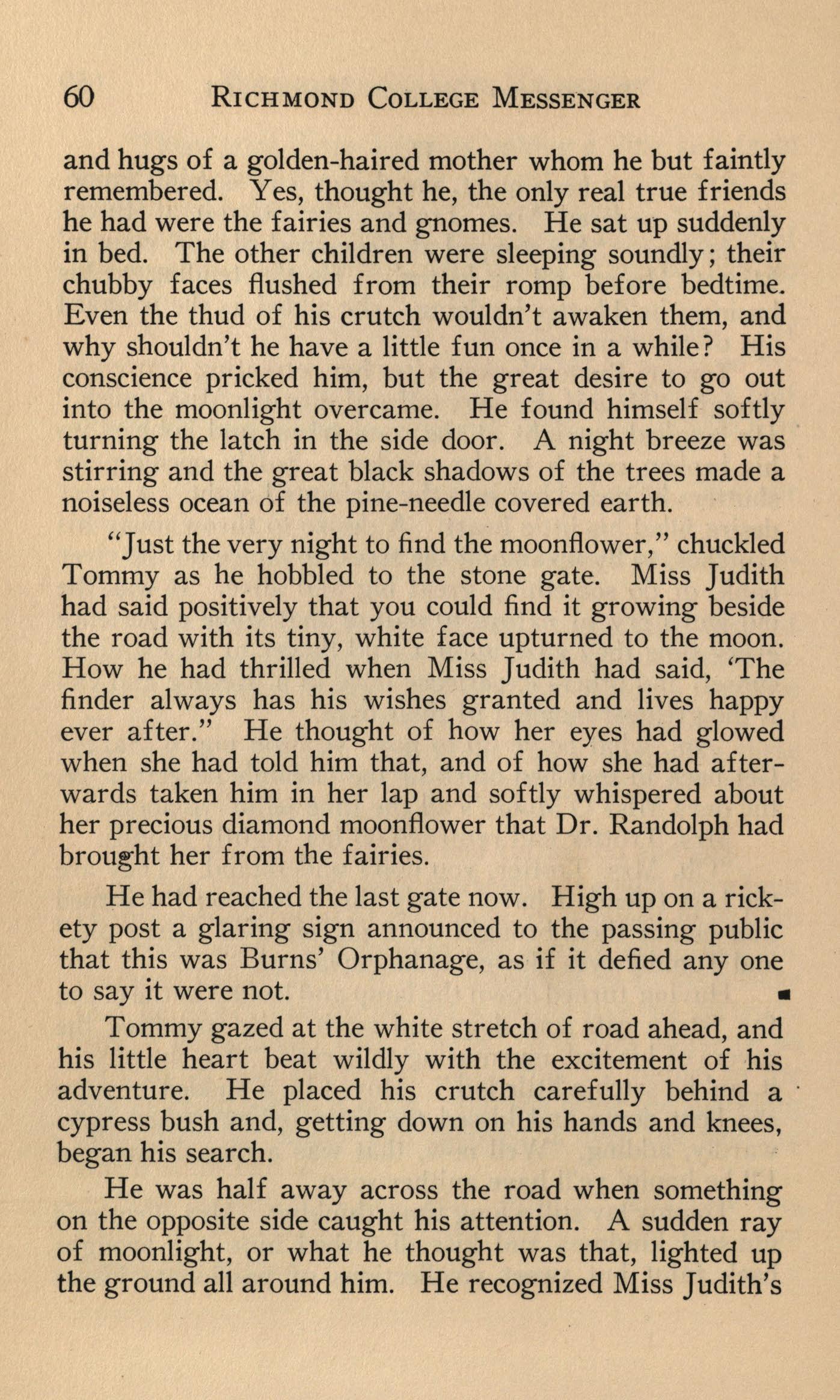
and hugs of a golden-haired mother whom he but faintly remembered. Yes, thought he, the only real true friends he had were the fairies and gnomes. He sat up suddenly in bed. The other children were sleeping soundly; their chubby faces flushed from their romp before bedtime. Even the thud of his crutch wouldn't awaken them, and why shouldn't he have a little fun once in a while? His conscience pricked him, but the great desire to go out into the moonlight overcame. He found himself softly turning the latch in the side door. A night breeze was stirring and the great black shadows of the trees made a noiseless ocean of the pine-needle covered earth.
"Just the very night to find the moonflower," chuckled Tommy as he hobbled to the stone gate. Miss Judith had said positively that you could find it growing beside the road with its tiny, white face upturned to the moon. How he had thrilled when Miss Judith had said, 'The finder always has his wishes granted and lives happy ever after." He thought of how her eyes had glowed when she had told him that, and of how she had afterwards taken him in her lap and softly whispered about her precious diamond moonflower that Dr. Randolph had brought her from the fairies.
He had reached the last gate now. High up on a rickety post a glaring sign announced to the passing public that this was Burns' Orphanage, as if it defied any one to say it were not. •
Tommy gazed at the white stretch of road ahead, and his little heart beat wildly with the excitement of his adventure. He placed his crutch carefully behind a · cypress bush and, getting down on his hands and knees, began his search.
He was half away across the road when something on the opposite side caught his attention. A sudden ray of moonlight, or what he thought was that, lighted up the ground all around him. He recognized Miss Judith's
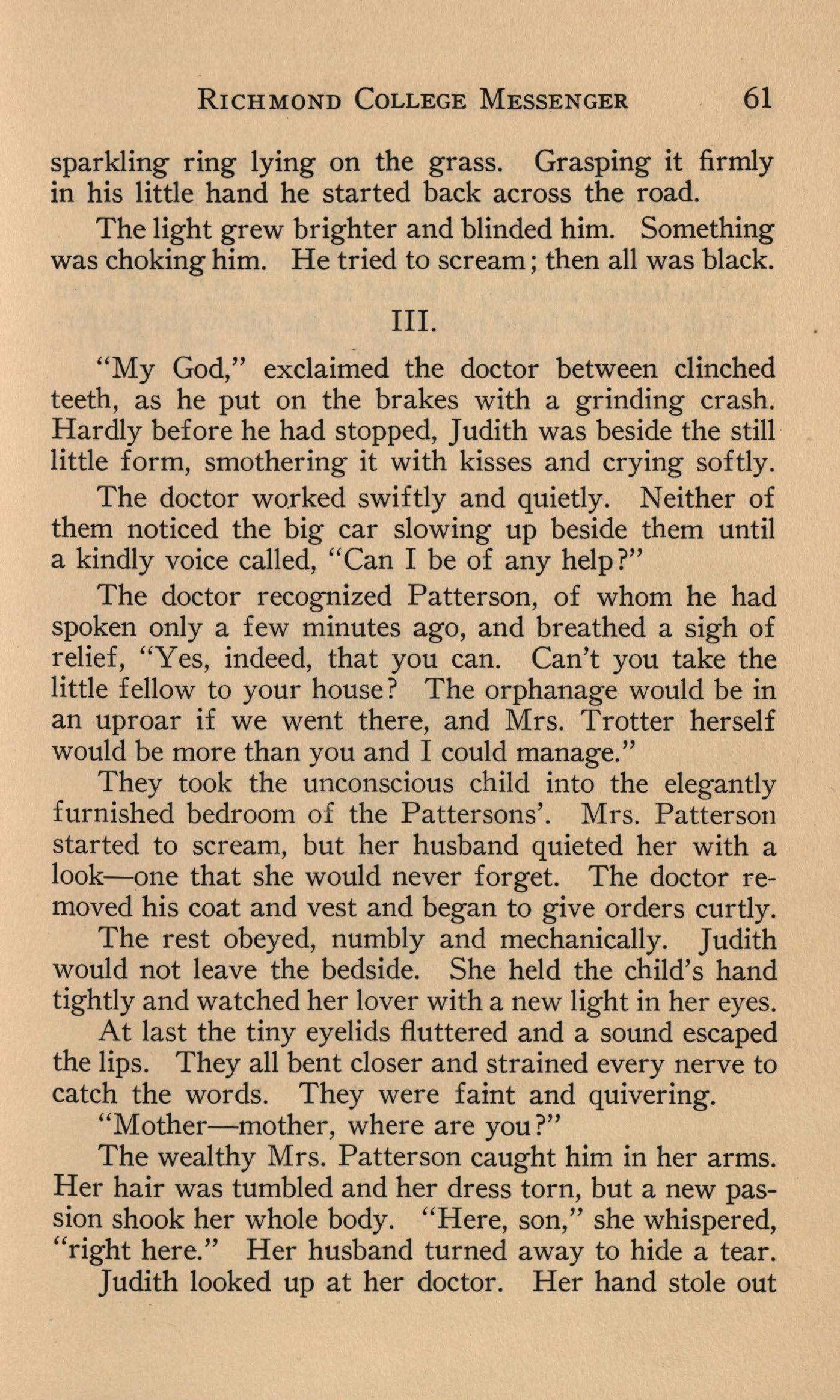
sparkling ring lying on the grass. Grasping it firmly in his little hand he started back across the road.
The light grew brighter and blinded him. Something was choking him. He tried to scream; then all was black. III.
"My God," exclaimed the doctor between clinched teeth, as he put on the brakes with a grinding crash. Hardly before he had stopped, Judith was beside the still little form, smothering it with kisses and crying softly.
The doctor worked swiftly and quietly. Neither of them noticed the big car slowing up beside them until a kindly voice called, "Can I be of any help?"
The doctor recognized Patterson, of whom he had spoken only a few minutes ago, and breathed a sigh of relief, "Yes, indeed, that you can. Can't you take the little fellow to your house? The orphanage would be in an uproar if we went there, and Mrs. Trotter herself would be more than you and I could manage."
They took the unconscious child into the elegantly furnished bedroom of the Pattersons'. Mrs. Patterson started to scream, but her husband quieted her with a look-one that she would never forget. The doctor removed his coat and vest and began to give orders curtly.
The rest obeyed, numbly and mechanically. Judith would not leave the bedside. She held the child's hand tightly and watched her lover with a new light in her eyes.
At last the tiny eyelids fluttered and a sound escaped the lips. They all bent closer and strained every nerve to catch the words. They were faint and quivering.
"Mother-mother, where are you?"
The wealthy Mrs. Patterson caught him in her arms. Her hair was tumbled and her dress torn, but a new passion shook her whole body. "Here, son," she whispered, "right here." Her husband turned away to hide a tear. Judith looked up at her doctor. Her hand stole out
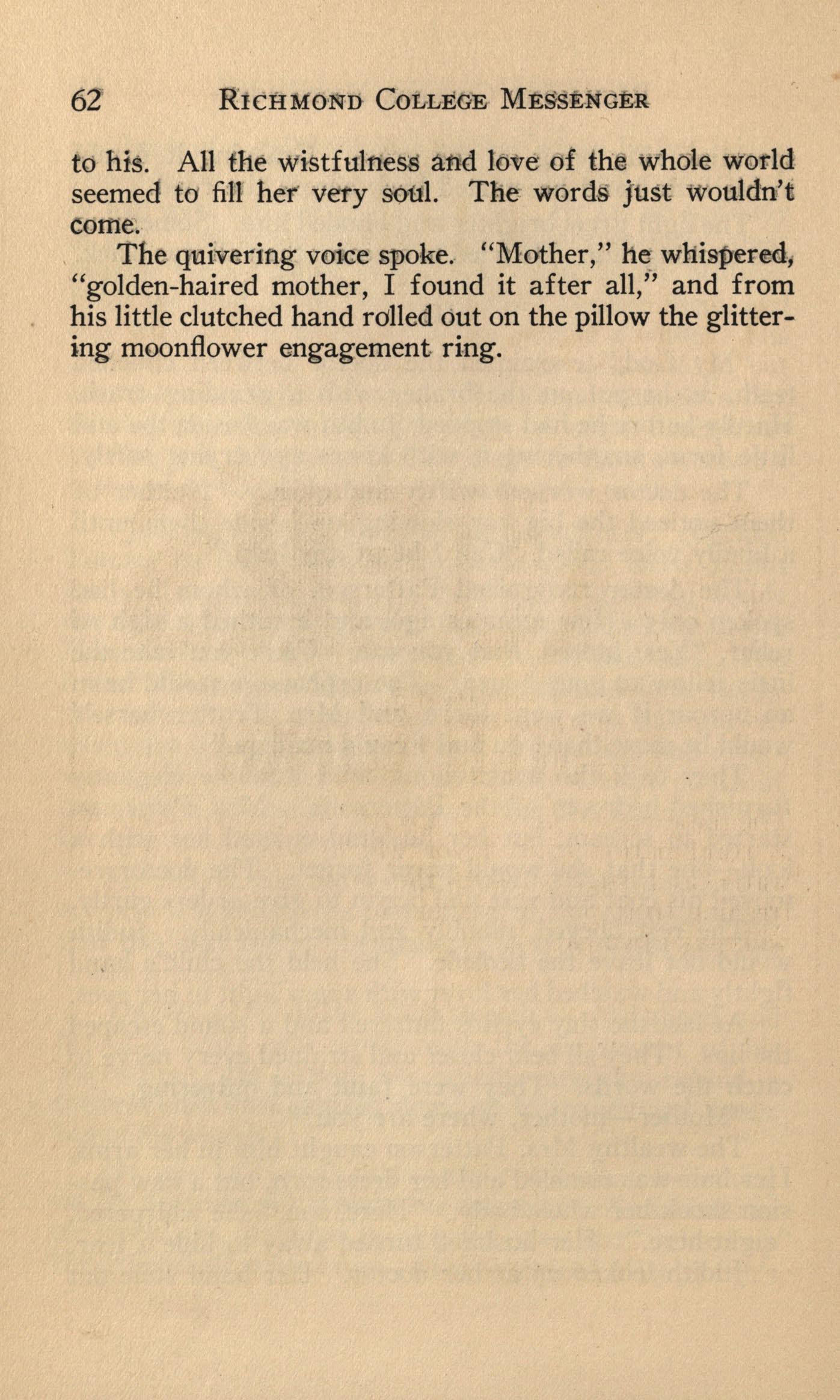
62 RICHMOND COLLEGE MESSENGER
to his. All the wistfulness and love of tho whole world seemed tO' fill het very sotil. The words just wouldn't come.
The quivering voice spoke. "Mother," he whispered, "golden-haired mother, I found it after all/' and from his little clutched hand rdlled out on the pillow the glittering moonflower engagement ring.
